Recognition
College of Fellows
Fellowship in the Canadian Institute of Planners is the highest honour the Institute can bestow upon a planner. This distinction recognizes excellence, identifies prominent role models, promotes advances in planning practice and draws leaders to the forefront of planning in Canada. Such professional attainment and experience must be significant at a national or international planning level.
Fellows proudly use the designation FCIP to denote Fellow of the Canadian Institute of Planners.
We are now accepting nominations for our 2026 Honours and Awards program.
Deadline: January 27, 2026, 11:59 p.m. PT

Imagining Canada in 2100
A Bold Vision for Planning’s Role in Achieving Sustainable Prosperity
Looking ahead to the year 2100, this report prepared by the College of Fellows, outlines a once in a generation opportunity for the Canadian Institute of Planners and its members to refresh and elevate the role of planning in Canada.
To this end, a key purpose of this report is to ask that the Canadian Institute of Planners lead the profession in collaborating with government, business leaders and other key institutions to formulate and implement policies to grow Canada’s population in ways that equitably respond to the needs of current citizens and newcomers, as well as future generations, by planning for a Canada that is economically, socially and environmentally sustainable for all.
(D) deceased
Our Fellows
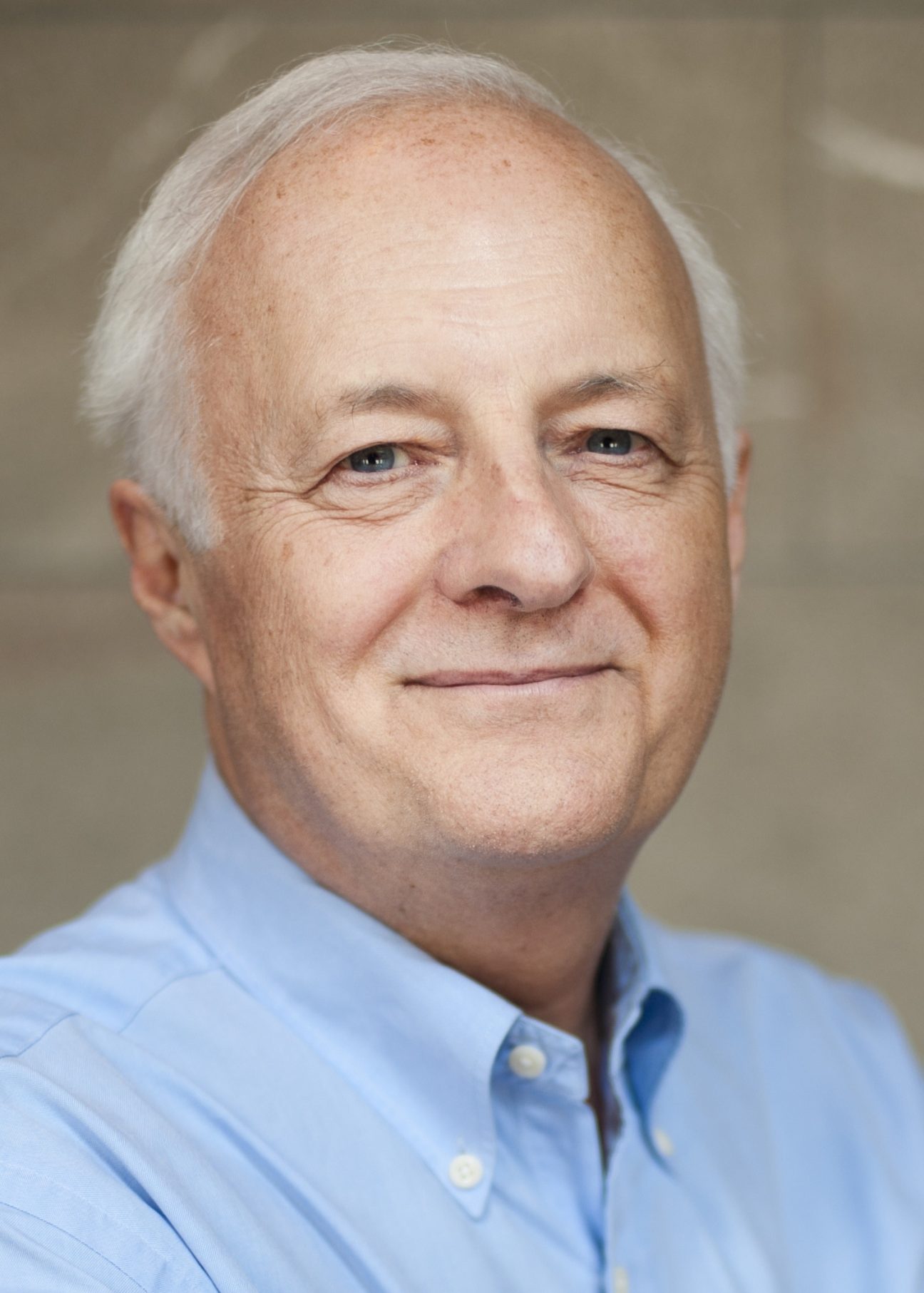

Clément Demers urbaniste émérite, FCIP is an architect (OAQ, FIRAC), urban planner (OUQ, CIP), project manager (Governor of PMI-Montréal), honorary professor and accredited mediator (IMAQ, IAMC). He has pursued parallel careers in a variety of fields and has often been involved on a voluntary basis, making a significant contribution to the planning profession. His diverse experiences have shaped a unique transdisciplinary practice, enabling him to hone innovative approaches to the realization of high-impact urban and cultural projects. The projects realized under his direction are lasting legacies, from the enhancement of Old Montreal to the Quartier international de Montréal and the Quartier des spectacles de Montréal. He has lectured around the world and contributed to over a hundred organizations and expert committees, some of which he has chaired, such as the NCC’s ACPDR and the City of Westmount’s PAC.
Clément was named an Officer of the Ordre national du Québec in June 2023 for his outstanding contribution to architecture, urban planning, design and urban project management.


Eleanor Mohammed is a renowned Registered Professional Planner with over 20 years of transformative impact across the public-, private- and not-for-profit-sectors in Canada and internationally. She is a Partner at DIALOG, specializing in urban governance and land use planning. She is also the Chair of the UN-HABITAT Professionals Forum and a Board Director for Canada’s National Capital Commission.
A former President of the Commonwealth Association of Planners, Canadian Institute of Planners, and Alberta Professional Planners Institute, she has spearheaded diverse projects, from sustainable development advocacy and professional capacity development to multilateral international engagement. Eleanor has the distinction of being the longest-serving female President of the CIP and was responsible for leading a major rebuild of the Institute between 2016 and 2020. Since 2021, she has been an inspiring speaker for the CIP Emerging Leaders Program, kicking off each cohort with the exploration of ‘What is a Leader?’.
Eleanor has held senior executive municipal positions in eastern and western Canada, which has provided her with a Canada-wide perspective and approach to city-building and land use. Her expertise spans legal instruments, city-wide plans, strategic plans, and innovative projects, such as leading the City of Beaumont’s autonomous shuttle initiative – a first of its kind in Canada. She was also recognized on the Royal Town Planning Institute’s (U.K.) International Women of Influence list. Eleanor’s dedication to community service and the profession is evident in her work, her authentic relationships, and the lasting positive impact she has on the Planners and communities she works with.


Emilie K Adin is a trailblazer with 25 years of experience in various leadership roles, including Deputy Director of Planning in Langford, Director of Community Services in North Vancouver City, and Director of Climate Action, Planning + Development in New Westminster. She has also served as a dedicated educator, including in the role of Adjunct Professor at the School of Community and Regional Planning at UBC since 2018. Throughout her career, Emilie has demonstrated mastery in planning principles and has implemented impactful initiatives that have benefitted communities across Canada. She has garnered or shared in over 20 professional awards, including several national honors, for her leadership in areas such as housing, development, and green buildings. Emilie is also an avid volunteer and mentor, and has published insightful articles on mentorship. Her prolific writing includes dozens of publications, including her popular “PlanGirl Travels” series and her upcoming book “The Urban Curious Guide to Europe.” Currently serving as President of the Planning Institute of BC, Emilie continues to inspire and shape the future of planning through her dedication to the profession and her leadership.


Lindsay Chase is an accomplished local government planner, mentor and leader in the profession. For over two decades, she has dedicated countless hours volunteering with PIBC, CIP, and the Professional Standards Board, significantly advancing the profession through the Planning for the Future (PFF) Project. Lindsay played a key role in establishing new national standards for planners and accrediting university programs, ensuring the success of these initiatives through collaboration with ACUPP and CIP. She also contributed leadership to stabilize CIP during a challenging period.
In her professional practice she is passionate advocate for a career in the public sector, and has devoted her career to local government practice. Lindsay is currently the Director of Planning at the District of Saanich leading a diverse team of professionals as Saanich grows its urban areas while continuing to protect rural lands. She previously worked with the Town of View Royal, the City of Victoria, and the Regional District of Nanaimo.
As a professor at Vancouver Island University, Lindsay integrates her extensive professional experience into teaching, mentoring students in the Master of Community Planning program at VIU for over 10 years. Her doctoral research also reflects her commitment to the profession, particularly in governance, ethics, and professional practice. In addition to her academic work, Lindsay actively contributes to professional development as a frequent conference presenter. She continues to serve the profession as a volunteer with the PIBC Professional Conduct Review Committee, ensuring the planning profession remains strong.


Dr. Pamela Robinson, PhD, RPP, FCIP is a Professor and Graduate Program Director at the School of Urban and Regional Planning at Toronto Metropolitan University (TMU) and the Academic Director of City Building TMU. With over 30 years of experience, Pamela has significantly advanced the planning profession through her work as a practitioner, academic, and mentor. She has provided strategic advice on sustainable development, smart cities, and civic technology, influencing policy and planning frameworks at all levels of government. Pamela is recognized as a leading expert in climate change, urban sustainability, smart cities, open data, AI, and governance. Her current research explores questions around AI governance and smart cities, with a focus on public engagement. Pamela has supervised over 50 graduate students and mentored many early-career professionals. She is also a tireless advocate for evolving our profession and practice to be more sustainable, accessible and inclusive.


Andy Yan is the director of The City Program and an Associate Professor of Professional Practice in Urban Studies at Simon Fraser University (SFU). Prior to his SFU appointment, Andy had extensively worked in the non-profit and private urban planning sectors with projects in the metropolitan regions of Vancouver, San Francisco, New York City, Los Angeles, and New Orleans. Andy holds a master of Urban Planning from the University of California – Los Angeles and a Bachelor of Arts with first-class honours distinctions in Geography and Political Science from Simon Fraser University. His research interests include housing policy, neighbourhood development and regeneration, immigration, and urban and demographic data analytics, visualization, and storytelling. He also maintains ongoing research and professional interests in the historic and contemporary development of Chinatowns and other immigrant neighbourhoods in North America. Andy is also on the Board of Directors for the Planning Institute of British Columbia and a trustee of the Jack Webster Foundation.


Antonio Gómez-Palacio is a registered planner and was trained internationally as an architect. As DIALOG Chair, his mission is to leverage collective creativity and innovation to deliver design solutions to the many challenges we face globally – from climate change and equity to social wellbeing. Antonio’s project work has spanned communities from Halifax to Victoria, from Iqaluit to Mérida. A common thread has been the integration of diverse perspectives, through a creative process, for purpose-driven outcomes. As a result, Antonio is internationally recognized for creating transformational and vibrant urban spaces that support their social, economic, and environmental context. Antonio is frequently called upon to lead conversations on how the design of the built environment con contribute to community wellbeing. He became a Fellow of the Royal Architectural Institute of Canada College in 2018, recognized for his outstanding contributions to the design community.
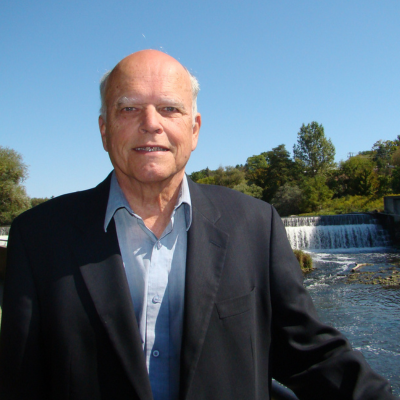

Derek Coleman is a recognized pioneer in the field of environmental and ecological planning. He was one of the country’s first planners to demonstrate how a science-based approach could support the inclusion of environmental considerations into the planning process. In the 1970s, he founded one of the first environmental/ecological consulting firms, and over an extensive career, Dr. Coleman has helped set the standard for environmental planning in Canada.
He has been a leader in educating the planning profession on how to survey, analyze and plan in a manner that protects environmentally important landscapes, species, wetlands, forests and shorelines. He has worked on over 1,000 projects in eight provinces and collectively this work has helped to protect the natural environment in Canada. As a committee representative, Dr. Coleman helped develop the municipal- class environmental assessment regulations in Ontario and in a similar role, he contributed to drafting the regulations for the Canadian Environmental Assessment Act.


Russell Mathew is a partner at Hemson Consulting Ltd. with nearly 40 years of professional experience in growth management, long-range planning, and demographic and economic forecasts. During his distinguished career, he has undertaken growth management related planning assignments across Canada.
Russell’s career has focused on the development of sophisticated demographic and economic forecasts at the provincial, regional, and municipal level. This expertise has included housing, non-residential space and land need projections used at every level of government. Russell’s forecasting work is based on his expertise in analyzing market dynamics and planning for the economic base as a foundation to urban and regional growth management. He has prepared a wide range of economic and growth-related studies for varying scales from super-regional to traffic zones. Russell is a speaker, mentor, volunteer, and active community member.


Based in Manitoba, Somia Sadiq is a leading planner who has developed a pioneering practice in engagement, conflict transformation, and negotiating space for those whose voices are often unheard or ignored. Rooted in the work of impact assessment, Somia founded Narratives Inc., a planning firm that emphasizes human-centric, trauma-informed story work, lived experience, and creating space for celebration of ancestral identity. Somia is also the founder of Kahanee, a non-profit organization that works nationally and internationally amplifying storytelling and facilitated dialogue for peacebuilding.
Somia began her professional planning career undertaking impact assessment with a focus on resource, energy, and infrastructure projects. Her Master’s Thesis focused on Free, Informed, and Prior Consent (FPIC) by Indigenous communities in mining projects, and led to a series of recommendations for reforms in impact assessment process and legislation in Canada. Her Doctorate focuses on understanding the role of Identity, Othering, and Trauma in conflict transformation.


Bruce has played key roles in the Ontario Public Service on a variety of noteworthy planning initiatives including the development of the Provincial Policy Statement and the Growth Plan for the Greater Golden Horseshoe, both of which have since been recognized for their contributions to excellence in the planning profession. For several years, Bruce was a lecturer at the University of Western Ontario, and a guest lecturer at the Universities of Waterloo and Guelph, where he also contributed as a graduate advisor. After serving on the Accreditation and Legislative Task Forces during CIP’s Planning for the Future review, Bruce was a Founding Director of the Professional Standards Board (PSB), serving as its first Treasurer. Bruce has also been a tireless volunteer with the Ontario Professional Planners Institute (OPPI), serving as a Director and Chair of various committees. He is a recipient of the Amethyst Award, Ontario’s highest order of recognition for excellence in the Ontario Public Service.


Eric is a Partner with Urban Strategies. As a planner, urban designer, and architect, he has led on projects such as the University of Ottawa Master Plan and Design Strategy, Ottawa Downtown Master Plan and Design Strategy, Toronto’s CAMH Master Plan, the landmark Eglinton Crosstown LRT project, as well as many projects across Canada, the UK, and Ireland. His membership or chairing of Design Review Panels (City of Toronto, Waterfront Toronto, City of Brampton) has provided a valuable contribution to improving the quality of important city-building initiatives. Eric is a founding member, Director, and President of the Council for Canadian Urbanism. He is also a past member of Ontario’s Urban Design Working Group and is active in his own community of Roncesvalles in Toronto. Many of his projects have received national and international recognition and awards, including from CIP and Ontario Professional Planners Institute (OPPI).


Pierre has distinguished himself as one of Canada’s leading scholars, whose teaching and research has made significant contributions to planning practice in Canada and abroad. Whether through his courses, lectures, or as an advisor and mentor, Pierre has been a leader in advancing planning course curricula for almost four decades. He is a leading expert in downtown and inner-city planning, metropolitan regional planning, and the interaction between land use planning and transportation. His many publications and books include, “Canadian Cities in Transition”, now in its sixth edition, which is a staple for planning students across the country, as well as practicing planners who seek to better understand the transformations underway in Canada’s urban centres. Pierre’s expertise on complex urban issues has led to collaborations with government (local, provincial, and federal) and non-government agencies.


Samantha is a planning consultant based in Prince Edward Island (PEI). After commencing her career as a small-town planner, she was engaged by the Province as the Senior Provincial Planner, then Manager of Municipal Affairs. As Manager, she undertook a transformative role as a key leader in the development of a new Municipal Government Act. Her work in modernizing legislation, policy, and governance to strengthen PEI’s municipalities will benefit communities far into the future. Samantha also championed a new PEI Planning Act and Registered Professional Planners Act, all the while continuing to serve as the ‘go-to’ planner for advice on governance and planning issues. She has served on the Boards of the Prince Edward Island Institute of Professional Planners (PEIIPP), Atlantic Planners Institute (API), and CIP. Samantha’s lasting impact on these organizations also includes being a key contributor to the major restructuring of both CIP and API.


David (Dave) Hardy co-founded Hardy Stevenson Associates Limited in 1990, which has grown to become a leading planning, public consultation and social impact assessment firm. Dave has advanced the practice of planning and public engagement through complex assignments in British Columbia, New Brunswick, Ontario, and internationally in China, South America and the Caribbean.
Dave is a recognized expert in effective public participation and engagement. The techniques used by Dave to facilitate the development of community consensus are detailed in his book Who are These People and Why are They Yelling At Me – the art and science of managing large angry public meetings. As a resource used by today’s planning students, Dave’s facilitation skills are being passed onto the next generation of planners.
Dave lives his passion for impact assessment and public participation. He is a founding member and former Director of the International Association for Impact Assessment, the leading global network for the sharing of best practices in this field. In the early 1990s, Dave led the Ontario Professional Planners Institute’s Policy Development Committee and is regarded as one of the first in Ontario to be actively engaged with First Nations communities. Dave has long been committed to improving communications between indigenous stakeholders and non-indigenous planners.
In addition to his exceptional achievements in professional practice, Dave has made several notable accomplishments in volunteer service to his own community. In 2016, he established the Scarborough Community Renewal Organization that brought together a broad range of service providers to improve the health and socio-economic conditions in an area that had long been underserved. With his tireless commitment to the planning profession, Dave founded the Institute for New Suburbanism in 2016. As its Executive Director, Dave has advanced the topic of suburban renewal to the forefront of the urban agenda across Canada.
Dave’s extensive list of articles, publications, and podcasts reflects his commitment to the planning profession in Canada. Throughout the course of his career, Dave has distinguished himself as a social scientist, planning professional, and an advocate for those less fortunate in our society.


During Gwyn Symmons fifty-year planning career, he has managed planning processes ranging from long-term visioning and plan making to large- and small-scale site-specific developments. Many projects have aided the most vulnerable members of society.
Gwyn began his career in the UK in 1971 as a planner with the City of Manchester. In 1976, moving to Canada, Gwyn was successful in applying to become the City of Ottawa’s first housing planner. Subsequently he assisted in setting up the City of Ottawa’s non-profit housing corporation as the Director of Project Implementation and Third Sector Liaison. In 1983 he moved to Victoria and as the first General Manager, set up the Capital Region Housing Corporation in Victoria.
In 1986, Gwyn co-founded CitySpaces with Linda Allen as a consulting firm providing planning skills and services primarily across BC but including Alberta and Saskatchewan. The firm has two offices in Victoria and Vancouver. Gwyn has undertaken the coordination of a number of master planning projects in Victoria including the Glendale Lands, Royal Bay, the former Victoria General Hospital site, and in Saskatoon (2004), the South Downtown Concept Plan (River Landing). Gwyn has used his expertise to guide the development consulting side of CitySpaces assisted in planning and developing multiple non-profit housing units, emergency shelter beds, but also facilities for post-secondary education institutions and other mixed use or complex projects.
Gwyn and Linda transitioned the ownership of CitySpaces to Jada Basi and Noha Sedky in 2020, but Gwyn continues to work in the company and assist in its management.
Gwyn is often asked to provide advice to non-profit housing providers, provincial agencies, and municipalities. He has been extensively involved in the planning and project management of housing projects for families, seniors, youth, persons with special needs, and others. Gwyn has been a strong advocate of the value of social housing and providing high quality, appropriate affordable housing. He has defended new non-profit housing developments at many public hearings and continually advocated for the importance of excellent design in shelters and non-market housing.
Gwyn has been the recipient of excellence in planning awards including, in 2020, the Silver Winner PIBC Award in the category of Inclusionary Planning for the Affordable Housing Redevelopment Criteria Tool. Prepared with Metro Vancouver, the tool provides a method for reviewing existing affordable housing in larger portfolios or across municipal jurisdictions for opportunities to redevelop and increase the number of affordable units. The 2015 Canadian Institute of Planners’ Award for Planning Excellence in Planning Publications recognized the Expiring Operating Agreements Planning Guide.
While Gwyn’s projects were focused in BC, his publications have been used across Canada by local governments, non-profits, and developers involved in the provision of housing and shelter. His work and advocacy for planning and design of services to diverse vulnerable populations experiencing homelessness and other housing challenges has informed many projects.


John Farrow came to Canada from the United Kingdom in the early 1970s. Today, John is recognized as one of Canada’s leading planning professionals.
From 1976 to 1995, John developed his reputation as a strategic thinker at Coopers & Lybrand where he rose from Principal to the position of Managing Partner, a rare example of an urban planner taking the helm of a major management consulting firm. Within this period, John served as President of CIP’s Central Ontario Chapter.
From 1995 to 2000, John was the President and CEO of the Canadian Urban Institute, where he re-established the CUI as Canada’s premier urban policy think tank. During his time with CUI, John set innovative domestic and international priorities. Under his leadership, CUI undertook multi-year assignments in numerous foreign countries and under John’s guidance brought Canadian planning practice to the international stage. Importantly, John’s vision provided diverse opportunities for Canadian practitioners to gain valuable international experience.
Today, he is the Chairman Emeritus of the LEA Group, a multi-disciplinary planning, engineering and infrastructure consultancy. Throughout his distinguished career, he has prepared numerous master plans for large cities and city regions, and worked extensively in India, Central Europe, the Middle East, the United Kingdom, and Canada. Domestically, his influence as a planner and management consultant is evident in municipalities across the country.
Not only has he demonstrated exceptional achievement in his planning practice, but John has also been a dedicated teacher and mentor for many aspiring planners. In addition to establishing the Canadian Urban Institute’s highly regarded internship program, John served as Planner-in-Residence at the University of Waterloo, as a Distinguished Visitor at the University of Toronto’s School of Planning, and for almost 20 years, has taught courses in public policy in the planning program at the University of Toronto. As a prolific writer and speaker, John also shares his knowledge and experience on a regular basis, and has always been generous with his time helping young planners in their careers.
With his infectious enthusiasm, John is truly a visionary who has made exceptional contributions to the planning profession in Canada and around the world.


As a planner in Northern Canada for over 30 years, Lesley Cabott has demonstrated exceptional professional achievement in Planning. Lesley leads Stantec’s planning practice in the North and has worked in communities in the Yukon, Northwest Territories, Nunavut, Newfoundland and Labrador, Northern Ontario, Northern Quebec, Northern British Columbia, and Saskatchewan. She has completed projects with the federal, provincial and territorial governments, First Nations, Inuit and Metis, municipalities, private industry, and countless community groups. She has an intimate understanding of the specific challenges faced by remote Northern communities and works to support decisions focused on long-term sustainability and resiliency.
Lesley’s work in Northern Canada and across the country has focused on communities, climate change, place-making, and energy planning. Lesley brings together multidisciplinary teams to plan for sustainable futures across Canada and has led award-winning public and stakeholder engagement and planning processes. Her range of planning experience includes strategic planning, land use plans, transportation work, neighbourhood design, official community plans, asset management, capital plans, energy, climate, and sustainability initiatives. She has received several professional awards and recognition including Governor General’s Leadership, Consulting Engineers of British Columbia, Canadian Electricity Association’s Award for Social Responsibility and Sustainability, Planning Excellence from PIBC for the new sustainable community of Whistle Bend, and from the City of Whitehorse for her leadership and vision for the planning and redevelopment of the downtown riverfront.
Lesley is an engagement specialist and an experienced facilitator. She has held public meetings in small and remote communities across the country and leads respectful conversations often tackling difficult subjects. She provides thoughtful guidance to help communities work through complex and controversial decisions. Hosting conferences in Northern Canada, Lesley understands how important it is for planners to work together, share successes, and highlight the challenging planning work undertaken in these communities. She was instrumental in bringing three different planning conferences to the Yukon, including the PIBC Annual Conference, which was hosted in Whitehorse in 1999. This conference was a first introduction to Northern Planning for many PIBC members.
Lesley has demonstrated consistent professional leadership, and in particular through her work with Indigenous people. She was a long-term Chair of the Yukon Land Use Planning Council and understands the importance of regional planning for the implementation of Yukon’s Final Land Claim Agreements. Through her planning work, she has built lifelong relationships with Indigenous leaders. Over the course of her career, Lesley has provided formal and informal mentorship to many of the Yukon’s planners. As manager at the City of Whitehorse, she hired and trained young planners who are still in the territory and are now mentors themselves. She has been involved for many years in the Yukon Chapter of the Planning Institute of BC (PIBC) and served as the organization’s President from 2019 to 2021. She is a thoughtful, supportive, and inspiring leader, who encourages people to grow.


Mark Holland’s planning career spans more than 30 years. His years of practice cross many domains – as a municipal planner (Vancouver), as a planning consultant (Holland Barrs Planning Group / HB Lanarc), with non-profit organizations (Ecodesign Resource Society, Community Energy Association, Healing Cities Society, Urban Development Institute), in real estate development (VP of Development for New Monaco LP and Storm Mountain Developments), and in academia (Professor at Vancouver Island University).
Mark’s work has taken him across Canada, the United States, and further abroad, where he has grappled with issues at the regional, city, neighbourhood, site, and building scales. He has also worked with First Nations on community plans and resource management governance systems. He is probably best known for driving innovations and confronting the status quo in planning, including being one of Canada’s leading planners in sustainable development in the 1990s and early 2000s. Mark has continued to be a leading voice on the topics of sustainability, healthy communities, agricultural urbanism, climate change, and smart cities and ecodistricts. His work in these areas has led to the co-authorship of two texts: Agricultural Urbanism (2010) and Urban Magnets (2020).
Mark has also made significant contributions as a planning educator. He began as an instructor in the University of British Columbia’s School of Architecture and Landscape Architecture in the early 2000s. Since then, Mark has been a frequent speaker on topics related to planning and sustainability at the University of British Columbia and Simon Fraser University. Perhaps his greatest influence on planning education is the role he played in launching the Master of Community Planning degree at Vancouver Island University (VIU) in 2014. Ever since, he has played an instrumental role in the school, driven by a commitment to ensure that the next generation of planners is prepared to help communities create their future.
Mark’s contributions have been recognized over the years, having been awarded a number of prestigious awards including Top 40 Under 40 Award (Vancouver Magazine), PIBC “Planner of the Year”, Queen’s Diamond Jubilee Medal, and recently VIU’s Graduate Student Mentor Award.


Few planners over their careers have made such a transformative impact on not only their communities, but also on the profession as Kelley Moore. For over 20 years, Kelley has worked to enrich the lives of others through her exceptional physical and social planning expertise and exemplary collaborative and community building processes. Her career has included work at the local, provincial, and international levels in both public sector planning as well as in the private sector.
Kelley Moore is an award winning practitioner who has been recognized for her leadership and accomplishments in several complex multi-stakeholder projects. Early in her career, at the City of Saskatoon, she elevated local area planning from a general consultative process to a hands-on collaborative planning and design process that has been emulated and adopted by many planning departments across the country. She later applied this expertise as a volunteer in Trinidad and Tobago, working with communities in those countries through a partnership between the Canadian Institute of Planners (CIP) and the Canadian International Development Agency (CIDA).
At the Province of Saskatchewan Ministry of Social Services, Kelley and her team were a co-recipient of the distinguished Premier’s Award for Service Excellence in 2013, and, in 2019, she was awarded the Deputy Minister’s Award for Building Organizational Culture. One of the projects that was recognized for its outstanding impact was her work on residential and day program services for people with disabilities. Using a collaborative approach with meaningful engagement, this work resulted in the dramatic improvement of the quality of life for citizens in need across the province. Since then, Kelley has continued to apply herself in many ways by volunteering for the profession and continuing to advance planning initiatives in her public sector roles as well as through her consulting practice, Prairie Wild Consulting Co.
In addition to her remarkable accomplishments as a practitioner, Kelley’s contributions to the profession are truly worthy of special recognition for the extraordinary impact they have made on the profession. In 2015, when the Canadian Institute of Planners organization was suddenly facing potential dissolution, Kelley Moore stepped up to help lead an initiative to rebuild the Institute. As Co-Chair of the FutureFORWARD Task Force, Kelley helped lead and shape the work that resulted in a re-invigorated, stable, and well-managed organization. To ensure the smooth implementation of the Task Force’s recommendations, Kelley went on to serve as a member of the CIP Board. For this work, in 2016 she and the other members of the FutureFORWARD Task Force were awarded CIP’s President’s Award for Distinguished Contribution to Planning.


Dr. Leela Viswanathan is an accomplished and innovative educator, researcher, and mentor.
She promotes diversity and inclusion as a core strength of urban planners in both teaching and practice. Her outstanding ability to build connections among people, places, and practice has transformed planners and communities across Canada and beyond.
Leela has been recognized as a distinguished professor, researcher, mentor, and academic supervisor for over two decades. She has demonstrated exceptional leadership in advancing planning knowledge through her ability to unite various disciplines, levels of government, and community interests toward more equitable and inclusive communities.
Leela has focused her teaching and mentoring on shaping a generation of ethical, inclusive, and human-focused planners. She actively supports an ongoing community of practice for her students, mentees, and colleagues, and consistently encourages her students to embrace their place in a worldwide community of practice. As a result, her students have engaged in planning practice and research across Canada, Europe, South-East Asia, the Caribbean, and the United States. Leela’s influence on the next generation of planners is also evident in her collaborative research with Indigenous communities. Her exceptional contributions as a professor, mentor and, particularly, as a champion of equity, diversity, and inclusion, are demonstrated by her numerous accolades and awards.
Leela has a long and established track record of culturally and socially relevant research that promotes healthy and inclusive communities. Her PhD research on, “Postcolonial Planning: The Alternative Planning Group and the Transformation of Social Planning at the Turn of the 21st Century” remains a highly relevant study of the social and spatial transformation of multi-cultural cities. Over the past two decades, Leela has continued to significantly contribute to the theoretical basis of planning research and practice, particularly in the areas of social planning, equity, truth and reconciliation, and ethical practice. Leela has authored seven book reviews on topics including Indigenous planning, social justice in diverse suburbs, planning for diversity, and negotiating identity and belonging for racialized and immigrant populations. Leela is a skilled moderator, discussant, and presenter. For CIP’s centenary celebrations, she moderated four bilingual national discussions and co-created a discussion paper about the future of the planning profession in Canada.
Leela is widely recognized as a planner who believes that a professional’s actions must enhance equity and inclusion, particularly for historically underserved communities. As a thought leader in the planning profession, Leela is often asked to serve as a keynote speaker, moderator, or facilitator. She recognizes the humanity of practitioners and provides tools for planners to address their own mental health, resilience, and well-being. She has presented public and professional lectures on “Planning with Purpose,” mental resilience and wellness, fostering empathy, and addressing trauma and the emotions of ethical planning.
Leela continues to provide mentoring and leadership advice both through her private consulting firm, Viswali Consulting and as an Adjunct Associate Professor with Queen’s University. Her consulting work focuses on strategic approaches to relationship building for the purposes of both community development and systems change. Her achievements not only advance planning knowledge, but they contribute to the development of future planners and community leaders.


Having taught and mentored students at both McGill University and the Université de Montreal for over 25 years, Dr. Fischler’s reach of influence has extended all over Canada, as well as internationally, through his role as an academic, researcher, and professor. As a research supervisor, he has guided and shared his knowledge with over 80 doctoral and masters’ students who have gone on to make their own marks in the profession. In 2013, McGill University awarded him the Principal’s Prize for Excellence in Teaching when he was Director of the McGill School of Urban Planning, and in 2018, he began his current leadership role as Dean of the Université de Montreal Faculté de l’aménagement.
While Dr. Fischler’s impact on students has been profound, it is his contributions to research in planning that reflect his mastery in the field. His expertise in the history of zoning is recognized throughout North America. His publications in this area have been extensive and continue to inform countless practitioners and students. Dr. Fischler has been the recipient of many awards for his expertise, including CIP, the American Planning Association, the International Planning History Society, and the Urban History Association. In 2019, his deep knowledge of planning history in Canada substantially shaped the marking of CIP’s centenary in his role as co-editor for the Plan Canada Centenary special issue edition.
In addition to his outstanding teaching and research work, Dr. Fischler has also devoted himself to community service and the advancement of the profession. When certification and accreditation requirements were being revisited and renewed a decade ago, he played a central role in the definition of the new standards as Co-Chair of the Task Force on Accreditation. He also served on the CIP Policy Committee. In Quebec, his volunteer contributions have included leadership roles as a Board member on the Ordre des urbanistes du Quebec (OUQ) and member of the Comité Jacques-Viger, the design and planning review committee of the City of Montreal. As a highly respected and accomplished member of OUQ, he was honoured in 2014 with the designation of Urbaniste émerite (Fellow).
The career and accomplishments of Dr. Raphaël Fischler in the field of urban planning have been truly exemplary and his work continues to inspire generations of planners.


Over the past 25 years, Dr. Sasha Tsenkova has been an exemplary educator, researcher, and mentor. Shortly after completing her PhD at the University of Toronto, Dr. Tsenkova joined the School of Architecture, Planning and Landscape (formerly Faculty of Environmental Design) at the University of Calgary as an Assistant Professor in 1999. Dr. Tsenkova quickly ascended through the academic ranks and, in 2004, was promoted to Full Professor – a testament to her abilities as a planning scholar.
At the University of Calgary, Dr. Tsenkova has taught a broad range of courses in the areas of housing, urban policy, planning theory, international development, and research design and methods. Through her teaching, she has influenced upwards of 2400 students, in addition to supervising more than 46 master’s theses and projects and 10 PhD students.
With over 150 publications, Dr. Tsenkova is a prominent voice in the areas of housing policy, growth management, sustainable cities, and comparative urban development. While Dr. Tsenkova has made significant contributions to planning in Canada, her influence extends well beyond the Canadian context. In working with the World Bank, Council of Europe, and United Nations, Dr. Tsenkova has played a critical role in projects in 30 countries across Central and Eastern Europe, Latin America, and Central Asia. Additionally, she has been a visiting scholar in Austria, Bulgaria, Denmark, Latvia, the Netherlands, Scotland, Sweden, and the United States of America.
Dr. Tsenkova’s contributions to planning have continuously been recognized by her peers having received a number of prestigious awards including the Killam Fellowship, Urban Studies Fellowship, Sasakawa International Fellowship, International Peace Scholarship, and the British Council Award. In 2019, she received CMHC’s President’s Medal for Outstanding Housing Research, and in 2014 was awarded PLAN Canada’s Best Feature Article Award for her publication: Investing in New York’s Future: Affordable Rental Housing in Mixed Income Projects.
Dr. Tsenkova has been an engaged member of CIP and the Alberta Professional Planners Institute. She has continuously volunteered with both organizations, including serving as Co-Chair of the CIP New Urban Agenda Committee.
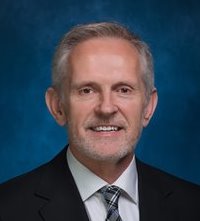

Alex Forbes stands out as a public sector planner in Atlantic Canada, who has added to the stature of planning in Canada through a considerable variety of roles and efforts at the local, regional, provincial, national, and international levels.
In professional practice, he has made his mark in both New Brunswick (NB) and Prince Edward Island (PE), honing his abilities as a skilled planner and leader in advancing land use planning and heritage conservation legislation. This included leading Fredericton, NB, through a major expansion to the Heritage Preservation Area Plan and By-Law, and being the fundamental force behind the designation of Marysville, NB, as a National Historic District.
Over his career, planning practice responsibilities have ranged from roles leading planning initiatives in Fredericton and Charlottetown, PE, to devoting his expertise to tsunami relief efforts rebuilding communities in Sri Lanka, on behalf of the City of Fredericton and the Federation of Canadian Municipalities. Through five missions to Sri Lanka, Alex developed a professional working relationship with municipal officials in communities that were struggling with the aftermath of the natural disaster by introducing business process improvements related to a new building permit process.
Alex has served in a number of capacities in advancing the planning profession: first with the New Brunswick Association of Planners, then later as President of the Atlantic Planners Institute, Vice-President of CIP, and Co-Chair of the 2014 CIP Conference in Fredericton. He was also instrumental in the recent establishment of the PEI Professional Planners Association and currently serves as its President. Alex served as the chair of the Communications Committee which established the recent CIP logo and branding statement. One of Alex’s most notable legacies, has been as champion and driver of CIP’s renowned Great Places in Canada Program, which has broadened the profile of the planning profession to reach and delight the Canadian public.


François Lapointe has made very significant contributions to the planning profession at local, regional, and national levels during a career that spanned five decades. These contributions include his leadership as a planning practitioner and in the development of the profession, as well as his strong commitment to planning education and research.
François held senior roles in the National Capital Commission (NCC) between 1992 and 2013, where he was known for his expertise in strategic planning and management, urban governance, environmental planning, and communications – skills that are prized when dealing with the challenges of multiple governmental jurisdictions. His responsibilities included the Plan for Canada’s Capital (PCC), the Gatineau Park Master Plan, and the Greenbelt Master Plan, which received an Award for Planning Excellence from CIP. Prior to the NCC, François worked in senior planning positions for the City of Ottawa (1990-1992) and in the Saint-Jérôme area, north of Montréal (1981-1990).
With respect to community service and leadership in the profession, he served as an administrator and then President of the Corporation Professionnelle des Urbanistes du Québec (later l’Ordre des urbanistes du Québec) during a critical time in its development (1988-1990). His contribution to the professionalism of planning in Quebec was recognized by the OUQ, which awarded him the Hans Blumenfeld Award and bestowed him the title of Membre émérite.
More recently, François has been conducting research on the governance of capital cities, with a special focus on the governance of Canada’s Capital, initially in association with the Centre on Governance of the University of Ottawa, and currently as an independent researcher.
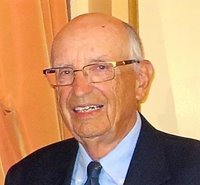

Kingsley Lewis is a long standing member of Canada’s professional planning community in Atlantic Canada. Following eight years as a regional planner in Nova Scotia, he moved to Prince Edward Island (PEI) where, over more than 40 years, he performed a variety of planning roles within the provincial government, retiring as the Manager of Provincial Planning. He served to foster economic resilience and sustain key land resources, while shaping and strengthening land use planning across the province. Kingsley played an integral role in the development of transformational legislation – the Lands Protection Act. As Land Resources Coordinator, he was also responsible for implementing the Report of the Royal Commission on Land. These two initiatives continue as significant tools to direct the pace and type of development within the province. The implementation of the Act’s related policies and programs is referred to by planners across Canada as a significant planning endeavor to conserve iconic landscapes, sensitive environments, and economic resources.
Kingsley is deeply committed to the significance and viability of the Atlantic Planners Institute (API) and the Prince Edward Island Association of Professional Planners. As a practicing planner, he held executive positions on nine API Councils and is a past President of the PEI branch of API. Upon retirement he undertook the role of Executive Director of the API and changed the Institute from a volunteer association to a professional organization, which fosters cohesion among its four branches. He was a champion of the Registered Professional Planners Act, and during its passage into law, Kingsley was publicly acknowledged in the PEI legislature as the “Godfather of Planning in PEI.”


Currently, as the City of Burlington’s Deputy City Manager, and previously as Chief Planner for three of the country’s fastest growing cities/regions in Ontario, Mary Lou’s planning expertise has centered on the development and implementation of plans and policies for communities within the Niagara Region and the City of Burlington. She has led several municipalities through complex and challenging planning initiatives, including the preparation of comprehensive growth management strategies and Official Plan reviews. Setting Sail: Secondary Plan for West Harbour in Hamilton, Ontario, was one of her many achievements and set a benchmark for comprehensive and integrated waterfront planning in Canada. Amongst Mary Lou’s remarkable strengths is her extraordinary ability to manage sensitive consultations and her outstanding capacity for consensus-building. This was demonstrated repeatedly through her work helping communities navigate such complex issues as intensification, urban sprawl, congestion, affordable housing, environmental protection, and economic development.
In addition to her professional practice leadership, Mary Lou has volunteered countless hours to local community volunteer social service organizations. In her workplace, she has led initiatives promoting inclusion and diversity, as well as life-long learning. As an avid supporter of young planners, she has served both by example and as a mentor to empower staff and encourage self-growth and professional development.
One area that stands out within her exceptional contributions, has been her unwavering dedication to supporting the advancement of the planning profession in Ontario and Canada as Ontario Professional Planners Institute President and provincial representative on the CIP National Council. This was most clearly demonstrated in her efforts to advance the Planning for the Future (PFF) project to establish new certification and academic accreditation standards for the planning profession in Canada. Often under challenging circumstances, Mary Lou’s ability to communicate the importance of the PFF recommendations and facilitate an open exchange of perspectives, was instrumental to achieving support across the nation.


Melanie Hare is a highly regarded professional planner with over 30 years of planning experience, during which she has produced many inspiring and award-winning plans, taught and mentored countless aspiring planners, and provided exemplary community service. As an Accredited Planning Professional since 1993 and a Partner at Urban Strategies, she plays a leadership role in promoting sustainable planning practice.
In addition to her extensive work in Ontario, Melanie has been responsible for plans in other Canadian provinces, the USA, and Barbados. Further, the projects she has worked at range of scales from site specific (University of California, Berkeley Campus), to transit corridors (Saint Paul), municipal and waterfronts (Toronto), regional (Durham and Edmonton Metro), provincial (Ontario Growth Plan), and national (Barbados).
The innovative and professional quality of Melanie’s work is underlined by the numerous awards that she has received, which include six (6) CIP Awards for Excellence, as well as awards from the American Planning Association, Alberta Professional Planners Institute, Ontario Professional Planners Institute, Urban Land Institute, Royal Architectural Institute of Canada, Alberta Union Municipal Association, Niagara Region, and the City of Toronto.
Melanie has contributed to planning education throughout much of her career. In particular, she served as an instructor, examiner, and mentor at Ryerson’s School of Urban and Regional Planning, as well as a mentor of numerous graduates of planning programs seeking certification. Melanie’s extensive community service includes serving as a Board Member on the Canadian Urban Institute, Vice-Chair of the Ontario Heritage Trust, Member of the CAMH Property Committee, regular presenter at OPPI, ULI, and CIP conferences, frequent participant in media reports, and leader in local neighbourhood planning initiatives.


In over 30 years of practice, Dr. Pamela Shaw has been a dedicated professional practitioner, academic, mentor, and tireless volunteer and proponent for the Planning Institute of British Columbia, Canadian Institute of Planners, and the planning profession. Her development of leading-edge planning methodologies through her work with Indigenous communities, her commitment to exploring new models of community engagement, and her exceptional capacity to promote the planning profession amongst a diversity of community interests, are amongst her many truly remarkable achievements.
Pam’s professional practice work has focused on First Nations Planning and land development, working with over 20 of the more than 60 Nations on Vancouver Island. This has included supporting and encouraging First Nations planners. As an academic and teacher, she has inspired and mentored countless students, and was the driving force behind the development and recent recognition of Vancouver Island University’s Master of Community Planning, as an accredited graduate planning program. Her planning research work includes not only Indigenous planning, but has extended to advocating for grant programs and promoting international partnerships for planning students. The truly remarkable number of awards recognizing her excellence in teaching, multiple scholarly publications, and her enthusiasm for experiential learning, all exemplify her outstanding accomplishments as an educator and teacher.
In addition to all of her other contributions, Dr. Shaw has also been a long-time supporter and contributor to the advancement of the planning profession locally, and in Canada, including serving as a PIBC Councillor and as Director and Treasurer of the CIP Board of Directors.
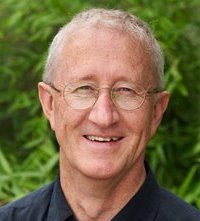

Dr. Wayne Caldwell’s career as a consummate professional planner is far ranging – practicing planner, teacher, mentor, researcher, community activist, and leader in the profession. An astute rural planner who started his career in rural and small town planning in the 1980’s, Wayne has developed approaches to planning and development that are practiced throughout Canada today. He is nationally recognized as a champion of the well-being of rural areas – their communities, people, heritage, farmland, and sensitive resources. Wayne truly elevated the voice of rural planning within the profession. In 1992, he began teaching in Rural Planning and Development at the University of Guelph School of Environmental Design and Rural Development, becoming the Director of the department in 2011. He has taught, and mentored, numerous planners who have significantly contributed to advancing sustainable rural communities across Canada. In addition to teaching, he continued to reach out to rural communities to develop a broader understanding of rural affairs. Wayne has shared his practical knowledge of rural potentials, rural engagement, and conflict resolution, through working sessions with communities, books, publications, and conference presentations, thus becoming a nationally respected scholar, professor, and practitioner.
Wayne championed the conservation of the Lake Huron coast, as a founder of the Lake Huron Centre for Coastal Conservation and the Huron Stewardship Council. While Chair of the Ontario Rural Council, he spearheaded commitments to build strong rural communities. Among his many contributions to professional leadership, he served as President of the Ontario Professional Planners Institute and provincial representative on the CIP National Council, as well as President of the Association of Canadian University Planning Programs.
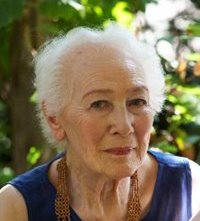

Blanche Lemco van Ginkel can truly be described as a pioneering woman in the fields of planning and architecture in Canada. Highlights from her planning career, which began in the 1940s, include work on early plans for Bowring Park NL, Bathurst NB, Meadowvale ON, Regina SK, influential studies of the Port of Montréal, Midtown Manhattan and Vieux Montréal, and serving as a member of the planning team for Expo 67 in Montréal. An engaged citizen, Blanche, together with Sandy (H.P.D.) van Ginkel, was the earliest opponent of the demolition of Vieux Montréal, organizing planning professionals to oppose an expressway that would have eliminated the historic heart of the city. Blanche taught for over 30 years at the University of Pennsylvania, Harvard GSD, Université de Montréal, McGill and the University of Toronto, where she was Dean, mentoring hundreds of students and becoming an inclusive role model for young professionals. This trailblazer was one of the first female members of the TPIC (now CIP) and the first woman elected as a TPIC Councillor in 1962. Blanche was the first female Fellow of the Royal Architectural Institute of Canada in 1973, and, in 1977, became the first woman to be appointed as a Dean of Architecture in Canada. She was a founding member of l’Ordre des urbanistes du Québec, which established the Prix Blanche Lemco van Ginkel in her honour. A Member of the Order of Canada, Blanche has received numerous practice, academic, service awards, including the International Federation of Housing and Planning Grand Prix and the Massey Medal.


Dana Anderson’s career as a professional planner spans 30 years and has seen her make significant contributions in both the private and public sectors. Her experience at various levels of government, for national corporations and with communities ranging in population from 2,000 to 2,000,000, speaks to her ability to transfer planning knowledge and practice, as well as to make a substantial and positive change in many communities. In her role as the Director of Planning for Oakville, Ontario she delivered one of the first approved Official Plans and Zoning By-laws to implement the Province of Ontario’s 2006 Growth Plan. She has also successfully managed several complex redevelopment projects across Ontario and has been recognized by the Ontario Professional Planning Institute (OPPI) with awards of excellence for her planning projects and volunteer service to the Institute where she has served as a Council Member and Committee Chair.
Dana was involved in an Ontario Municipal Board (OMB) hearing where the Board’s decision dealt directly with the issue of expert planning opinion and objectivity and the decision became a precedent for the role professional planners should demonstrate in a hearing and reflects on her exemplary ethical standards. This OMB decision is now used by the Professional Standards Board and by many Canadian planning school courses as an example of professional planning practice.
Dana’s contributions to her profession includes her work as Co-Chair of CIP’s National Membership Standards Committee where she was instrumental in the Planning for the Future project. She also chaired the Task Force on the implementation of planning school program accreditation standards as well the Task Force on ethical standards of practice for the profession.
Dana continues to co-teach a studio graduate course in Project Planning at the University of Waterloo and has continuously contributed as a speaker, panel member and guest lecturer on planning practice. Dana has demonstrated over her distinguished career a mastery of the principles of planning and continues to inspire young planners as a mentor and an example of how planners can and should contribute to their communities.


The late Kathy Dietrich made an incredible impact on her colleagues and practice during her life. Her work at the Town of Cochrane on implementing a rare Community Revitalization Levy financial tool to support the redevelopment of a high-profile contaminated downtown site is an award-winning example of achieving inner-city redevelopment. Her work to revolutionize on the approach to development charges at the City of Calgary is an illustration of transparency in process, fostering relationships with city builders and creating a sustainable fiscal arrangement to support city growth. It is being looked at by municipalities across Canada as a way to undertake their own review of development charges and improve their relationship with the development industry. Kathy was also involved in the educational system throughout her career, delivering lectures and courses at universities, and helping develop curriculum for professional seminars. She exemplified strong leadership and mentored many colleagues and young planners, assisting them to improve their interpersonal skills, strategic planning, political acumen, collaboration, and relationship building.


Cyndi has been a practicing planner for over 28 years. Her practice reflects a broad range of the most complex areas of city building: campus planning, sustainability, retail transformations, waterfront planning, and growth planning in complex, highly urbanized environments. It is an understatement to say, that Cyndi’s work has positively transformed dozens of communities across Ontario, Canada, the United States and Europe, receiving several awards of excellence from CIP, OPPI, the APA and CAMA. Cyndi’s community service in the planning profession includes her extensive mentorship of new and emerging professionals, and generosity in sharing her expertise. She is also an engaged leader with OPPI; in the Urban Land Institute’s University Development and Innovation Council; and as a member of the Women’s Leadership Institute of the Urban Land Institute.
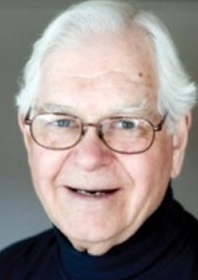

Dr. Hodge has greatly influenced the education and training of several generations of professional planners, politicians, and activists involved with community and regional planning. His formal teaching career has spanned over 30 years, first at University of British Columbia, then the University of Toronto, and then as Director of the School of Urban and Regional Planning at Queen’s University. Throughout his career, he was known for the rigor he applied to planning research and practice, and was a trail blazer in planning courses and curriculum. He was also a mentor to hundreds of students, many of whom went on become leading Canadian planners. Dr. Hodge is a vigorous and accomplished researcher and the author of numerous significant books, several of which are seminal and widely used in Canadian planning schools. Dr. Hodge has also been a strong an effective advocate for planning within the university and professional communities, as well as local and national agencies with a planning mandate, including the CMHC. His role as a leader in Canadian planning was honoured with the CIP President’s Award in 2008, and it is now long overdue, that we welcome Dr. Hodge to the College of Fellows.


Ann Joyner is widely known for her contribution to professional planning through her focused commitment to the recognition of the practice through community service and leadership. A life-long advocate for sustainable development, integrated land use, environmental and infrastructure planning, the cohesive approach that Ann advocated for and launched in Ontario has been adopted across Canada. Ann’s practice has been sustained over two decades on projects such as GRIDS and the Airport Employment Growth District (City of Hamilton); integrated sustainability plans across Canada; Toronto Regent Park re-development, and the Toronto Port Lands Master Plan.
Throughout her career, Ann has been at the heart of the profession working as an advocate for planning as a profession, for the protection of the scope of practice for planners in Ontario, and the pinnacle of her work, self-regulation of the profession in Ontario. Ann chaired two committees of professional planners that were central to advancing the profession: the Professional Practice Advisory Group and the Self-Regulation Strategy Group.
A key leader at Dillon Consulting Limited, Ann’s role as the Planning and Design Technical Leader for Canada ensures Dillon staff continues to drive excellence in all areas of the business. Ann supports the President’s Crew (a practice in Dillon to recruit highly talented new professionals to the firm), provides mentorship in all disciplines across the country and champions the corporate sustainability program. Through the corporate sustainability program, over 1% of the company’s pre-tax profit plus staff time is used for projects in communities where Dillon works. Dillon was recognized for this work in 2014 by the Consulting Engineers of Canada with an Award for Excellence and an Outreach Award, Special Achievement.
For over two decades, Ann has advocated the importance of collaboration between academic and applied planning practices. Bringing her consulting expertise to the classroom, she has taught a range of planning courses at York University, Faculty of Environmental Studies.
Throughout her career, Ann has been an advocate for woman. She is currently a Women’s Leadership Institute Champion for the Urban Land Institute and in 2009 was integral in creating a foundational program at Dillon designed to attract and retain women. Through the Women in Dillon initiative, Dillon has shown significant, progressive change in supporting and providing opportunities for women to achieve leadership roles while developing progressive policies for flexibility and a balanced work/home life for all employees.


In 2000 Anne McIlroy MCIP founded the Urban Design Working Group within the Ontario Professional Planning Institute’s membership and acted as its Chair for a decade. In this role she brought together a diverse network of planners as well as other aligned professionals who organized a series of outreach and advocacy programs aimed at promoting the importance of high quality urban design in the planning of Canadian communities.
Anne is recognized as a unique expert representing the planning profession and has subsequently been invited to sit on multiple Design Review Panels.
Mid-‐Rise Urbanism: Ms. McIlroy has championed mid-‐rise urbanism as an alternative form of urban development beginning with the Avenues and Mid-‐Rise Buildings Study and guidelines for the City of Toronto. This work has been lauded nationally and Anne has gone on to advise other Canadian cities including Halifax and Calgary. This work was honoured with a 2012 National Urban Design Award of Merit and a 2011 Toronto Urban Design Award of Excellence.
Campus Planning: Anne’s professional work as a planner of University and College Campuses across Canada has had a transformational impact on the quality of Canadian campuses. Her concern with the quality of the student experience has resulted in a wholesale transformation of how campus plans are prepared. She has gone onto lead Campus Plans for 15 institutions across Canada including Newfoundland, PEI, New Brunswick, Ontario, Saskatchewan and Alberta.
Waterfront Planning: Anne is recognized internationally as an expert in waterfront planning. Her projects have won 3 Top Honor Awards from Washington DC based Waterfront Centre and she has served as an international juror for their annual awards program.
Teaching and Mentoring Planners: Anne’s professional work has been complemented through her role as an instructor at York University’s School of Planning. Since 2010, she created and has taught the Introduction to Urban Design course. She has served as a guest lecturer at the University of Toronto, Queen’s University, the University of Waterloo and Carleton University.
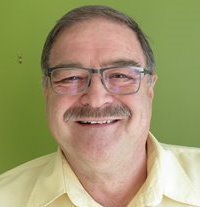

Chris Leach is a Regional Manager with the Community and Regional Planning Branch of Manitoba Municipal Government. His 40-year career in public sector planning spans New Brunswick, the (then) Northwest Territories, Alberta, Nova Scotia, Prince Edward Island and Manitoba. Since joining the Community and Regional Planning Branch, Manitoba’s urban and rural communities and their councils and administrations have been the benefactors of the knowledge and experience Chris gained through working in a variety of natural and human environments. He is respected among his municipal clients for employing a collaborative approach to urban and regional planning that encourages inter-municipal cooperation and contributes to better planning and development management and decision making.
His community planning office has provided a training ground for University of Manitoba planning students who have obtained summer employment and internships through Chris as well as entry-level planning positions upon graduation. Many of these planners have remained in the province, moving on to senior planning positions in provincial and municipal governments as well as the private sector. Chris has mentored many of these young planners who have benefited greatly not only from his broad range of knowledge and work experience, but from his professional insight, political intuition and, just as importantly for a good mentor, his gentle nature, calm demeanor, legendary patience and sense of humour.
Chris has shown a tireless devotion to the work and affairs of CIP at the national level as well as its affiliate organizations including API, APPI and MPPI over his long career. He is a former President of CIP, MPPI and API and has served on or chaired many national or affiliate committees with a focus on membership standards and practices. He currently serves as the MPPI appointee to the Professional Standards Board and Chair of the Board’s Professional Education and Examination Committee (PEEC). He also chaired the Organizing Committee for the very successful 2008 CIP National Conference in Winnipeg. Chris’ contribution to planning and the profession has been significant.
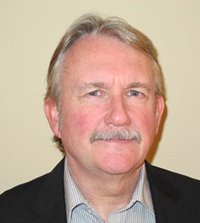

Eric’s professional planning practice began shortly after receiving his Masters in Urban and Economic Geography from UBC in 1981. He spent the next 11 years working in the management consulting group of Coopers & Lybrand Chartered Accountants, rising from Associate Consultant to Senior Manager. From there he went to the City of Port Moody where he served as Director of Planning for three years before launching Eric Vance & Associates, Planning and Management Consultants. As the Director of Planning for the City of Port Moody for three years, and then as a consultant to the City since 1995, Eric has acted as the City’s lead planner on a number of major award-winning developments, including Newport Village. Eric’s work with the City of Port Moody on its last four Official Community Plans speaks to the longevity of his projects and relationships. Eric has also acted as a consultant to many other public and private sector organizations in Canada, including dozens of local governments throughout Metro Vancouver and the rest of BC, some of whom have been clients for many years.
Eric is a passionate advocate for advancing planning knowledge and practice and he does this through a variety of roles. He is a frequent speaker at planning conferences on planning ethics and professional conduct. He is currently an Adjunct Professor in the planning program in the School of Resource and Environmental Management at Simon Fraser University. He was formerly a long-time Adjunct Professor in the School of Community and Regional Planning at the University of British Columbia. Eric’s commitment to SCARP went beyond his role as an Adjunct Professor. Eric served on committees that shaped new course proposals. By doing this important work, Eric helped SCARP to reach agreements on innovations that would otherwise have not come forward.
Eric has quietly and effectively provided inspiring leadership to the Canadian planning profession on ethical principles and practice. His pragmatic-not-dogmatic approach has enlightened many early and mid-career planners and has helped keep everyone on their toes over the years. As a practicing professional planner, Eric works tirelessly to build and maintain dialogue between planners, developers, academics and the larger community. He served two terms as a member of the Planning Institute of BC Council, from 1997-2001, where he took the lead in establishing the first PIBC Mentoring Program and also establishing the PIBC Professional Practice Review Committee on which he continues to serve.
Eric has served on CIP task forces, including the Ethics Task Force and rewrote/updated the Code of Professional Conduct and addressed implementation of the new accreditation system as a member of the CIP Accreditation Implementation Task Force.


Frank Ducote is one of the most experienced and influential urban designers in British Columbia, having worked at the municipal level for almost 30 years, and for the last decade as a private consultant. He is the Principal and sole practitioner of Frank Ducote Urban Design, a Vancouver-based firm specializing in urban design, physical planning and public engagement for creative and feasible outcomes for both private and public sector clients. Frank served as Senior Planner and Senior Urban Designer for the City of Vancouver for over eleven years and has held similar roles in San Diego’s City Architect’s Office, the City of North Vancouver and the District of North Vancouver. In the District of North Vancouver position, he helped develop the visions and community plans for four town and village centres that are intended to capture the great majority of the District’s growth over the next twenty years.
Gary Penway, the City of North Vancouver’s Director of Community Development, describes the exceptional planning skills that Frank displayed in developing the multi-award-winning Civic Centre for the City of North Vancouver. The Centre, anchored by the Civic Library, was awarded top honours at the 2012 National Urban Design Award and the BCLA Award of Excellence. It also was awarded both the Governor General’s and the AIBC Lieutenant Governor’s Awards. His urban design contributions to team efforts have also led to PIBC planning awards for Vitalize Tofino and the Colwood/Langford Official Community Plan.
In addition to his private practice work, Frank continues to teach courses in the influential SFU City Program in Public Realm, Integrated Neighbourhoods and Visual Communication. He is also adjunct professor at UBC’s School of Community and Regional Planning and guest lecturer at other educational institutes. He has also held teaching posts in planning and architecture department programs in San Diego, Los Angeles, Pomona, and at Langara College in Vancouver.
His teaching and mentoring skills are especially note-worthy. Hundreds of students have benefitted from Frank’s friendly, ethical and inspirational approach to mentoring and teaching. Several supporters now in leading planning positions stress the benefits they have derived from Frank’s mentoring.
Frank is a recognized expert in leading and facilitating public and stakeholder urban design charrettes. His “let’s get physical” approach helps lay persons visualize and communicate their own aspirations clearly. To this end, Frank has developed a unique modeling process to engage participants in meaningful 3-dimensional design exercises. The intent is to move away from expert-developed 2-D drawings, thus allowing lay participants an equal opportunity to engage in a “hands-on” planning and urban design process. The result has been the fairly quick development of alternate scenarios worthy of comparison and discussion, with a goal of a shared vision moving forward. All participants know they have had input to the planning process. Frank’s devotion to finding ways to communicate the complexity of planning and urban design has led to demands for his advice from developers, educators, governments and citizen groups.
Frank volunteers significant time to community work including service on formal, council-appointed advisory committees such as the City of Vancouver’s Planning Commission and currently with West Vancouver’s Design Review Committee. He also served as a director on the board of the Vancouver Museum. Frank is a very active participant in the ongoing and energetic public discussions about planning in Metro Vancouver, with a particular keen interest in helping to build grass roots awareness and consensus wherever possible.
He spends much volunteer time in advising a variety of community groups about planning issues and helping to raise public awareness and understanding of planning and development. He is currently a key member of the citizen-based Downtown Waterfront Working Group, which is effectively addressing major issues facing the creation of a regional transportation Hub on the City’s Central Waterfront. The quality of urban design, public realm and sense of contextual fit are always paramount aspirations in this work.
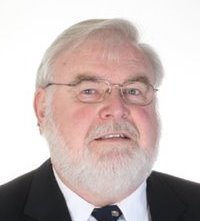

Ian arrived in Edmonton from his native Scotland in 1971, expecting to return within a few years, after furthering his education in geography. But then he encountered planning and his professional life-course was set. He was effectively ‘schooled’ in planning while working for the Peace River Regional Planning Commission (1974-1979), where he developed a special interest in regional development planning, which became a focus for his early 1980s PhD studies. With Alberta Municipal Affairs, in the 1980s, he worked at the interface of municipal finance, land use planning, and policy research. This provided the basis for some experimentation with local government consulting practice, and some part-time teaching at EVDS (University of Calgary), before moving to Victoria BC, in 1991, to work for the Islands Trust.
In 1994, drawing on the combination of his PhD and his two decades of diverse professional planning practice, Ian began what became two decades in the planning academy, as an educator of planners, in the Department of City Planning, University of Manitoba. Reinventing himself as a city-region planner, he developed a particular interest in teaching professional planning practice, both of which were much influenced by the planning program’s location in a design school. He became an advocate of planning as placemaking, as wellbeing by design. His research interests have increasingly focused on ‘evolving professionalism beyond the status quo’. Ian represents his current pre-occupation as ‘contemplating the education of the agents of the next Enlightenment’, with an emphasis on professional-self design, and the related ‘makings’ – praxis, ethos and poiesis.
Ian became a member of CIP in 1977, as he found his planning feet in the Peace Country. He was initially active in the Alberta affiliate. His involvement in CIP increased with his move to Manitoba, including membership on the Plan Canada Editorial Board. Ian is particularly proud of his association with some special issues of Plan Canada, especially planning professionalism, as well as his Program Chair role for 2008 CIP Winnipeg. He continues to strive to be a bridge between the academy and the institute, promoting enhanced reflective practice through his praxis-making and ethos-making work.


Michael has always insisted on the highest standard of excellence in his professional practice and teaching. He was part of the CityPlan team at the City of Vancouver in the 1990’s that received national and international awards for the City of Vancouver’s CityPlan engagement process, which at the time, was one of the largest city-wide projects ever. Since 2000, Michael has been President of MVH Urban Planning & Design working on projects in Canada, the United States, Mexico, Russia, and China. Most recently, Michael’s commitment to excellence in planning was recognized by the 2014 PIBC Gold Award for the City of Penticton Downtown Plan with the City of Penticton and the 2014 APPI Award of Merit for the Leduc Downtown Master Plan with the City of Leduc. In 2013, his firm won the international eco-city design competition for Huangshi, China with the Guangzhou Planning Institute. Michael’s unique combination of strong public engagement, illustration/urban design and planning policy skills has resulted in a new expectation that planning documents have a strong combination of all three components.
Michael has mentored planners both in a formal sense throughout his teaching career, but also informally with those he works on projects with across the country and around the world. Michael helped create the award-winning Simon Fraser University Urban Design Certificate program and has trained many mid-career planning professionals over the past 15 years in Vancouver, Calgary, Edmonton, and Ottawa. He is also adjunct professor in the Graduate Urban Studies Program at Simon Fraser University and adjunct professor in the Graduate Community Planning Program at Vancouver Island University. In addition, Michael developed and facilitates the three School of Development courses for the Urban Development Institute in Vancouver.
Michael’s latest book – Dynamic Urban Design: A Handbook for Creating Sustainable Communities Worldwide has received high praise from numerous high-profile planners and designers across Canada and the United States. Dynamic Urban Design is now used by five university and college programs across Canada as a foundation to teach community design.


Karen Russell’s involvement in advancing the planning profession began in the mid-1980s when she served as the Student Representative on AACIP (now APPI) when enrolled in the University of Calgary’s urban and regional planning program and was recruited to make a presentation at the Canadian Association of Planning Students (CAPS) conference. After graduation, she first worked for Alberta Culture as an intern in its heritage conservation program before being hired to work as a land use planner in the private sector. In 1990 she was hired by the City of Edmonton as a Heritage Planner where she worked with the heritage team on the city’s first comprehensive heritage inventory and management plan. In 1996, Ms. Russell moved to British Columbia working in both the City of North Vancouver’s Community Development and Engineering Departments for 13 years before accepting a position with UBC Campus and Community Planning in 2009.
Throughout her career, Karen Russell has been actively involved coaching and meeting with planning students and aspiring planners from all over the country. She has served for several terms as a PIBC Councillor and held positions as both Membership and Education Chairs for PIBC. Over the years, she has conducted examinations, mentored and helped shape the careers of many young planners in British Columbia, many of whom are now at work elsewhere in the country.
Ms. Russell’s achievements in the field of heritage conservation are particularly significant. She has been a leader in this regard, especially in her work on heritage guidelines for the Province of Alberta. Karen was a Heritage Planner at the City of Edmonton from 1990 to 1996 and brought this expertise to Vancouver in 1996. She quickly became a valued member of heritage groups and an advocate for heritage conservation with both local and provincial heritage organizations. She was on the Board of Heritage BC and provided leadership during a time where that organization was dealing with difficult financial and organizational challenges. Karen is currently an active member of the Board of Directors of the Vancouver Heritage Foundation. As a member of the Board, she has provided thoughtful and practical advice on many issues and has continued to provide volunteer leadership.
Karen was an instrumental force on the National Membership Standards Committee as it moved through the Planning for the Future process and the transition of membership certification implementation to the Professional Standards Board. Considerable change is occurring in professional membership standards within CIP and amongst the affiliates. Membership certification and university accreditation standards updating has been a decade long endeavour and Ms. Russell has been there for all of it, representing British Columbia and more recently the National Institute on various professional certification committees including the Professional Standards Committee. Few Members have devoted as much time and effort as Ms. Russell to this process which is now being implemented nationally.
The fact that she continues to be involved and devote her personal time to this difficult and sometimes contentious work is a real indication of her leadership and her devotion to the Profession in Canada.
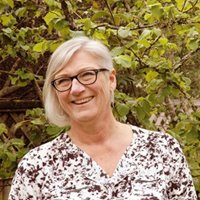

Pat Maloney has demonstrated exceptional achievement in planning practice and the mastery of planning theory, approaches and techniques over a period of nearly 40 years. During her time at EBA Engineering Consultants, Pat held important community engagement and public consultations to write the Samson Cree Nation Community Development Plan, Samson Cree Nation Residential Housing Policy and the Siksika Nation Comprehensive Community Plan. Her early work on First Nations planning projects set the bar for other planners in western Canada with respect to public engagement and quality of policy work. She has been recognised by Indian and Northern Affairs Canada for her work on engaging First Nations and for her leadership, guidance and wisdom which provided a positive gain for hundreds of First Nation members throughout western Canada.
Pat has made a name for herself in the field of airport planning, where she demonstrated an implementation of planning principles as well as the ability to transfer knowledge to projects in over 60 municipalities in Alberta, British Columbia and the Northwest Territories. Her planning work on small to regional-sized airports in Canada has provided municipalities and corporations the means to leverage economic opportunities, leading to positive growth in several jurisdictions. Ms. Maloney has successfully completed many statutory plans in rural Alberta, where her dedication to public consultation and community engagement has ensured that the policies put in place make a significant, positive impact on the communities in which she has worked.
Her longstanding commitment to planning education and mentorship has had a momentous influence on planning in Canada. In addition to mentoring, Pat has taught several planning courses at universities and institutions in Canada. This includes several courses Banff Centre for Environmental Land Management for Aboriginal Lands, the Centre for Indigenous and Environmental Resources and the Aboriginal Affairs and Northern Development Canada. During visits to her Alma Mater, Ryerson University, she would guest lecture about current topics and issues related to planning in Alberta.
Pat has demonstrated exceptional achievement and breadth of experience in advancing the planning profession and the principles of planning for the benefit of the public domain. She has demonstrated community service in planning through leadership of the Alberta Association, Canadian Institute of Planners (AACIP, now APPI) including two terms as President. In her role as President, she led the professional planning organisation and supported the membership to improve public and private development decisions which affect people, places and the environment nationwide. During her time with APPI, she worked tirelessly to bring provincial right to title legislation for planners in Alberta and the Northwest Territories. Pat was also a Director of the Community Planning Association of Alberta and a Director of the Federation of Calgary Communities. Pat sat on the Calgary Planning Commission for four years.
Pat remains very involved in her community as a Board of Directors member of the People for a Healthy Community – Gabriola Island, a non-profit social services agency and community resource centre. Her planning expertise and dedication to volunteer work and public engagement is an invaluable resource to the organisation.
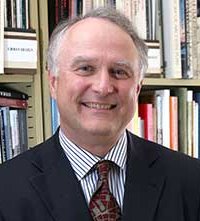

Dr. Gordon practiced as a professional planner for 15 years before joining Queen’s in 1994. His contribution to planning education and knowledge is evidenced not simply through his co-authorship, with Gerald Hodge, of the nationally renowned textbook on community planning, Planning Canadian Communities (now in its 6th edition) but through his many years of teaching planning classes, design studios, and the numerous field trips and site visits to Toronto, Ottawa, and Montreal that he takes first year planning students on year after year. His enthusiasm for planning and design professions is infectious and he shares his experiences with undergraduate students in diverse disciplines, who, as a result of this exposure, seek entrance into planning programs across Canada. He has been instrumental in promoting planning exchanges among students, faculty, and planning professionals between Canada, New Zealand, Australia, Sweden, South Africa and the United Kingdom.
His research has examined, and subsequently influenced, complex Canadian and international issues such as planning national capitals, waterfront development, and the planning of suburbs. His receipt of a Fulbright scholarship is an indication of his high profile in international academic planning circles. He is currently the director of research for the Council for Canadian Urbanism (CanU).
Dr. Gordon has twice earned the CIP’s National Award of Distinction for his contributions to the development of progressive planning practice in Canada.
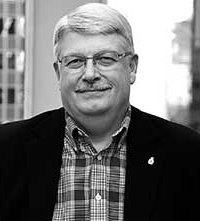

Harry is widely known for the depth of his knowledge in planning theory, approaches, and techniques. Always one to read widely and communicate often with practitioners, Harry has been able to bring new approaches to local practice. As a consultant to local governments, a local government planner, and as a CAO for more than 35 years, he has been at centre stage in bringing about significant, positive changes in British Columbia and Alberta communities. His career has focussed on rural areas and small towns.
Harry is exceptionally highly regarded for his commitment to mentoring planners and students, and for staying in touch with them after their paths have parted. He is a strong promoter of continuing professional development for his staff, and an equally strong supporter of hiring interns, whenever possible. As a member of PIBC Council for four terms, including Vice President and President, Harry encouraged new initiatives to raise the awareness of the profession for PIBC members, allied professionals and the public. He has served on the CIP’s Student Trust Fund Board.
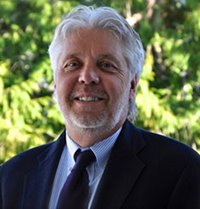

Beginning his career as a planning technician, Richard advanced in the profession to serve as both the Director of Community Development and Deputy City Manager at the City of North Vancouver. His success is due in part to a rare combination of positive energy, a deep knowledge of planning, a gifted ability to strategize and read the political landscape, and a natural curiosity of the world.
Over the years, Richard has also contributed his energy and ideas to mentoring countless young planners, serving on the PIBC membership committee, and lecturing at schools and conferences across Canada. Richard is frequently in demand as a public speaker due to his impressive experience, his extensive planning knowledge, and his genuine enthusiasm for our profession. The many letters of support from Fellows, colleagues, political leaders, and community members consistently draw attention to Richard’s remarkable talent for bringing people together to advance new ideas and progressive initiatives.
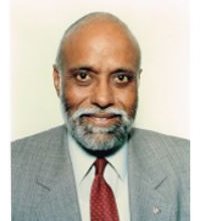

Jagdev Singh (Jag) Dhillon emigrated to Canada in 1963 with his wife Brajinder and his daughter Tina. Already possessing degrees in Science and Law, and a postgraduate diploma in Law, in 1966 Jag obtained a Masters of Science degree in Community and Regional Planning from the University of British Columbia. His Master’s thesis on the Zoning Board of Appeal garnered him a certificate of distinction from the Town Planning Council of Canada (now the Canadian Institute of Planners).
Since that time, Jag has had a lengthy and illustrious career as a planner across British Columbia. He served as a Director of Community Planning, had held executive positions with the Planning Institute of British Columbia (PIBC) and was a charter member of the American Planners Association (APA) and the American Institute of Certified Planners (AICP).
As a volunteer advisor with the Canadian Executive Services Organization (CESO) he successfully completed more than 35 projects in the developing world, and also provided volunteer professional advice to several First Nations in BC.
Jag was named a Paul Harris Fellow by Rotary International, and received not one but two honours from the Crown: The 2003 Golden Jubilee Medal of Queen Elizabeth II for his outstanding work in developing countries, and the 2012 Queen Elizabeth II Diamond Jubilee Medal for his service to Canada.


Lindsay Dale-Harris has been associated with Bousfield Inc. since the firm was founded in 1974, becoming a partner in 1979. She holds a Masters of Science in Urban Planning from the University of Toronto and has over thirty years of experience in a broad range of planning research and special purpose studies including the preparation of Official Plans and Zoning By-laws for public agencies, and the preparation of comprehensive development applications for private clients. She has appeared as an expert witness before the Ontario Municipal Board.
In addition, Ms. Dale-Harris also works extensively on expropriation, valuation and lease arbitration assignments for both public sector and private sector clients providing carefully documented opinions regarding the highest and best use of a variety of properties.
She has been a Director of the Urban Development Institute, and has served on the Membership Committee of the Canadian Institute of Planners. She has lectured at the University of Toronto and York University on the practice of of urban planning in Ontario.
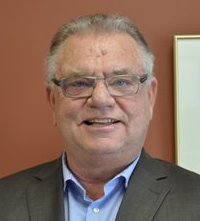

Armin Preiksaitis is founder and president of ParioPlan, an Edmonton-based consulting firm he established in 1996. Armin’s planning career spans almost 40 years and combines experience as a municipal planner and manager, president of a downtown development corporation and planning consultant. He is a strong advocate of urban redevelopment that emphasizes livability, compactness and quality urban design.
Shortly after graduating from the University of Waterloo in 1973, Armin joined the City of Edmonton. In his roles as Planner and Manager, he oversaw innovative projects that included the City’s first TOD planning study and Downtown Plan. Before starting his consulting practice, Armin acquired expertise in public-private partnerships to catalyze new downtown development in his 10 years as President of the Edmonton Downtown Development Corporation.
Armin’s planning expertise covers a broad spectrum that includes statutory plans, zoning bylaws, housing studies, urban design plans, rezoning applications, economic development plans and community consultation. He has prepared many award-winning redevelopment plans for municipalities throughout Alberta and Saskatchewan and has a large portfolio of private sector redevelopment projects. Armin has consulted on most of Edmonton’s major infill rezoning projects in the last decade. Throughout his career Armin has hired and mentored dozens of young planners, many of whom have gone on to hold prominent positions in the public and private sectors.


David F. Brown, PhD, FCIP, Urbaniste is an Associate Professor and former Director (1999 – 2010) of the School of Urban Planning, McGill University, Montreal, CANADA. Educated at Bishop’s University (BA Geography), McGill University (MUP) and Sheffield University where he completed his doctorate in planning, he teaches graduate level planning studios, urban environmental planning, geographic information system applications, and planning methods. He is a member of the Ordre des Urbanistes du Québec and a Fellow of the Canadian Institute of Planners.
David completed his PhD research on the ways that residents in hillside squatter settlement flaking Port of Spain, Trinidad sought to improve their living conditions through individual and community effort. In addition to this work, which falls within the domain of person-environment studies, his research and professional interests include urban development and management, environmental planning, planning issues associated with climate change, and the role of public institutions, community groups and citizens in the planning and development process. He has extensive research experience in Canada, Central America, the Caribbean Basin, and China.
As a professional, David worked on a good number of projects, notably in association with Daniel Arbour and Associates Ltd. and GENIVAR Ltd. His recent projects vary from central city development plans (Port of Spain) to regional development in rural settings in southern Trinidad, to a countrywide Sustainable Island Resource Management Zoning Plan for Antigua and Barbuda.
David has also been very active with professional and community associations. He has served on CIP’s National Council twice, first as a representative of the Ordre des Urbanistes de Québec in the late1970s, and later as ACUPP representative from 2001 to 2005. Additional responsibilities include: President of the Association of Canadian University Planning Programs, Member of the Board of Governors of the American Collegiate Schools of Planning (ACSP), and Editor of Canadian Planning and Policy, an annual publication of academic papers that is financially supported by the CIP.
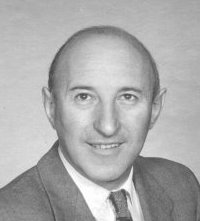

Over four decades, Earl Levin served as a planner at the municipal, metropolitan, provincial and federal levels of government, as well as in private consulting practice and as an academic.
Following his service in World War II, Earl Levin worked in a variety of planning roles across Canada, in large cities such as Toronto, Winnipeg, Regina, Edmonton, Calgary and smaller cities such as Pembroke, Owen Sound, and Weyburn to name a few. He was on the staff of the first Planning Department established in Vancouver; a planner with Central (now Canada) Mortgage and Housing Corporation in Ottawa; the Director of Planning for the province of Saskatchewan and Secretary of Provincial Planning Appeals Board; Vice-President of Murray V. Jones and Associates in Toronto; Director of the Planning Division of the Metropolitan Corporation of Greater Winnipeg; Director of the Winnipeg office of Damas and Smith Ltd.; and President of his own consulting firm.
His academic appointments included Professor and Head of the Department of City Planning (University of Manitoba) and Senior Fellow of the Institute of Urban Studies (University of Winnipeg).
His contributions to CIP and its affiliates were also significant. Levin chaired the formation of the Association of Professional Community Planners of Saskatchewan in 1963 and was the President of the Town Planning Institute of Canada (forerunner of CIP) from 1964-65.
In 2007 Dr. Levin donated his personal papers to the Institute of Urban Studies. While most of these papers were written in the 1960s and 70s, many of the arguments, themes and issues in the essays are still relevant in the 21st Century.
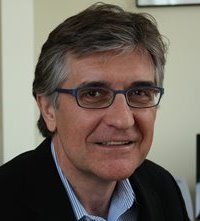

John Gladki’s professional planning career began 38 years ago with the City of Toronto where he worked as a neighbourhood planner, district manager and director. As director of policy and strategic planning he completed the 1994 official plan which introduced urban design, social equity and environmental considerations as key policy objectives. In 1998 he joined the private sector as a director first with GHK Canada and currently with Gladki Planning Associates. Since then he managed projects such as planning for the revitalization of Regent Park, Canada’s oldest and largest public housing complex, Growing Together, an analysis of growth patterns in the Greater Toronto Area (GTA) (a pre-curser to Ontario’s Growth Plan for the Greater Golden Horseshoe), Waterfront Toronto’s precinct plans, growth management studies for GTA municipalities, a climate change protocol for the CIP, revitalization strategies for public housing and development approvals. Throughout his career he has emphasized the need to incorporate affordable housing, inclusiveness and human rights as key planning considerations.
Early in his career he taught at Ryerson University and continues to lecture and speak in Canada and abroad. After the fall of the Soviet Union he worked with municipalities in Poland, Hungary, Lithuania, Latvia and Estonia to help with the transition to local democracy and more recently with municipalities in Bolivia and Palestine.
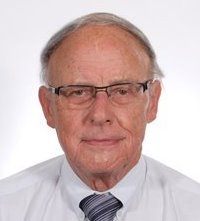

Larry S. Bourne (PhD, FRSC, DES, D.Litt., FCIP, RPP) is Professor Emeritus of Geography and Planning and past Director of both the Graduate Program in Planning and the Centre for Urban and Community Studies (CUCS) at the University of Toronto. Professor Bourne is currently a senior scholar with the Global Cities Program and has just completed a term as Interim Director of the University’s new Cities Centre in 2008.
His current research interests include – to name a few – comparative urbanization and urban policy analysis, globalization and the Canadian urban system, demographic change, migration and immigration, the emergence of new urban and suburban forms, and income inequalities and social polarization.
He has served as a consultant to national, provincial and municipal governments and organizations, and to several national and international agencies and foundations.
Professor Bourne is the author/and co-author of over 245 journal articles, books, and professional reports in geography, planning, public policy and urban studies. His publications have won awards from the Canadian Institute of Planners and the American Institute of Planners.
Among many academic and profession achievements, honours and awards, Larry Bourne has received awards from the Association of American Geographers (AAG, 1985) and the Canadian Association of Geographers (CAG, 1985), and for service to the profession of geography from the Ontario division of the CAG (1989). Throughout his career, he was elected as a Fellow of Academy II of the Royal Society of Canada, as President of the CAG, and President of the North American Regional Science Association.
Professor Bourne has also received many teaching honours and awards, among these, he received an honorary doctoral degree (D.Litt.) from the University of New Brunswick.
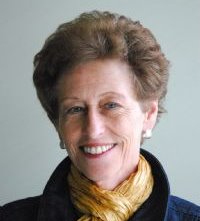

Marni Cappe, FCIP, RPP is the principal consultant and owner of M Cappe Consulting, specializing in local governance and urban policy. With more than 35 years experience as a professional planner, Marni has had a varied career, with experience working for federal, provincial and local governments, as well as business and non-government organizations.
As principal of M Cappe Consulting, she has recently engaged in a variety of projects, in areas relating to: affordable housing, sustainable infrastructure, climate change, immigration strategies, and local governance. Since moving to Toronto in 2010, Marni has volunteered with Toronto Civic Action, the Centre for City Ecology, and the University of Toronto’s mentoring program.
Marni was named the Thomas Plunkett Executive-in-Residence at Queen’s University in 2009-10 and was an Adjunct Professor cross-appointed to the School of Policy Studies and the School of Urban and Regional Planning. In 2012, she taught urban policy at Ryerson School of Urban and Regional Planning.
Marni has a long history of volunteering with the Ontario Professional Planners Institute and the Canadian Institute of Planning. She was President of CIP from 2009-11, and currently sits on the Board of the Canadian Urban Institute. Marni is a passionate advocate for vibrant, healthy, and beautiful cities.
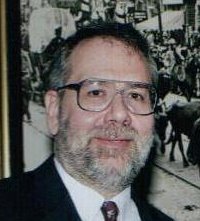

For more than 35 years Walter Jamieson, PhD, FCIP has worked to bridge the academic and consultancy worlds through creativity, innovative and out-of-the-box thinking. His work is based on a sound set of responsible and sustainable values and principles. His activities include: early work in Canada using tourism and heritage resources as tools for community and economic development, research and consultancy work in China, extensive community-based tourism work in Asia, exploring the power of tourism as a tool for economic and social development, and leadership in creating an innovative service curriculum in Thailand.
Through his interdisciplinary education and experience, he brings creative thinking and practice in a number of areas through an integrated approach to analysis and problem-solving. He has shared this development as a consultant, teacher, trainer, author, facilitator and researcher in more than 20 countries. He has been a member of faculty and management at universities in the United States, Canada, Thailand and Japan. His academic experience has been coupled with a wide range of consultancy projects.
Based on a sound understanding of adult learning and development models he has been involved in a wide range of capacity building exercises in many parts of the world. As a professional planner he sees it as his responsibility to transfer knowledge and create learning and enabling environments that ensure public and private sector stakeholders can achieve their full potential.
He has held a number of executive positions in national and international organizations including participation in a wide range of CIP and APPI initiatives.
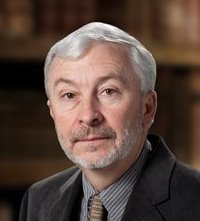

Alex is an urbanist and architect with over 30 years of experience in Canada and abroad. He has worked in consulting as well as government offices on a wide variety of projects and is currently Manager of Urban Design for the City of Brampton, Ontario, a dynamic city of almost 500,000 residents in the Greater Toronto Area. In his position Alex manages the Urban Design section with a staff of 15 urban designers, planners, architects, heritage coordinators with focus on Central Area planning and design, city-wide urban design policy, development design review, heritage preservation, urban design studies and special projects management.
His areas of expertise include downtown revitalization, redevelopment of inner city and suburban areas, sustainable urban forms and transit oriented development, urban design policy, design review and architectural control, heritage integration, process and project management.
Alex is founding member and director/secretary of the Council for Canadian Urbanism (CanU) and founding member and past chair of Ontario Professional Planner’s Institute Urban Design Working Group. He has written articles for Plan Canada and Ontario Planning Journal, organized numerous events, workshops and presentations and is a frequent lecturer on urban design. He was a key contributor to the Ontario Professional Planners Paper and communication campaign on the “Healthy Communities, Sustainable Communities” initiative as well as other key policy papers including the ones on the Planning Act and the Provincial Policy Statement.
Alex has received the OPPI Award in 2007 for his professional work through the years within the planning profession. Alex has been nominated for his achievement in the areas of professional practice as well as teaching and mentoring of planners.
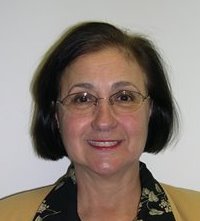

Diana Santo was the Senior Planning Director in the Planning and Environmental Design Group at MMM Group Limited. Over the course of her 45-year career, Diana contributed to various facets of the planning profession, through her diverse roles as a Director at the Ontario MMAH, Vice-Chair of the Ontario Municipal Board, planning consultant and mentor to planning professionals.
Diana’s knowledge and experience with land development and land-use planning policy initiatives were extensive. As the Director of the former Subdivisions Branch and the Official Plans Branch of the Ontario Ministry of Municipal Affairs and Housing, Diana was responsible for the approval of all Official Plans and most plans of subdivision throughout Ontario and provided municipalities with advice in developing plans that reflected both provincial policies and sound development options. She was instrumental in initiating the Ontario Foodland Guideline as Provincial policy, protecting prime agricultural lands and tender fruit growing areas.
During her 20 year position at the Ontario Municipal Board, Diana presided over many contentious and ground-breaking cases. Adjudicating many matters relating to the interpretation and implementation of land-use planning policy with diverse parties with varied and/or opposing public interests. She either case managed or adjudicated many of the commercial competition cases that became known as the “store wars” and decided the development of key sites in Toronto. As part of the adjudication function, she had to weigh the credibility of opinion evidence of professional land-use planners.
During her years as a private consultant at MMM Group Limited, Diana focused on strategies for urban intensification that avoided significant disputes with interested stakeholders.
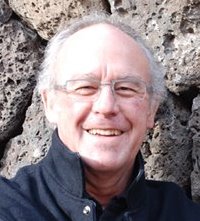

Donald J. Stastny is the personification of an International Member of the Canadian Institute of Planners who has impacted planning and urban design within Canada as well as appropriately representing the ethics and ethos of the Canadian Institute of Planners in the international arena.
Admitted as a member of the Canadian Institute of Planners in 1978, Don has been practicing urban planner and designer, architect, and process facilitator for over thirty years, rebuilding communities physically and culturally. Using design as a comprehensive and strategic tool, he works towards elevating the public’s understanding and expectations of planning and design locally, nationally, and internationally. Don has undertaken a range of projects including the planning of neighborhoods, cities, and regions, as well as the design of museums, multi-family housing, office buildings, historic renovations, and cultural centers. He has developed and managed over fifty national and international processes for competitions, commissions, and plans. He is a masterful facilitator, having worked with international governments, state agencies, city departments, tribal governments, and neighborhood associations to reach consensus and establish “common ground”.
Having co-founded his firm in 1975, Don has set high standards not only for his own work, but has taken equal care in creating environments for other planners and designers to excel. Don has been honored with Fellowship in the American Institute of Certified Planners, the Institute of Urban Design, and the American Institute of Architects.
Don has been recognized for his achievement in professional practice and teaching and mentoring planners.
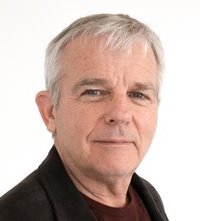

John van Nostrand is the Founding Principal of SvN Architects + Planners (formerly planningAlliance and regionalArchitects). Over the last four decades, John has been the driving force behind the firm’s domestic and international planning and urban design practice. He has worked on major urban development projects throughout southern Ontario, focusing in particular on the Greater Golden Horseshoe. At the same time, he has worked in a wide range of developing countries on the planning, design and construction of new communities ranging in size from 150 to 150,000 persons. He has also directed a number of major mine-related housing projects in Africa, Latin America and Canada. John’s projects include a revitalization plan for the Lawrence Allen neighbourhood in Toronto, a comprehensive regional infrastructure and sustainability plan for the Athabasca Oil Sands in Alberta, neighbourhood plans in Seaton, a new town for the First Nation community of Kashechewan in Northern Ontario, a streetscape study for Dundas Street West in downtown Toronto, an Economic Diversification Plan for Thompson, Manitoba and the competition for the Athletes Village for the 2015 Pan American Games.
John’s work has been recognized with a number of national and international awards, including a World Leadership Award for Town Planning, Daniel Burnham Award for Best Comprehensive Plan (for the Growth Plan for the Greater Golden Horseshoe), and numerous Awards of Excellence from the Canadian Institute of Planners. In 2004, he was awarded the annual Jane Jacobs Award for Ideas That Matter for his work in both developed and developing urban settings.
John has been nominated for his contribution to professional practice and to planning and community research.
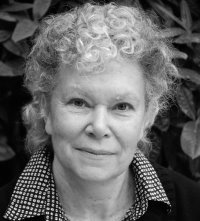

Marta Farevaag is a partner of Phillips Farevaag Smallenberg, a Vancouver-based consulting firm in Planning, Urban Design, and Landscape Architecture with award-winning projects across Canada and internationally. Marta participates in many of the firm’s multidisciplinary urban design projects as the urban planner on the team, often with a role in community consultation and communications. Her areas of expertise include major park and university campus master plans, downtown and waterfront redevelopment, cultural and heritage landscapes, and public realm strategies.
Marta has been active in urban issues including roles as a Director of the Vancouver League organizing free public lectures by noted designers, a member, and Chair in her last year, of the Vancouver City Planning Commission, and a member of the Vancouver Urban Design Panel and the Chinatown Historic Area Planning Committee. She is currently the Chair of the Vancouver Heritage Foundation.
Marta has been recognized for her achievement in professional practice and community and leadership in the profession.
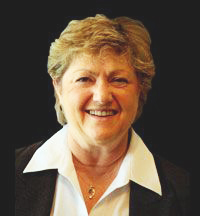

Jean Monteith is an award-winning planning consultant whose career began in 1971. She quickly excelled in the consulting industry before founding Monteith Brown Planning Consultants in 1977. Jean routinely leads planning initiatives offering exceptional skills in project management, public consultation, and policy analysis. Jean is often called upon to provide expert witness testimony at the Ontario Municipal Board for both public and private sector clients. Ms. Monteith holds a Bachelor of Environmental Studies Degree (B.E.S.) with Honours in Urban and Regional Planning from the University of Waterloo. She is a Fellow of the Canadian Institute of Planners, a member of the Ontario Professional Planners Institute, and a member of the Association of Consulting Planners. Jean formerly served on the OPPI Discipline Committee and is a former Chair of the London Advisory Committee on Heritage.
Projects led by Jean have been granted awards of excellence by the New York Upstate Chapter of the American Institute of Planners, the Canadian Institute of Planners and the Ontario Institute of Planners.
Key OMB decisions included determining that water extraction and processing could be controlled with land use planning documents (Grey County), that character of a neighbourhood could be used to ensure proper site plan control (City of London), and that major institutions were not above the planning process particularly with regard to the disposal of land (University of Western / City of London).
In October of 2014, Jean transferred her shares of Monteith Brown to the key employees and is enjoying her employee status. She continues to work on special projects for the firm.
Jean is a Director in her community of Lazy River, Florida where, oddly enough, she also sits on the Documents Review Committee and the Long Range Planning Committee.
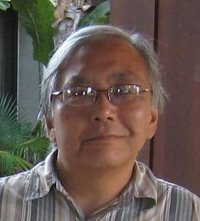

Ron is a Partner and Officer at Dillon Consulting Limited. He is a Senior Project Manager in the Planning and Development Practice with over 25 years of consulting experience with public and sector private sector clients across Canada, the Caribbean Region and the Middle East. Ron is the Sub-sector Leader for the Middle East in Dillon’s International Sector responsible for business development and client relationship management.
His current project work in the Middle East is focussed on the Royal Commission in Jubail, Saudi Arabia and includes program and project management of the Jubail Industrial City Master Plan Update, Jubail Transportation Master Plan, Transportation Microsimulation Modeling Program for Jubail Industrial City and Ras Al Khair Mineral City, Transportation Functional Design Studies, Urban Planning and Design Studies and Area Master Plans for Jubail’s Industrial Areas. Jubail Industrial City contains one of the largest petrochemical complexes of its kind in the world.
Ron is a former President of the Canadian Institute of Planners and Ontario Professional Planners Institute. He also served on the Board of the Commonwealth Association of Planners and is a former Chair of the Canadian Institute of Planners International Affairs Committee.


Mr. Buholzer is a partner in a Vancouver law firm with a preferred area of practice in local government law, where his practice focuses on the law of planning and land use management. He graduated from the School of Community and Regional Planning at the University of British Columbia in 1973 and held planning positions at the Peace River Regional Planning Commission in Alberta, the City of Vancouver, and the Department of Indian Affairs and Northern Development. After graduating from the U.B.C. Faculty of Law and being called to the British Columbia bar in 1991 he joined Young, Anderson, becoming a partner in the firm in 1996.
In addition to his legal practice at Young, Anderson, Bill has written extensively on planning and land use law, beginning with British Columbia Planning Law and Practice, a desk manual for planners published in 2001 by Butterworths (now LexisNexis Canada), updated regularly, and occasionally cited in B.C. court decisions. He is the author of the Planning and Zoning volume of Halsbury’s Laws of Canada, a comprehensive legal encyclopedia found in courthouse, law school and law firm libraries across the country. He has also written a more general work on the legal aspects of local government, entitled Local Government in British Columbia, for the British Columbia Continuing Legal Education Society, and frequently contributes articles on legal topics to the Planning Institute of B.C.’s Planning West. Bill is an adjunct professor at the U.B.C. School of Community and Regional Planning, where he lectures on advanced planning law topics, and an instructor in Simon Fraser University’s City Program in downtown Vancouver. He has been a popular speaker at conferences and seminars on planning and land use topics throughout his legal career, and has mentored several planners during the early years of their careers.
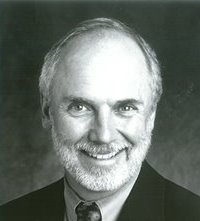

Dan is a founding partner of The Planning Partnership and has worked on the design and development of new towns and various sizes of planned communities for private and public agencies throughout Ontario and the United States over his 35 years of experience. His areas of expertise include community planning, from regional to neighbourhood scale with the application of urban design, sustainable and public health initiatives through facilitation to create meaningful and complete communities while satisfying the needs of the marketplace. Many of his projects have received awards not only from Provincial and National Planning Associations, but from private sector building and development organizations.
Dan also works with various universities, is an adjunct professor at the University of Guelph, has taught Urban Design at the University of Toronto and is the University of Waterloo’s School of Planning 2014-2015 Planner in Residence. He has also authored several articles for the Ontario Planning Journal on topics such as changing energy needs, public health and urban design, our aging society and sustainable innovation in community design.
Dan is a Fellow of the Canadian Institute of Planners, a Board Member with the Council on Canadian Urbansim (CanU) as well as Active Healthy Kids Canada. As the former Vice Chair of the Toronto Design Review Board, he is currently a member of the Mississauga Urban Design Advisory Panel, and co-chairs the Canadian LEED-ND review committee.
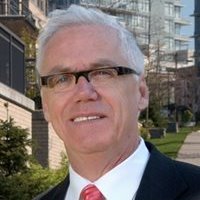

Gordon Harris is an urban planner, development strategist, and real estate market analyst.
As President and CEO of SFU Community Trust, he is also leading the development of UniverCity, an award-winning community on land owned by Simon Fraser University, near Vancouver, British Columbia. The Trust, a global leader in sustainable community development, generates endowment wealth for teaching and research at SFU.
Harris’s early career took him from urban planning into private-sector institutional and retail real estate development. He then spent two decades as an independent consultant, providing urban land planning services, strategic development advice, market intelligence, and economic analysis to public- and private-sector clients across Canada and in Asia, the Middle East, Eastern Europe, and Central America.
A popular lecturer on sustainable development, planning and economic analysis, and on of planning for an aging population, Harris also serves on the National Capital Commission’s Planning, Design and Realty Advisory Committee, the Urban Land Institute advisory board, the Urban Development Institute’s executive committee, and the British Columbia Arts Council. In 2013, Harris received the Queen Elizabeth II Diamond Jubilee Medal in recognition of his contributions to community building in Canada.
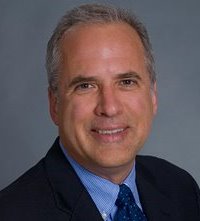

Mark is the Associate Dean (Undergraduate Studies) and an Associate Professor at the School of Planning of the University of Waterloo. He has worked as a practising planner in New Zealand, Calgary, and Ottawa. He became a professor of planning at the University of Waterloo in 1998. Current and former students have commented on the quality of his teaching, his mentorship abilities, and his personal style of relating to faculty, students, and practitioners as colleagues. He is known internationally for his research on indicators, evaluation and monitoring in planning, and served as Chair of the Board of Directors for the Waterloo Community-University Research Alliance (CURA) project funded by the Social Sciences and Humanities Research Council of Canada.
He was President of CIP for 2000–2001, and has been chair of the CIP Policy Committee since 2007. In addition to his considerable contributions to the work of his local affiliate, OPPI, he has contributed to membership courses for the Association of Professional Community Planners of Saskatchewan. He has been nominated for his remarkable career spanning professional practice, teaching and mentorship, research, and service to the profession across Canada and internationally.


Robert has already won many awards for innovation and excellence in the planning field. He is credited with helping the City of Langford, B.C. make its mark in the areas of downtown revitalization, affordable housing, trail planning, and greenways. He is also noted for his award-winning work on Interface Fire Hazard, designed to address the risk of fires in B.C. communities, and on translating LEED Green Building requirement to a Canadian context. He has published and presented numerous papers, mentored planning students, and conducted research in the area of understanding urban and rural sprawl. He is in demand as a speaker on his areas of expertise and helped develop the Municipal Administration Training Institute’s training program outlining the planning profession for local government officials. As an active member of the Planning Institute of B.C., he chaired the conference committee for the Institute’s 2005 conference in Victoria. Rob has been nominated for high achievement in professional practice, teaching, research, and community service.
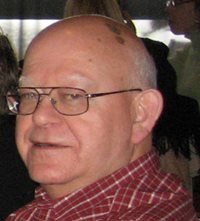

Over his 30-year career as a consultant, Tom has been especially influential in the creation of official community plans and zoning bylaws for dozens of local governments in B.C. and Yukon, and in working collaboratively with First Nations communities on community plans and other consultations. He is manager of planning for the B.C. region at AECOM, and an active member of the Planning Institute of B.C., as well as a member of the American Institute of Certified Planners, the Urban Development Institute, and the Urban Land Institute. Through his work, he has influenced the shape of development across the Province while supporting younger planners, encouraging colleagues, and mentoring councils and communities. Tom has been nominated for his outstanding professional work and his commitment to community service.


Jay Wollenberg is President of Coriolis Consulting Corp., based in Vancouver. With over 40 years of practice as a professional planner and real estate analyst working extensively in western Canada, as well as in the US and internationally, he has been responsible for a wide array of projects for development companies, investors, pension plans, financial institutions, educational institutions, businesses, and all levels of government. His areas of expertise include community planning, land use planning, and urban development policy; growth management and local government fiscal policy; urban development project planning and development approvals; market and financial analysis for development proposals; and public involvement and consultation processes. Jay is an adjunct professor at the UBC School of Community and Regional Planning and an adjunct professor in the UBC Urban Design degree program, where he teaches courses in urban development and market and financial analysis. He has a BSc and Master of City Planning from the Massachusetts Institute of Technology, and is a Fellow of the Canadian Institute of Planners.
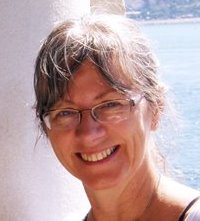

Dr Jill L Grant, FCIP LPP, has been Professor of Planning at Dalhousie University since 2001. Previously she was Professor of Environmental Planning at the Nova Scotia College of Art and Design (now NSCAD University). She earned a Masters and a PhD in Regional Planning and Resource Development from the University of Waterloo.
In being named a Fellow of the Institute, Jill was recognized for her contributions to education, research, and the profession. Over the decades Jill has taught hundreds of students who went on to become planning practitioners. She is known for encouraging critical thinking, extensive reading, and good communication skills. She has contributed to the profession by serving on several CIP committees over the years, being program chair for the 2003 conference in Halifax, and serving on the editorial board of Plan Canada for six years (including four as chair). She is a regular contributor to Plan Canada.
Through the years Jill has focussed her research on understanding the connections and the gaps between theory and practice. She has interviewed and surveyed planning practitioners from across the country to gain a better sense of the challenges and opportunities of planning practice. Her research has provided valuable insight into the planning and design of residential environments, urban development practices and processes, and neighbourhood change. She also has published on the history of planning, illuminating the legacy of practice in Nova Scotia.


Linda retired as Deputy Minister, Local Government, at the end of 2013 after 8 years at the Legislative Building. Prior to her appointment as Deputy Minister in 2005, she served as Assistant Deputy Minister in both the Urban Strategic and Community Planning Divisions of that Department. Linda joined the Province as a policy analyst in 1993 and held a number of positions within the Departments of Housing, until moving to Intergovernmental Affairs (Local Government) in 2001. Linda holds a Masters in City Planning from the University of Manitoba and an undergraduate degree in Human Ecology. She is an Adjunct Professor at the University of Manitoba.


Michael is a Vancouver-based architect, planner, real estate consultant and property developer with four decade’s experience in the public, private, and institutional sectors. He also serves on the Adjunct Faculty of the SFU Centre for Sustainable Community Development. Prior to establishing his own firm, he was President of the SFU Community Trust, Vice-President Narod Developments, and an official with CMHC. Michael is a past president of the Urban Development Institute and has been honoured as a Life Member of the Architectural Institute of BC and Fellow of the Canadian Institute of Planners.


Nicholas (Nick) Tunnacliffe came to Canada in 1968 after degrees from Cambridge and Liverpool Universities. He first worked for the Ontario Ministry of Municipal Affairs in Toronto, where he cut his teeth on Official Plans and Subdivision Approval.
In 1970 he moved to Ottawa to join the newly formed Regional Municipality of Ottawa-Carleton where he worked on the first Regional Official Plan, which was adopted in 1974. In January 1975 he joined the Ministry of State of Urban Affairs in the unit responsible for railway relocation in municipalities across Canada. He was responsible for projects in almost every Province from Nova Scotia to British Columbia.
In 1978 he returned to Ottawa-Carleton where he was responsible for long range planning which included a second official plan, a housing policy statement, environmental planning and was part of the team which implemented Ottawa-Carleton’s innovative grade separated bus rapid transit system.
In 1988 he was made Planning Commissioner of Ottawa-Carleton and remained in that position until the municipality was dissolved in 2010. He then joined the Region of Peel as Planning Commissioner until his retirement in 2010, where he contributed both to Peel’s long range planning and the long range and transportation planning in the Greater Toronto Area.
He is a strong supporter of the Regional Planning Commissioners group in Ontario, which brings together Planners from all major municipalities in Ontario to research planning issues.
He is particularly interested in long range policy planning, the integration of land use and transportation planning, environmental planning including how planning can respond to the impacts of climate change, social planning, especially the provision of affordable housing and the creation of healthy communities, and the management of Canadian municipalities.
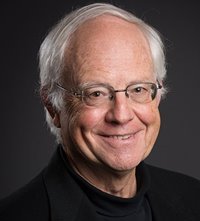

Robert Lehman is the President of Lehman & Associates and a founding partner of Meridian Planning Consultants, the Planning Partnership and Metropolitan Knowledge International. Working initially for the City of Toronto he became a consultant in 1974 as one of the 30 initial staff of the IBI Group. He established his own practice in 1980.
Bob’s has written over 100 Official Plans, policy guidelines, zoning by-laws and Secondary Plans for municipalities and private clients throughout Canada. He Has been involved as an expert witness in about 500 OMB, Court and other tribunal proceedings and acted as project director for major research and policy studies. His work has focused on the land use – transportation interface.
Twice planner in residence at the University of Waterloo School of Planning, Bob is the author of the Zoning Trilogy, a bestseller of the American Planning Association Bookstore. Bob has received two Canadian Institute of Planners Honour Awards for Planning Excellence and 8 provincial planning excellence awards. He served as the Chair of the College of Fellows from 2010 to 2014. His interests extend beyond planning as he has been involved with seven start-ups, six of which remain as successful companies.
Bob was born in Bogata, Columbia and has lived in four Canadian provinces. His two sons also trained as planners but decided ultimately to follow the dark side – politics and finance.


Andrea was an urban planner and partner of Urban Strategies Inc. Through her extensive planning experience, she has dealt with a full range of planning, policy and development issues. This includes land use policy issues at all levels, from site to region and in many jurisdictions within Canada and internationally.
Andrea often led interdisciplinary teams in the achievement of community or corporate master plans and the elaboration of strategic, effective policy. Her focus was to manage the synthesis of public and private interests to achieving outcomes that meet both public and private objectives. Her approach was to bring all interests together from the inception of any assignment to stimulate discussion and ultimately forge consensus.
Andrea would frequently lecture and present in a variety of venues including universities, conferences and industry events.
Andrea capped her long career of service by becoming the President of the Canadian Institute of Planners from 2011 to 2013.
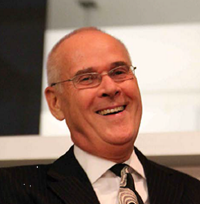

Born in England in 1944, Tony earned an MA in Economic Science from Aberdeen University in 1969 and two years later an MS in Regional Planning from Wisconsin. Tony came to UBC in 1971 as a founding member of the Westwater Research Centre. In 1982 he became a faculty member in the School of Community and Regional Planning (SCARP) and later in the Institute for Resources, Environment and Sustainability. From 1999 to 2006 he was the Director of SCARP. He retired from teaching at UBC the end of 2011 but remains as Professor Emeritus of Community and Regional Planning.
Tony’s research and teaching have had three foci: policies and institutional arrangements for natural resources planning and management with particular emphasis on water; negotiation and mediation in sustainability governance; and the planner for tomorrow – what should be her/his knowledge, skills and attitudes so as to be more successful in turning economic, environmental and social sustainability ideas into action.
During more than three decades, he has undertaken research on the design of policies and institutional arrangements for waterfront development; pollution control; watershed, estuary and coastal zone management; development of fishery-mariculture industries; conflicts between the forest industry, fisheries, and recreation; dam building and operations; and offshore oil and gas development. Case studies have focused on Canada’s West Coast, Fraser River Basin, Greater Vancouver and, internationally, Australia and Europe. Developing the use of negotiation and mediation and design of sustainability governance have been continuing interests in this research.
He was a founding member of the BC Round Table on Environment and Economy (1990-94) and the inaugural Chair of the Fraser Basin Management Board (1992-94). During the late 1990s he was a facilitator/mediator for global multi-stakeholder dialogues for the World Commission on Dams and the World Bank’s forestry policy.
His leadership and passion for planning education was always evident. It was noted at his retirement party that “We can only dream of having the kind of integrity, poise, dedication, optimism and inclusive spirit that he brought to work, every day, for 40 years.” His contributions have been recognized by a Killam Faculty Research Fellowship (1988), the University Teaching Prize (1995), the 2000 Professional Award of the Canadian Water Resources Association of BC, and election as a Fellow of the Canadian Institute of Planners (2007).


Robert (Bob) Caldwell pursued excellence in Municipal planning in two Canadian provinces and in six municipal jurisdictions over a career spanning more than 35 years.
Bob has always “pushed the envelope”, challenging himself and his colleges to incorporate best practices and leading edge methods in their work. This is obvious by the number of awards of excellence he and his staff at the City of Edmonton attained over his career with that city.
Bob’s experience in municipal planning started with a short employment as Assistant Clerk and Treasurer in a small Ontario town. In that position, his first, he was key in setting up a Planning Board for the area surrounding the municipality. That experience was useful when he moved into current planning and then to preparing and implementing plans and later into management positions in planning. His employment took him from small town to small city planning to large cities and regional planning in Ontario before moving west to Edmonton.
In Edmonton, the opportunities of a large city department that experienced boom and bust cycles twice in his tenure, allowed him to innovate and mentor his planning colleges to try new planning methods and prepare award winning plans and projects. For almost 30 years, Bob’s influence on the planning of the city made the Edmonton Planning & Development Department a leader in planning initiatives.
A strong supporter of professionalism in planning, Bob convinced his Department to require planning staff to be CIP members, with dues paid by the Department. He also encouraged staff involvement in CIP, both provincially and nationally. He attended, presented at and organized CIP events and also was personally active in the American Planning Association conferences and events.
As Manager of Planning and Policy Services and Chairman of the Subdivision Authority, Bob played a pivotal role in the planning and development of the city of Edmonton for many years. Many professional Planners developed their skills and methods of planning while working with him. Several awards, including three CIP Awards of Excellence, two International Downtown Association Awards of Merit and Heritage Canada’s 1996 Achievement Award were the result of his leadership and collaboration with his staff.
Bob completed his planning career doing campus planning as Planning Director at the University of Alberta and also providing private planning consulting services to municipalities in the Edmonton area.


Robert Millward is the president of R.E. Millward & Associates Ltd., an urban planning consultancy he founded in 1997. Prior to starting R.E. Millward & Associates, Bob spent three decades as a public servant in both New York and Toronto. Bob began his career New York City with the City Planning Department and worked as the Deputy Director of Brooklyn Planning and Director of the Staten Island Planning Office.
Bob was offered what he thought would be a short term position with the Toronto Housing Department, which has led to a distinguished career at the City. First, as the Director of Planning, he helped to coordinate the development and implementation of the St. Lawrence Neighbourhood, one of the most successful mixed use and mixed income communities in the City and in North America. Bob then served in the Planning Department as the Director of Central Core and Waterfront for five years before taking on the role of the Commissioner of Planning and Development for the (former) City of Toronto between 1987 and 1996. As Commissioner, he was actively involved in all aspects of policy formulation, project management and economic development. During his tenure, Bob led the development of innovative planning policies including the strategic directions and implementation of the 1991 Official Plan for the City, the re-write of the City’s Zoning Bylaw and the reinvestment effort in King-Spadina and King-Parliament. These new directions resulted in Toronto being highlighted as Fortune Magazine’s best international city to live in and work in 1996.
In 1997, Bob left after over twenty years with the City to take on a role as a private consultant, where he has gained extensive experience working on projects with public sector clients, involving a variety of stakeholders and public agencies. Past projects include work with the City of Toronto’s Cultural Affairs Unit, the City of Toronto’s Planning Division on its Official Plan review and area studies, and with a number of Waterfront agencies on large scale planning projects.
Bob has acted as Chair of the Toronto Board of Trade’s Planning Committee, a member of the Waterfront Task Force, and the Infrastructure Committee. In 2013, he served as the Executive Director of the Urban Land Institute’s Toronto District Council after being a member of the Institute for nearly 20 years. He has also been a long time member of BILD, Ontario Professional Planners Institute and the Canadian Institute of Planners.


David Palubeski, elected as a Fellow of the Canadian Institute of Planners in 2006, graduated from the University of Waterloo in Urban and Regional Planning in 1973. David’s career began in government, firstly with Parks Canada’s western region parks’ townsite planning office in Calgary, as a planner with Manitoba Municipal Affairs, district planner with the City of Winnipeg and in 1979 moved into private sector consulting—where he was engaged in a diverse practice serving the private sector, government, utilities and non-profit agencies.
David was President of Lombard North Group (1984) Ltd, Planners, Landscape Architects and Project Managers, based in Winnipeg, with affiliated offices in Calgary and Victoria. David concurrently served as the Managing Partner of Terrascape Developments Inc. a land holding and development syndicate applying sustainable development principles to its new neighbourhood/ community mixed use residential and commercial developments. One project, Waterford Green, a new neighbourhood in Winnipeg, has received recognition by the Seven Oaks Wellness Centre Foundation as a healthy community focused on creating interconnected, walkable neighbourhoods.
David’s breadth of professional practice spanned over 40 years and included co-ordination of urban design initiatives; regional and urban development strategies; financial and socio-economic impact assessments for major development projects; feasibility assessment and project management of industrial, large format commercial and mixed use residential developments; numerous community and neighbourhood plans; and coordination of public consultation initiatives.
David was a Past President of both the Manitoba Professional Planners Institute (1997-98) and the Canadian Institute of Planners (2001-03). Over 2003-11, David coordinated the CIP- China Planning Advisory Services. David served as Chair of the City of Winnipeg Downtown Design Review Advisory Board; as a member of the Montreal Design Awards Review Committee and as a member of the Prime Minister’s Advisory Council on the Environment and the Economy.
In addition to professional activities, David has served community organizations as a member of the Winnipeg Grace Hospital Board of Management; Chair of the Grace Hospital Building and Property Committee and the Winnipeg Chamber of Commerce, serving on a number of committees including Advisory Committee on Aboriginal Affairs and Advisory Committee on Finance, Civic and Provincial Affairs.
Dave brought an enlightened passion to the profession and CIP in particular. His ability to see opportunities in the face of challenges was a key ingredient to his successful leadership of MPPI and CIP. Dave was a pragmatist and someone who could bring focus to a discussion by listening carefully, distilling the issues and synthesizing ideas. His love for life was infectious and his commitment to his profession and friends was unmatched. His legacy is real in the form of CIP’s work in China, in CIP’s much strengthened relationship with Quebec and his participation with a small group of Fellows who made sure that CIP would come out of 2015 as a more resilient and vibrant national planning organization.
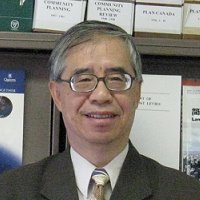

Hok-Lin was educated in Hong Kong, the US and UK before coming to the Queen’s University School of Urban and Regional Planning in 1979. He retired as Director and Professor Emeritus of the School in 2009. His Land Use Planning Made Plain (1989, 2003) is a standard text and reference in Canada and many other parts of the world. He was seconded to the Federal Treasury Board (1994) to help set up the Infrastructure Works Office, and created the National Executive Forum on Public Property (1998), the Executive Seminars on Corporate and Investment Real Estate (2005), and the Asia-Pacific Ambassadors’ Forum (2003).
Hok-Lin has been doing teaching and advising in China since 1985, in the areas of city planning, land management, public policy analysis, and comparative cultural studies, and contributing to the building of relationship between China and Canada. In 2002, he was awarded the Friendship Award by China’s State Council, the highest award for a foreign expert.
Currently, Hok-Lin does two lecture tours every year in China, and is also advisor to the Ministry of Land and Resources, Ministry of Housing and Rural and Urban Construction, and the State Council Development Research Center. His book The Cultural DNA of Western Civilization (2014) was a bestseller last year and selected as one of the 100 Best Books for 2014 in China. He is currently working on a policy evaluation instrument for the Chinese government, and the development of the Homo-urbanicus concept (2012, 2014) as a building block toward a general planning theory.
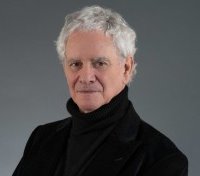

Philip Weinstein was the founding partner of The Planning Partnership. Philip has been responsible for innumerable collaborative design projects, at all scales, during his 52 years of experience, including numerous new towns and communities, university and school campus planning, major parks and marinas, amusement areas, zoos, residential, commercial, institutional, office and industrial site planning in Canada, the United States, the Caribbean, Russia and China.
His projects have incorporated new approaches to community design, which consider urban design as much a part of the development as appropriate and functional land use.
Over the five decades of his career, Philip has been involved in a number of award winning projects and international projects, most recently including the Durham College/University of Ontario Institute of Technology Master Plan, and the Haikou East Coast Regional Master Plan in China.
Philip remains actively involved in the planning and urban design industry as an associate advisor to SGL planning & design.


Stephen Jewczyk is one of the best known planners in Newfoundland and Labrador. He has had a long career in the public sector, beginning in Ontario, then moving to St. John’s, NL, in 1977 to become the Town Planner for the St. John’s Metropolitan Area Board (Metro Board). In 1989 he became the City Planner for the City of Mount Pearl. He now serves as their Director of Planning and Economic Development.
Over the years, he has been one of the most high-profile planners in Newfoundland and Labrador, including terms as the President of the Atlantic Planners Institute (1983-85) and the President of the Canadian Institute of Planners (1991-92).
Stephen guided the Metro Board Municipal Plan, which focused the growth of a ring of unincorporated communities surrounding the capital city of St. John’s. Many Metro Board communities grew large enough to become their own municipalities.
When Stephen moved to the City of Mount Pearl in 1989, he joined a fast-growing municipality which had been raised from Town to City status the previous year, becoming Newfoundland and Labrador’s second most populous municipality (behind St. John’s and ahead of Corner Brook). The 1990s were a period of significant growth for Mount Pearl. Stephen advocated for sensible planned growth, including residential and commercial intensification, building on the planning work done by the Newfoundland and Labrador Housing Corporation.
He has been a champion for the planning profession, locally with API’s Newfoundland and Labrador Branch, regionally with API, and nationally with CIP. He has advocated for good planning practice to Metro Board, to the City Council in Mount Pearl, and to the Province through the Department of Municipal Affairs.
Stephen’s approach to planning work is marked by professionalism, fairness, and consultation, with an openness to new ideas and a desire to keep abreast of best practices and trends. This approach to his work has helped raise the profile of the profession and the Institute. Over the years, he has had extensive contact with municipal and provincial politicians, cabinet ministers, mayors, municipal colleagues in other departments, professional colleagues in other municipalities, property developers, architects, engineers, and residents. He has a willingness to listen and a desire to promote the benefits of planning.
Stephen organized Mount Pearl’s Urban Design Awards, given for the first time in 2005. These recognize good design in residential and commercial development. As a result of his efforts, Mount Pearl is noted as a city committed to long-range sustainable planning and to community participation in the planning process.
In his personal life, he is involved with the Stella Burry Corporation on assisted housing, employment programs, and counselling for people facing significant financial or health challenges. He is also active with Cochrane Street United Church as well as with sports and cultural groups, including minor hockey, ball hockey, swimming, and Scouts Canada.


Dr. Ann McAfee graduated from UBC with a Doctorate in City Planning and Urban Land Economics. From 1974 to 2006, Ann worked for the City of Vancouver retiring as Co-Director of Planning. She was responsible for Vancouver’s Housing Programs from 1974-1988 and from 1994 – 2006 guided the award winning process leading to adoption of “CityPlan” – Vancouver’s first city-wide plan since 1930.
In 2006, Ann retired from Vancouver City and established City Choices Consulting. She has advised cities in Sweden, New Zealand, Australia, China, Philippines, Ukraine, and Ethiopia. This includes projects funded by the World Bank and various Canadian agencies.
Ann was Canadian Project Manager for an award winning two-year study on Community Development in Shanghai, participated on the American Planning Association Sustaining Places Task Force, and recently advised the City of Auckland on their award winning Unitary Plan. She is an Adjunct Professor of Planning at UBC, teaching a course in Strategic Planning.
Ann has been recognized by a variety of organizations including Lambda Alpha International (Honorary Land Economics Society), International Downtown Association, Urban Development Institute, and the Canadian Housing Design Council for her contributions to affordable housing, strategic planning, and innovative public processes. In 2007, Ann received the Kevin Lynch Award for Distinguished Planning Practice from the Massachusetts Institute of Technology.
The citation for Ann’s induction as a FCIP recognized her
“vast knowledge and great passion for planning policy and for improving the quality of life for all segments of society in Canada and abroad. She has been instrumental in convincing people to develop radical planning approaches. Ann’s significant and diverse achievements and contributions as a practitioner, citizen and teacher make her a wonderful ambassador for our profession, whether on the national or international stage.”
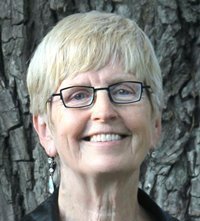

Beate Bowron is the President of her company Beate Bowron Etcetera with over 35 years of experience in the ever-evolving field of professional planning. Her motto if they tell you no, ask how has stood her in good stead in achieving results in planning for better municipal governance, sustainable cities, climate change adaptation and community economic development.
Beate’s practice is committed to involving the public in the planning issues that affect their lives and resolving conflicts and building consensus for better decision-making. Throughout her career she has been able to apply her professional values and principles in Canada, including the Territory of Nunavut, and internationally in China, South Africa, Guyana, Ukraine, Ethiopia and The Philippines.
Beate is a past Chair of Conflict Resolution Canada, a former Community Planning Director for the City of Toronto’s South District (including the Downtown and the Waterfront) and a Senior Associate of the Canadian Urban Institute.


Glenn is a passionate urban thinker and stimulator of important ideas both within and outside of the profession with more than 25 years of experience as a planner with the private sector, local and regional government, and nongovernmental organizations. As the editor of Ontario Planning Journal for the past 20 years, Glenn regularly challenges the way Ontario planners perceive their role and the issues they address. Through his varied work at the Canadian Urban Institute, including the Canadian Brownfields Network, and the countless hours he spends as an inspirational mentor, a public speaker and opinion maker, Glenn advances the profile of our profession.
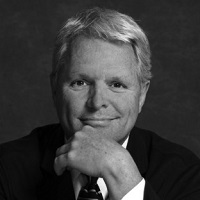

Larry Beasley, BA, MA, LLD (Hon), is the retired Co-Director of Planning for the City of Vancouver. He is now the “Distinguished Practice Professor of Planning” at the University of British Columbia and the founding principal of Beasley and Associates, an international planning consultancy. In his 30 years of civic service, Mr. Beasley was a neighbourhood planner, manager for transformation of Vancouver’s inner city and the approval authority for private development. Since leaving government, among his special commitments, he is the Senior Advisor on Urban Design for Dallas, Texas (where he founded the City Design Studio within the City government), Special Advisor on Planning for the Emirate of Abu Dhabi in the United Arab Emirates (where he founded the planning agency called the Urban Planning Council) and a Member of the International Economic Development Advisory Board of Rotterdam in The Netherlands. He has long been Chair of the Advisory Committee on Planning, Design and Reality for the National Capital Commission in Ottawa. He lectures extensively and advises governments and the private sector in Canada and around the world – recent work includes new city plans and design of a new national capital in Abu Dhabi, an award-winning plan for the expansion of Moscow, a strategic organizational plan for the Planning Division in Toronto, an influential scheme for the removal of obsolete highways infrastructure in Vancouver, and curation of a competition to connect Downtown Dallas to the Trinity River. He has been awarded several honorary degrees and many awards, including the Kevin Lynch Prize from M.I.T. and the Advocate for Architecture Award from the Royal Architectural Institute of Canada. He is a Member of the Order of Canada and has received the Queen Elizabeth II Diamond Jubilee Metal.
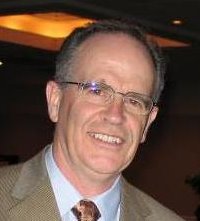

Bill commenced his planning career in 1970 as a junior planner with the Red Deer Regional Planning Commission. His appreciation for the diverse environments of the region and its many municipalities, including small villages, a growing dynamic city and diverse rural counties, enticed Bill to remain in Central Alberta through his entire career. In 1989 he became the Director of the Regional Planning Commission, a position he held until 1995 when the Provincial Government disbanded the regional planning system. To provide seamless municipal planning support, with the cooperation of 21 municipalities Bill established and served as Director of Parkland Community Planning Services, essentially being a multi-municipal planning agency to provide the needed range of planning services to member municipalities, but also entrepreneurial in nature to serve far-ranging non-member municipalities and private sector clients.
Bill contributed often to the affairs of the Alberta Association, Canadian Institute of Planners, including as secretary then president in the 1970s. Subsequently he served for many years as chairman of the Awards Committee and returning officer for annual elections. In 1990 he was Chairman of the National CIP Planning Conference in Banff.
His role in the 1980’s on various committees related to the flow management of the Red Deer River further sparked his interest in water related matters throughout the region. When water issues arose to the fore in the early 2000’s Bill was appointed as a member of the Red Deer River Basin Advisory Committee which made recommendations to the Province on water management in southern Alberta. Recognizing the need to better relate water management and land use planning, Bill was instrumental in the establishment in 2005 of the Red Deer River Watershed Alliance, and remained on its Board of Directors for many years.
When he retired from Parkland Community Planning Services in 2005, Bill began a private consulting practice. He assisted numerous communities with various policy plans, conceptual site plans and land use bylaws, as well as individual landowners with site development plans, and served as an advisor to the Red Deer River Municipal Users Group. As part of his oversees mission service, he prepared a concept plan for an orphaned children’s village in Tanzania and a school/residential site in Haiti.
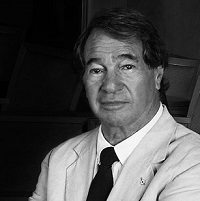

Jack Diamond has practiced architecture since 1968 and is recognized for his astute interpretation of site and context across a wide range of award-winning building types, from civic and residential to performing arts and academic projects. Previous work includes the Four Seasons Centre for the Performing Arts in Toronto, the Israeli Foreign Ministry, Southbrook Winery in Niagara, Ontario and the Life Sciences Complex at McGill University in Montreal. Current project include the New Mariinsky Theatre in St. Petersburg, Russia and a private residence in Switzerland.
He is a Royal Architectural Institute of Canada Gold Medalist and an Honourary Fellow of the American Institute of Architects. He is a member of the Order of Ontario and an Officer of the Order of Canada.


Barbara Rahder is originally from the San Francisco Bay Area. She came to Canada via Portland, Oregon where she earned a BSc in Psychology at Portland State University. She immigrated to Canada in 1974 and completed her MSc in 1977 and her PhD in 1985, both in Urban & Regional Planning at the University of Toronto. Her dissertation examined the origins of residential segregation by class in 19th century Toronto. Her professional interests have remained focused on issues of social equity and environmental justice throughout her career.
During the late 1980s and early 1990s, Barbara worked as the lead consultant on a number of community planning and social research projects in Toronto and surrounding areas. Rahder & Associates worked with the City of Toronto, the Province of Ontario, and an extensive array of non-profit organizations working with women, immigrants and refugees, Indigenous people, people with disabilities, seniors, and victims of violence and abuse. She also taught part-time at the University of Toronto, York, Ryerson and Queens Universities during this period.
In 1993, Barbara joined the Faculty of Environmental Studies (FES) at York University and in 1994 became the Coordinator of the Planning Programs there. She taught a variety of courses, most notably a Bioregional Planning Workshop and Planning Theory. Over the next nine years in this role, the program expanded from roughly 10-12 planning students per year to its current intake of around 40 MES planning students per year. In 2001, she became the Graduate Program Director in FES and helped lead a major reorganization and expansion of the MES program. In 2007, she was appointed Interim Dean of the Faculty, with appointment as Dean the following year. She served as Dean for 5 years. During her 20+ years at York she published more than 40 planning articles and reports, and supervised the research of more than 50 MES and PhD students.
Barbara has also taught Planning Theory at the University of Moratuwa in Sri Lanka where she has been a Visiting Professor three times in the Department of Town and Country Planning.
Barbara is also the coordinator for the Toronto chapter of Planners Network. In this capacity she was the lead organizer of the Planners Network conference held at Ryerson University in Toronto in June 2000. PN-Toronto chapter events are ongoing.
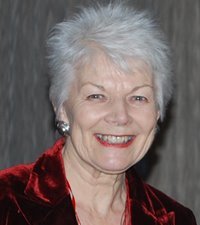

Beth Moore Milroy, B.A. (McGill), M.Urbanisme (U. de Montréal), PhD (U. British Columbia), FCIP is Professor Emerita of the School of Urban and Regional Planning at Ryerson University where she was a past director of the School. Earlier, she headed the graduate planning program at the University of Waterloo. Despite a relatively short career in the field, she has taught and mentored hundreds of undergraduate, masters, and doctoral planning students. Actually, it wasn’t her intention to be an urban planner or a professor. Both happened because of a series of chance encounters, life circumstances, travel, and residing in various places in and out of Canada that focused her curiosity on why some settlements thrive and others don’t. She was gradually drawn ever deeper into the field, inspired along the way by many, including how Fellows such as Jeanne Wolfe, Len Gertler, and John van Nostrand approached their work.
Beth has published many journal articles, reports, and books on connections among planning, gender, and ethnicity; on housing; and on core area redevelopment. She worked on social housing projects in Ottawa and Waterloo, and lobbied to retain strong national and provincial housing programs. She has chaired or otherwise participated on: Fellows selection, scholarship, planning awards, and conference committees for CIP and OPPI; editorial boards of journals; awards and scholarship committees for CMHC, Canadian and foreign universities, and the major Canadian, Québec, and British funders of academic planning and geographic research. At conferences and elsewhere, she seeks to promote understanding between practicing and academic planners, and between anglophone and francophone planning approaches. For the record, Beth was apparently the first Canadian to earn both a master’s and a doctoral degree in planning from Canadian universities. Her current research includes continuing a project Jeanne Wolfe started to locate, describe, and explain the host of utopian settlements in Canada prior to 1945.
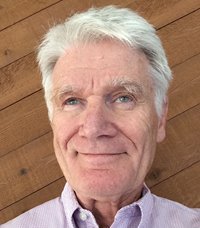

Erik Karlsen began his planning career in 1968, became a member of Planning Institute of British Columbia and the Town Planning Institute of Canada in 1972 and was elected as a CIP Fellow in 2004.
Erik has held professional and management roles in government organizations including the Lower Mainland Regional Planning Board, the Greater Vancouver Regional District, Parks Canada, the BC Environment and Land Use Secretariat, and the BC Ministry of Municipal Affairs. In these roles, he engaged in developing integrated approaches to land use planning and resource management/environmental protection with emphasis on community/regionally-based interests.
Erik has also been a consultant, an Associate Faculty member in the Masters of Environment and Management program at Royal Roads University, and the Chair and CEO of British Columbia’s Agricultural Land Commission.
Erik received public service awards from the Province of British Columbia (for partnership and change management) and from the Fraser Basin Council (for leadership in sustainable development). In 2003, he was awarded a Commemorative Medal for the Golden Jubilee of Her Majesty Queen Elizabeth from the Honourable Iona Campagnolo, Lieutenant Governor of British Columbia (for his community service in environment and sustainability).
Throughout his career Erik mentored young (and not so young) professionals (and some elected officials too!). He maintained contact with former colleagues to share knowledge and experience on approaches to governance for sustainability, focusing on best practices for making and implementing decisions in complex adaptive situations.


After graduating from the (then) Technical University of Nova Scotia (now Dalhousie) Masters of Urban and Rural Planning Program, I moved to Newfoundland where I have lived and worked for my entire career. After three decades, I’m still here and have had the pleasure of travelling to most of the province’s communities, whether for work, or as a volunteer judge for a provincial Communities in Bloom program. I’ve moved several times between private sector consulting and the public sector including the municipal and provincial levels – sometimes for family considerations, sometimes to take on new challenges. One of the most rewarding aspects of my career was being asked to become the Director of Planning for the Town of Conception Bay South, with a mandate to establish their first planning department, a position I held for 7 years. Today, I work with CBCL Limited, an engineering and environmental firm based in Atlantic Canada.
In small economies, one is fortunate as a planner to work on a wide variety of projects. I’ve had the pleasure of working with experienced and creative people on everything from tourism and economic development plans, to environmental assessments, municipal and regional plans and urban design studies. I enjoy mentoring young planners and watching them as they pursue their own career paths.


After graduating from the University of Toronto in 1964, Bruce started his career at the City of Windsor, Ontario. In 1969, he and his wife Brenda moved to Hawaii where Bruce initially worked for the City and County of Honolulu in various capacities. He later accepted a position with a land development firm for several years, and then returned to the City and County of Honolulu as Deputy Director.
Moving to Edmonton in 1980, Bruce served as the General Manager of the Planning and Development Department for approximately 15 years. In 2005, he started his own consulting firm and did extensive work with the young planners with the Regional Municipality of Wood Buffalo Planning Department.
Bruce has always cherished the role of educator and has been a mentor to many young planners and planning managers. Professionally, writing and presentation skills were his area of pride and passion.
In community planning, the Department’s efforts were recognized in 1995 with an Award of Excellence from CIP for the Boyle Street/McCauley Area Redevelopment Plan. Bruce’s leadership in Strategic Planning also resulted in an Award of Excellence, this one in 1999 for Plan Edmonton: A Plan and A Process, Edmonton’s strategic Municipal Development Plan.
In 1994, Bruce had the opportunity to chair the host Committee for the Canadian Institute of Planners National Conference. He is also one of the founders and leaders of the International Winter Cities Committee, which promotes good planning, appropriate technology and innovation in the cold-climate cities of the world.
Bruce has accomplished what many of us in the field only dream of—leading a major planning department for 15 years. He has been a distinguished representative of the profession to other managers, professionals, elected officials and stakeholders with whom he has worked.


Wendy is a Senior Principal/Executive Vice-President with WND Associates Limited (formerly Walker, Nott, Dragicevic Associates) and began her career with the firm upon graduation from the University of Waterloo in 1977. The challenges and diversity associated with a land use planning consulting practice continue to maintain Wendy’s enthusiasm for the profession.
With over 35 years experience, Wendy’s accomplishments in the land development realm are extensive and exemplified in her comprehensively planned, small- and large-scale communities and neighbourhoods and development projects for a wide range of residential, commercial, institutional and employment uses. Wendy is passionate about the re-generation of cities and works on numerous redevelopment and intensification projects in urban centres, such as Toronto. Wendy is also well known to municipalities across southern Ontario for her ability to construct innovative policy, zoning and guideline documents.
Throughout her career, Wendy has applied her substantial land use planning experience and knowledge representing a wide range of stakeholders and clients in various Ontario Municipal Board and other proceedings.
Over the years, Wendy has participated in various Ontario Professional Planners Institute initiatives including the public policy committee, OMB liaison committee, various conference committees and co-chair of the CIP/OPPI Toronto conference in 2004.
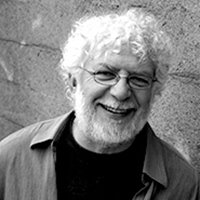

Frank holds a Bachelor of Architecture from the University of Toronto and a Master of Architecture in Urban Design from Harvard University. His experience includes working as an architect with WZMH in Toronto and as Director of Downtown Planning for the City of Calgary. Since 1984 he has been a professor in the Faculty of Architecture & Planning at Dalhousie where he has also held the positions of Head of the Planning Department and Dean of the Faculty. Frank has been a member of the National Capital Commission Advisory Committee on Planning and Real Asset Management and is currently a member of HRM’s Urban Design Task Force.


Gerry Couture, FCIP is President of Urban Edge Consulting, a company he established in 2006. He brings to his clients over 25 years of experience in long-range development planning, visioning, public consultation, public sector management, governance practices, performance management, and service-based reporting.
Prior to establishing Urban Edge, Mr. Couture held the position of Senior Consultant in Strategic Management at the City of Winnipeg where he provided professional planning and policy advice to the Chief Administrative Officer. Over his 19 years at the City of Winnipeg, he worked in various capacities from urban design to long range development planning to strategic planning to corporate planning. Among other projects, Mr. Couture was responsible for developing the City’s long range policy plan, Plan Winnipeg: 2020 Vision, and the City’s award winning downtown plan, CentrePlan. He was educated at the University of Manitoba, graduating with a Bachelor’s degree in Environmental Studies (1981) and a Master’s degree in City Planning (1986).
Apart from his practice, Gerry is an adjunct professor in the City Planning Department at the University of Manitoba and has taught as well in the Environmental Studies Department at the University of Winnipeg. He also provides mentorship in the Urban and Regional Planning Department at Ryerson University in Toronto. Over the years he has been involved extensively in the planning profession including two terms as president of MPPI and a term as president of CIP. Combined, this accounts for more than twenty years of service.


John started his planning career with the City of Edmonton in 1976 and has been a consultant since 1979, first with his own firm, then with integrated consulting firms in Alberta and British Columbia—primarily as a Principal in Stantec’s Vancouver office. His career includes experience in community planning and design projects across Western and Northern Canada, from planning entire communities through regional and municipal policy planning to site specific design and implementation. John’s planning work has proven his ability to marry community, planning, environmental, development, and engineering concerns in a way that instills confidence. He believes that great plans come from the integration of expertise, collaboration, fresh perspectives, and the search for creative solutions.
A graduate of the Universities of Alberta and Toronto, he is a member of PIBC, APPI, SPPI and the American Institute of Certified Planners. John is a Past President of CIP and APPI and has been Chair of the National Membership Committee, Chair of the Fellows Selection Committee and Chair of CIP’s College of Fellows. He is a longstanding member of PIBC’s Professional Practice Review Committee. He has presented at conferences and universities and led workshops on ethics for planners, creativity, and other aspects of professional planning. He taught recreation at the University of Alberta. He published many times in Plan Canada as well as provincial periodicals. John has received numerous planning awards from CIP, APPI, City of Edmonton, Alberta Municipal Affairs and other organizations.
Early in his career while flying over the Makenzie Delta, John had an epiphany: “I have the best damn job in the world.” He still says the same thing decades later as he continues his diverse consulting practice. John is also a painter, poet, printmaker, Big Brother, and plays defence at Saturday morning hockey. He is co-author of Public Art in Vancouver: Angels Among Lions and has published numerous chap books featuring haiku, linocuts, and photography.


Frank has been a professional engineer and urban planner since 1972. His career has encompassed a wide variety of projects and assignments for the public and private sectors as well as academia. He was a consultant for 30 years, a planning director for 13 years and a university lecturer over 37 of those years.
Frank graduated in Civil Engineering from the University of New Brunswick in 1970 and with a Masters in City Planning from the University of Manitoba in 1972. He returned to his hometown of Fredericton with ADI Limited where he started their Planning Division and remained there for 14 years responsible for a wide variety of planning projects throughout Atlantic Canada and Ontario. He became a partner in FGA Consultants in 1986. For two of those years he also served as the Executive Director of the Commission on Land Use and The Rural Environment for the McKenna government dealing with recommendations for the implementation of a new structure and policies for provincial and regional planning related to sustainable development for settlement, natural resources and the natural environment.
In 2000 Frank turned his attention to the public sector and became the Director of Development Services for the City of Fredericton where he was responsible for Planning and Development, Building Inspection and By-law Enforcement, Parking Services, Tourism and Heritage and Culture. During his tenure, Economic Development and the Sustainable Development Divisions were added. The Department eventually grew into the Department of Growth and Community Services which added Recreation and Parks and Trees. In 2011 Frank was asked as a Fellow to take on the preparation of a Climate Change Report Card as part of CIP’s Climate Change Initiatives as a model for Canadian Municipalities. Frank retired from full-time employment with the City in 2013 and went back to consulting on a part-time basis with exp Services Inc.
From 1972 to 2000 Frank also developed and taught Urban Planning courses in the Civil Engineering Department at UNB where he valued the contact with students and referred several of his students on to graduate work at various planning schools in Canada.
Frank was also active in his Professional Associations holding executive, board and committee positions of the Professional Engineers Assoc. of N.B. and the Atlantic Planners Institute and CIP in which he was inducted as a Fellow in 2003. He was also very active in his community serving on the Executive and Boards of the United Way, the YMCA, the Chamber of Commerce, Government House Advisory Committee and was President of the N.B. Tennis Association. He was active in many sports including tennis, hockey and golf. For tennis he was inducted as either a player or builder to the Fredericton Sports Wall of Fame, the N.B. Tennis Hall of Fame, and the Tennis Canada Hall of Fame.
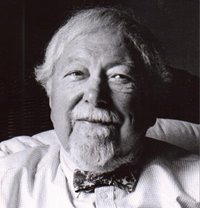

It is now over 60 years since Dr. Robinson began his career as a distinguished educator of planners and a consummate scholar of planning. His passion for planning has endured through the decades, culminating recently in major contributions both internationally – especially in South-East Asia, and nationally – especially charting Canadian regional planning practice.
An American by birth but a Canadian by choice, he began his career as a planning educator in 1952 with the then fledgling School of Community and Regional Planning at the University of British Columbia. Ira completed this part of his career 40 years later at the University of Calgary (EVDS), as professor emeritus. He joined that program in 1974 when it too was in its formative years.
Hundreds of students – and many current Canadian planning practitioners from the UBC and EVDS programs – have received an essential part of their foundational planning education from Ira. He taught a wide range of urban and regional planning subjects, but was particularly well-regarded for his teaching on regional resource development, urban settlement system policy, and metropolitan region planning.
Ira is particularly proud to have been a founding member of the Planning Institute of British Columbia in 1958. He was also actively involved with the Alberta Professional Planners Institute in various capacities during his appointment at the University of Calgary.
Ira has been committed to publishing widely in his fields of expertise. A meticulous scholar, adhering to the highest publication standards, Ira was a notable authority on new towns/resource communities and regional planning/development in particular. He was much in demand as a conference presenter and contributor to books on these subjects, but he has also maintained his scholarly publishing commitment into his supposed ‘retirement’ – well-evidenced by the recent publication (co-authored with Gerald Hodge) of Planning Canadian Regions (UBC Press, 2001). This is the first book to consolidate the history, evolution and current practice of regional planning in Canada.
Over his long and productive career, Ira has consistently performed at a high level of excellence, always seeking to firmly advance the cause of planning and the capacity of planners.
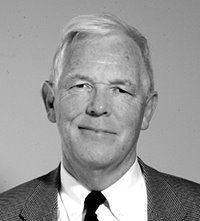

Joe Berridge, a partner at Urban Strategies, has played a key role in some of the largest and most complex urban regeneration projects in Canada, the U.S. the U.K., Europe and Asia. His extensive planning for the Toronto waterfront and the growth management and transportation plans for the Toronto region continue to help shape the future of that city.
Joe is currently an advisor on the planning of the next phase of Sydney Harbour and preparing a master plan for Cardiff Bay. He has played a major role in the regeneration of Manchester, first as strategic advisor to the reconstruction after the
1996 city centre bombing and more recently by preparing a regeneration plan for Hulme, an extensive public housing project, and other decayed inner city districts. He is the masterplanner of Manchester Airport City and the Manchester City Etihad Campus. He has master-planned several European large-scale developments, including the waterfront of Cork, Ireland and Belfast’s city centre, as well as several London docklands developments. He has prepared master plans for Governors Island in New York harbour, and for several major developments in Singapore.
He has extensive campus planning experience, having recently led the Queen’s University and Western University’s campus master plans, also providing ongoing advice to the University of Waterloo, most recently in the design of their new 120-acre Research and Technology Park. He led a number of neighbourhood and city centre plans in Sudbury, London, and Kingston, Ontario.
Joe was responsible for coordinating the master planning for the Trade Centre Complex at Exhibition Place and was the master planner for Festival Plaza. For almost a decade Joe was the master planning coordinator for Waterfront Toronto,
helping shape the future of the Toronto waterfront. Most recently, he played a central role in outlining a new direction for planning the city’s Port Lands, and is currently masterplanning the area around Billy Bishop Airport. He has had extensive
involvement in the preparation of Places to Grow and The Big Move; respectively the land use and transportation plans for the Greater Toronto and Hamilton Area. He has appeared on several occasions before the Ontario Municipal Board.
Joe has lectured at universities in Canada, the US, the UK and Europe and has served on many urban design award and competition juries. He is a frequent conference speaker and contributor to planning journals, writes book reviews
on urban issues for the Globe and Mail, The Walrus, and the Literary Review of Canada, and is a regular TV and radio commentator. He is a recipient of the Toronto Arts Award and was made a Fellow of the Canadian Institute of Planners and of the Institute for Urban Design in 2002. In 2009 he was appointed to the Enabling Panel of the Commission on Architecture and the Built Environment, the English design review agency. He teaches in the Program in Planning at the University of Toronto and is a Fellow in the School of Public Policy and Governance.


After more than three decades as a community planner, I still am excited by every community I visit, or have the opportunity to work in. Every settlement pattern is different; every community has a story to tell.
My early career was in the public sector — with Alberta Municipal Affairs, and the City of Ottawa, in progressively senior planning and project management positions.
A move to Victoria BC brought an abrupt lifestyle and career change – motherhood and volunteering. And,I still enjoy both.
In 1986, Gwyn Symmons and I founded CitySpaces Consulting. The firm has grown and diversified, with corporate offices in Victoria, Vancouver and Calgary. Now celebrating its 28th year of business, CitySpaces continues to “work to build lasting, livable communities” throughout Western Canada.
My specialties include research and analysis; writing and editing; advising colleagues and decision-makers; and mentoring.
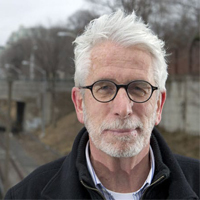

Paul Bedford is a Fellow of the Canadian Institute of Planners with over 50 years of experience in urban planning and city building. As Toronto’s Chief Planner from 1996-2004, he challenged everyone to embrace new ways to think, act and plan. He was the architect of the King-Spadina and King-Parliament renaissance, the driving force behind a new Official Plan for the amalgamated city of Toronto and the Central Waterfront Principles Plan “Making Waves”.
After 31 years of public service to Toronto he assumed a variety of roles to advance creative planning. These included teaching graduate and undergraduate students at both the University of Toronto and Ryerson University Planning Schools, the National Capital Commission Advisory Planning and Design Committee, the University of Toronto Design Review Panel and Dean of the Urban Land Institute Leadership Program. As a Metrolinx Board member, he championed the development of the Big Move regional transportation plan, the Crosstown LRT, the Union-Pearson Express train and electrification of the regional GO train rail network in addition to the development of new transit funding tools as Vice-Chair of the Ontario Transit Investment Strategy Advisory Panel.
He has been an inaugural member of the Waterfront Toronto Design Review Panel since 2005 and assumed the role of Chair in 2018. He is dedicated to ensuring that Toronto’s waterfront belongs to everyone and is passionate about making a continuing contribution to his city and the planning profession.
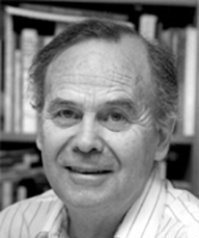

Peter Smith began his career with the City of Calgary in 1956, which led to membership in CIP (then the Town Planning Institute of Canada) three years later. That same year, he took up a faculty position with the recently formed Department of Geography at the University of Alberta in Edmonton, where he remained until his retirement in 1997. Over this period, he taught a variety of courses in planning and related fields, and supervised more than forty doctoral and masters’ students in their thesis research. Many of these students, undergraduate as well as graduate, went on to successful planning careers in their own right. Several have held office in CIP and its affiliates, some current fellows among them.
As a planning scholar and practitioner, Peter Smith has well over a hundred publications to his name, including books and research monographs, refereed articles, book chapters, conference papers and technical reports. Much of this work falls under the rubric of planning history, and he served for ten years on the board of the International Planning History Society. He was also active, at different times, in such national and provincial organizations as the Social Sciences and Humanities Research Council, the Canadian Association of Geographers, the Royal Canadian Geographical Society, the Canada Land Inventory, the Alberta Environment Conservation Authority, the Alberta Environmental Research Trust, and the Alberta Land Use Forum. For CIP, he served on occasion as a student advisor and examiner, and an appraiser of university programs; sat on a committee to review Alberta’s planning legislation; and was a member of the organizing committee for Habitat 94, a joint congress of CIP and the International Federation of Housing and Planning which was held in Edmonton.


Richard Parker grew up in Zimbabwe, where his father was Chief Town Planning Officer. He did his training in the United Kingdom from 1964 to 1970, studying while working for the County of Cambridge and Dudley Borough Council. In 1970 he received his Diploma in Town Planning from the Birmingham School of Planning and Membership of the Royal Town Planning Institute.
Richard immigrated to Canada in 1972 working for the City of Toronto until he joined the City of Calgary Planning Department in March 1974 as a Long Range Planner. In 1978 he was appointed as a Manager and became Director of Planning and Building in 1988. He retired from the City of Calgary in 2003 and is now a consultant providing services to governments and nonprofit groups.
During his time at the City of Calgary, he was involved with a wide range of planning issues, including land use and transportation plans, downtown planning and innovative projects for new communities such as the Sustainable Suburbs Study, Garrison Woods and Mackenzie Town. He also played a major role in a number of significant projects in the downtown including Olympic Plaza, Eau Claire, the Eaton Centre and revitalization of Stephen Avenue Mall.
In 1975 Richard became a member of CIP. He served as Co-Chair of the 2005 CIP Annual Conference and is currently a member of a number of APPI Committees and acts as mentor to new planners. He is also an Adjunct Professor in the Faculty of Environmental Design at the University of Calgary.


I was born and raised on a large homestead farm in the frontier district of Barnes Crossing, Saskatchewan. I earned grades one to nine in the local one-room Beaverdale School. Then I left home to seek higher education. This brought me first to Meadow Lake, then Saskatoon, and next to Vancouver.
My earned radiography skills comfortably carried me through a period of higher education. By 1965 my family was sufficiently settled to enable my BA (English & Fine Arts) studies at UBC. After my BA, with the friendly blessing of the UBC dean, I launched my Community Regional Planning (MURP) 2-year study. It was a rewarding success and firmly established me in urban & regional planning. That summer Prince Edward Island needed a competent, land use planner – I applied and was hired.
I entered the PEI planning arena during the first stage of its forward-looking 15-year, Federal/Provincial three-stage Development Plan. The Province was generously funded to enable land use and development planning on a scale bringing it in line with planning & development efforts across Canada. I had already spent 35 years of my life in Saskatchewan and British Columbia. My family easily settled in the PEI Capital. I was immediately engaged for planning services in the Province and its communities. This appointment took me from 1971 until my retirement in 1997.
Early in the Development Plan years PEI relied on off-Island consultants for local and regional planning. Only a few small draft plans were prepared and none had been finalized. There were no local or regional plans. Development control and land use planning decisions were made by a small Provincial Board working under Municipal Affairs and the provisions of an elementary Planning Act. High on the list of concerns were land subdivision, road safety, environmental protection and land use compatiblity. During my years of planning in PEI, local and regional land use legislation improved. With the encouragement of the Province, by 1990 in municipal and regional planning areas approximately 50 official plans had been approved and were functional. Cities, towns and villages matured and prospered. I am happy to have been an active participant in this growth process.
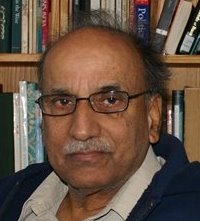

Mohammad Qadeer is by definition an immigrant (foreign-born) who now has lived and served in Canada far longer than the majority of born-Canadians. He taught Urban and Regional Planning at Queen’s University full time for 29 years and now has been teaching part time, post retirement for another 15years. So there are probably senior professional planners in almost all major cities of Canada who would be acquainted with his academic quirks, as the Queen’s more than 1000 alumni have spread throughout Canada. Mohammad was among the founding faculty of the school. His years as the director of the school were some of the most satisfying time of his career, largely made fulfilling by very co-operative, dedicated and creative colleagues, students and staff.
Mohammad served as an Associate editor of Plan Canada in the days the journal was edited at Queen’s. Over the years he served on committees and organizing teams of CIP and OPPI for conferences. He served as a consultant, advisor and researchers for the UN, UNDP, CMHC, Ontario Ministries and many Eastern Ontario townships and Pakistan’s Ministries of Planning and Housing and Environment. His academic interests and skills spanned both Canadian and International issues. He believes in the necessity of understanding the cultural context for planning practice. Thus he chose to limit most of his international work to Pakistan. He has written extensively about urban development in Pakistan (his home land) as well as planning policies, land and real estate development and multicultural planning in Canada. One of his article on Planning for multicultural cities in Canada received Honorable Mention for Best Article by the American Planning Journal. He has expressed his gratitude to the two countries that have shaped his life, Canada and Pakistan, by publishing books alternatively on each country. On retirement from full time teaching, he moved to Toronto to pursue his interest of learning about the functioning of multicultural cities. He follows a circuit of ethnic greasy spoon restaurants where he hangs out for his observations.


Pamela is Senior Vice President at FOTENN and has over 35 years’ experience in land use planning, policy development, project management and consultation. She served as President of the Canadian Institute of Planners and is a Fellow of CIP. She currently serves as Chair of the Fellows Selection Committee and recently sat on the Board of Directors for the Ottawa International Airport and served as a Trustee on the Ottawa Public Library Board.
She has been project leader for a variety of public and private sector projects, including the preparation of Master Plans for federal lands in the National Capital as well as other Canadian cities. She initiated FOTENN’s planning work in the North, managed the preparation of the Jasper Community Sustainability Plan, and continues to provide expert testimony at the Ontario Municipal Board.
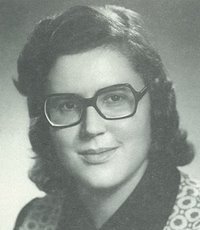

Mary Margaret Rose MRAIC FCIP was born in Toronto and graduated with a B.Arch from the University of Toronto in 1965. She worked as an architect with several firms for five years, becoming professionally qualified as a member of Royal Architectural Institute of Canada. She then returned to U of T to study planning and received her M.Sc. (Pl) degree in 1971.
Mary was the first female planner / architect hired at the consulting firm Marshall Macklin Monaghan (later MMM Group) in Toronto. She spent her entire planning career at MMM, starting as a senior planner, and later becoming MMM’s Director of Urban Design, Chief Architect and Vice-President of Planning. She personally prepared a large variety of planning studies, community plans, secondary plans and land development projects in Ontario, Nova Scotia, Alberta and BC. Perhaps more importantly, she recruited, trained and mentored dozens of young planners, helping build MMM into Canada’s largest planning practice in the early 1980s.
Mary retired from MMM in 1993 and moved to Orillia, a community where she had prepared several planning studies. She was an advisor to the people of Rama and devoted herself to drawing and painting in her later years.
Mary was elected to the College of Fellows in 2000.
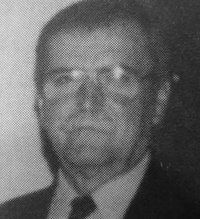

Maurice was born in Milton, Queens County, Nova Scotia, in 1936. He graduated from Nova Scotia Technical College in 1959 with a B.E. (Civil Engineering) with Honours in Town Planning and started his career with the Town of Dartmouth. His title was Planning Engineer until 1961, when Dartmouth became a City, and then, until 1970, Director of Planning and Development. His broad portfolio included planning, urban renewal, traffic engineering, building inspection, and land assembly. Maurice completed his M.E. in 1966 with Majors in Town Planning and Municipal Engineering. He became a Member of the Town Planning Institute of Canada (then TPIC) in 1969.
Maurice then turned to private practice as Director of Planning for Acres Atlantic Limited where, among other things, he coordinated technical services for a major planning program for the Halifax-Dartmouth Metropolitan Area. From 1971- 73, with his own firm, he was the team leader for the finalization of the Halifax-Dartmouth Regional Development Plan which was adopted by the Nova Scotia Government in 1975. From 1973-75, he was involved in community and land development projects.
He was appointed Director of Community Planning for the Province of Nova Scotia in 1975 where he administered the Planning Act, promoted regional and community development programs, developed the provincial transit program, coordinated the Main Street program, served as a member of a task force on municipal government reform and cost sharing, and worked towards coordination of provincial land use policy.
Maurice’s next career shift was in 1981 to become Vice-President for the Atlantic Region for UMA Group where he led a diverse practice. Typical projects included conceptual planning and engineering for business parks, analysis of proposed municipal amalgamations, the Halifax city transportation study, a highway corridor study in the Charlottetown area, preparation of downtown development plans, and expert testimony for bodies such as the Nova Scotia Planning Appeal Board. In 1996, Maurice established AtlanPLAN Ltd which provided services in public consultation, strategic and community planning, and economic development.
Maurice is a Licensed Professional Planner in Nova Scotia and a Life Member of the Nova Scotia Association of Professional Engineers. Throughout his career, he contributed to the community in a variety of ways—for the Halifax Board of Trade, the Halifax Downtown Business Commission, the Geomatics Association of Nova Scotia, Maritime Resource Management Services, the Land Registration Information Service, the Association for Community Living, and the Bide-Awhile Animal Shelter. In 1992, he was awarded a 125th Anniversary Commemorative Medal by the Government of Canada.
Maurice was a founding member of the Atlantic Planners Institute in 1966 and served as its second President. He was elected to CIP’s College of Fellows in 1999 in recognition of his influential career, community service, mentoring, leadership, and promotion of the planning profession.
As this is written Maurice, now in his early 80’s, continues his work on a part-time basis.
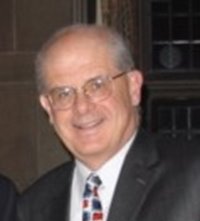

Peter Walker is one of the pre-eminent land use planners in the country, with a distinguished career spanning over 46 years. Throughout his career, Peter has contributed his time and expertise to a number of important affiliations including, as the former Director of the Central Ontario Chapter of Ontario Professional Planners Institute (OPPI), the Chairman of the OPPI Chapter Membership Committee, the former Director of the Ontario Association of Planners, the Director of the Ontario Expropriation Association and a Member of the President’s Joint Council on Urban and Regional Planning at the University of Toronto. The list goes on and on. Peter was elected a Fellow of the Canadian Institute of Planners in 1999 in recognition of his significant contributions to the profession of land use planning.
Peter’s professional experience has covered a vast range of assignments, including as a Consultant to regional, municipal, county, provincial and federal governments; the preparation of planning policy for many urban and rural areas; planning, designing and managing many prominent mixed-use, commercial, industrial and institutional projects and residential communities across Canada; redevelopment, revitalization and rehabilitation projects; and providing experienced opinions and consulting services relating to environmental, lease arbitration, and expropriation matters.
In the course of becoming one of Canada’s top land use planners, Peter has appeared before numerous agencies, committees, Councils, provincial panels, tribunals and courts, and brings to each project the depth of this extraordinary experience.


Monsieur Serge Filion a étudié aux universités Laval, de Montréal et McGill. Il a pratiqué l’urbanisme à la Ville de Québec pendant 28 ans comme Directeur de la division de l’aménagement du territoire avant de faire le saut à la Commission de la capitale nationale du Québec où il a occupé le poste de directeur de l’aménagement et de l’architecture . Il a été responsable entre autres des études et surtout des projets de parachèvement de la colline Parlementaire, de la requalification des portes d’entrée et des voies d’accès au cœur de la capitale, de la mise en lumière de différents sites, de l’aménagement de parcs et places publiques, de la préparation du plan vert et bleu de la capitale nationale et enfin de l’aménagement du littoral dans le secteur de la promenade Samuel-De Champlain. Il agissait comme Adjoint au président et directeur général de la Commission de la capitale nationale du Québec au moment de quitter la Commission en décembre 2006. Maintenant conseiller sénior en urbanisme, il partage son temps entre l’enseignement, la consultation, la formation professionnelle et l’écriture.
Il a été président de l’Ordre des Urbanistes du Québec pendant sept ans (1991-1998), où il s’est surtout impliqué par de nombreuses prises de position en faveur du développement durable et d’un plus grand respect de la ressource sol au Québec. Il a été l’initiateur, l’organisateur et le responsable d’assurer un suivi des États généraux du paysage québécois tenus à Québec en 1995 et regroupant treize (13) ordres et associations professionnelles impliqués dans la gestion dynamique de l’aménagement du territoire et de la conception des paysages.
Fellow de l’Institut Canadien des urbanistes depuis 1999, il a reçu une reconnaissance de la part de l’Ordre des Architectes du Québec en 2003 et le prix Frédéric Todd de l’Association des architectes du paysage en 2001. De plus, il recevait en 2004 une reconnaissance de l’Ordre des Urbanistes du Québec, le prix Hans Blumenfeld .Il a enseigné l’urbanisme à l’Université de Montréal entre 2007 et 2010. M. Filion entend consacrer désormais ses énergies à la formation de la relève professionnelle et du grand public face aux défis contemporains de l’urbanisme au Québec, au Canada et à l’étranger. Il a été nommé commissaire à la Commission des biens culturels du Québec en décembre 2007 par le Conseil des ministres. Enfin, il recevait le titre de Membre émérite de l’O.U.Q. le 11 novembre 2009. Il agit comme chroniqueur régulier et éditorialiste dans la revue FORMES dédiée aux sujets de patrimoine, de développement durable, de design et d’architecture contemporaine.
Il joint en mars 2011 le groupe Plania à titre de Directeur, études et projets stratégiques pour la région de la capitale nationale. Il y demeura jusqu’en avril 2013. Il est également membre des conseils d’administration de deux organismes à but non lucratif, soit Vivre en ville et Les amis de la vallée du St-Laurent. Enfin il siège encore aujourd’hui au nouveau Conseil culturel du Québec à titre de Commissaire. Il agit désormais à titre de consultant privé en urbanisme.
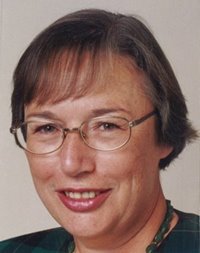

Anne Beaumont was born in Wales in 1940. She earned a B.A., Joint Honours in Geography with International Politics, from the University of Wales in 1962.
She worked in Manchester as a High School teacher, and as a Town Planning Assistant. In 1967 Anne and her husband emigrated to Canada.
Anne then moved to various positions in Ontario Ministries of Municipal Affairs, Treasury, Economics and Intergovernmental Affairs from 1967 through 1982—interrupted to gain a M.Sc.(Pl) in Urban and Regional Planning from the University of Toronto in 1971. Her positions with the Province became increasingly responsible, including Director of the Official Plans Branch and Director of the Community Planning Advisory Branch where she provided sound and responsible advice to both municipalities and development proponents. During 1982-85, Anne was Executive Director of the Community Planning Programs Division, providing a range of research, advisory, educational and financial assistance programs that supported municipal planning, including a new theme of energy conservation. After a period from 1985 through 1989 that focused on corporate services, Anne finished her career as Assistant Deputy Minister of Housing Policy and Programs with the Ministry of and Housing. In this position, she led the development and administration of policy and legislation for social housing, private and rental housing, tenant protection, the Ontario Building Code and the construction sector until she retired in 1999. In her ten years in the Ministry of Housing, she worked with three markedly different government to write legislation on rent control and to address affordable housing shortages. After retiring from the provincial government, she became president of Beaumont Consulting in Toronto and a research associate with the Centre for Urban and Community Studies at the University of Toronto.
She was the first woman in the Commonwealth to be elected President, in 1979, of a national professional planners’ institute—providing strong leadership to CIP through her skill and diligence. Anne was on the Board of the Toronto Chapter of the Institute of Public Administration of Canada, the Board of the McGill Club, Co-Chair of the National Housing Research Committee, a member of the Canadian Council on Building and Fire Codes, was on the Advisory Council for the planning program at the University of Toronto, and served on other committees for CMHC and FCM.
Anne was elected as a Fellow in recognition of a stellar career as a civil servant where she was influential in improving Ontario’s planning and housing policies, her leadership in the planning profession both in Ontario and nationally, and her important influence in the training of a generation of planners that worked for her. Anne promoted CIP’s National Task Force on Energy.
She worked tirelessly, advised fearlessly, and served the community and the profession. Another Fellow described Anne as not only weathering the storms of politically different governments, but she kept the planning ship afloat and on course.


Born in South Africa, Frank was trained as an architect receiving a B. Arch from the University of the Witwatersrand (1966), and urban planning receiving a MCP from MIT (1973). In between, he worked as an architect in France for Jean Prouvé and in England for Arup Associates. Frank arrived in Canada in 1971. He worked as a planner for the City of Toronto, for the NDP Research Group and Marshall Macklin Monaghan before starting his own firm. In 1986, he joined with Joe Berridge to found a new urban planning and urban design consultancy which is today known as Urban Strategies Inc. While working with the City, Frank played a key role identifying and creating the Master Plan for the St. Lawrence Neighbourhood. This downtown neighbourhood is today substantially complete and considered a very successful example of inner city urban renewal.
His work evolved through an integration of regulation and design. He had extensive experience working on dozens of private developments, among them 45/141 Bay – a 2.8 million square foot office development adjacent to Union Station linked by a bridge park over the rail corridor, Brookfield Place and the Rogers head office in Toronto, and Oak Park in Oakville and the DuPont head office in Mississauga. He has successfully represented clients in many cases before the OMB, including some of Toronto’s most complex and ambitious developments. He undertook three workshops on behalf of the Canadian government in South Africa during the transitional period towards majority rule in that country.
The studies and projects he completed demonstrate the success of his approach. He is the lead planning consultant for Oxford Properties on an ongoing basis for both the Yorkdale and Square One shopping centres, Frank has guided a number of master planning initiatives, most recently for Bridgepoint Health, the Centre for Addiction and Mental Health, Toronto’s Central Waterfront, and the Master Plan for the University of Toronto- Scarborough campus. His public policy studies include Living Downtown in Toronto, Guidelines for the Reurbanisation of Metro Toronto and the recently Tall Buildings Report: Initiating Change in Downtown Toronto.
Frank sang for 20 twenty years as a member of a community choir. He has 4 kids and 3 grandchildren.
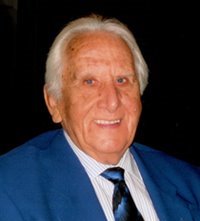

Bert was born July 2, 1930 in Asquith, SK. In 1941, his parents moved back to England where he was raised in Weymouth Dorset. After receiving his BA Honours in Geography from the University of London, Bert joined the City of Saskatoon Engineering Department in 1952. In 1963, Bert became the City Planner and then on to Director of Planning and Development until 1987, when he became the Director of Special Projects until his retirement. He left a strong impact on the form of Saskatoon, beginning with his contribution to the City of Saskatoon Development Plan, 1966 and carried through his commitment to the City’s land banking program and riverbank protection.
He made a very significant contribution to professional planning in Saskatchewan. He was the longstanding Chairman of the Saskatchewan Provincial Planning Appeals Board. He was a formidable protagonist within the meeting room or Council Chamber, but remained approachable and open to his colleagues. Bert was viewed by many as a mentor and very fine example of a professional planner in terms of his values and his participation in affairs of the Town Planning Institute of Canada since the middle 50s. His professionalism was well known as he demonstrated a vision based on planning principles, incisive in his analysis, and relentless in his pursuit of sound planning goals. Bert was respected by his planning masters and, in turn, demonstrated strategic skills. Based on his vision, integrity, leadership, and commitment to excellence, he was one of the giants of planning in Saskatchewan.
Over the years, Bert loved collecting stamps; bird hunting with his friends and faithful lab companion as well as bowling and fishing with his sons. On his 75th birthday, Bert learned that a street was to be named after him in Saskatoon’s Stonebridge neighbourhood recognizing his years of public service. As he said, ‘the bottom line was that I’ve never wanted to have any other profession or live anywhere else and I will fight for what I believe in.’
Bert passed away in Saskatoon, SK on October 19, 2014 at the age of 84.


During his 40 year career in planning, Hugh worked in inner city planning in Toronto, in the planning consulting industry in western Canada, and for more than three decades in Metro Vancouver. Much of Hugh’s career was focused on management of environmental and regional development policy for Metro Vancouver, primarily the Livable Region Strategic Plan. Hugh has been a frequent lecturer on Metro Vancouver’s governance and planning practices, and has participated in many international projects. Retiring in 2010, Hugh has maintained a planning consulting practice and continued to promote community social and environmental development.
Hugh has a Bachelor of Arts in Political Science from the University of British Columbia and Master of Science in Urban and Regional Planning from the University of Toronto. He was President of the Planning Institute of British Columbia in 1985/86 and the Canadian Institute of Planners President in 1990/91.
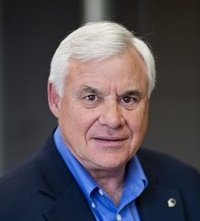

Ian MacNaughton has practiced planning and resource management since 1968, and founded MHBC in 1973. MHBC now has five offices in Kitchener, Toronto, Barrie, London and Kingston. Ian has a Master of Arts, Regional Planning and Resource Development and an Honours Bachelor of Arts, Urban and Regional Planning, from the University of Waterloo.
Ian was inducted as a Fellow of the Canadian Institute of Planners in 1998. He received the University of Waterloo’s 50th Anniversary Alumni Award (2007) and in 2013 the Faculty of Environment Distinguished Alumni Award. He was appointed Planner in Residence (2010) by the University of Waterloo School of Planning. He has served on the Board of Directors of Homewood Health Centre and the Grand River Conservation Foundation, Chaired Canada’s Technology Triangle (CTT) and Kitchener’s Downtown Task Force. He is a member of Pragma Council, and the Alumni Council, University of Waterloo. He served as a member of the Provincial Smart Growth Central Ontario Strategy Sub Panel and alternate on the Greenbelt Task Force and the Provincial Task Force on Ontario’s Economic Opportunities in Energy.
Ian’s experience covers a broad range of interests including policy development, resource management, energy projects, economic strategies, commercial planning and development, downtown revitalization, housing studies, waste management and expropriation. He has advised senior levels of government, local municipalities and the private sector on issues relating to planning and resource management.
Ian also specializes in aggregate planning and resource management, and has been qualified as an expert witness on future trends in the aggregate resource field. He has been involved in numerous hearings before the Ontario Municipal Board and other tribunals relating to planning and resource management.
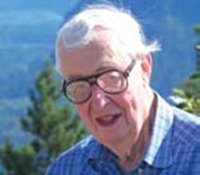

Ross started his career as a planning engineer in the Township of Toronto (now the City of Mississauga). Subsequently he formed Municipal Planning Consultants and then became president of the Triton Group.
In 1970, Ross became president of J. Ross Raymond & Associates Limited operating just outside of Gravenhurst. Ross loved Muskoka and northern Ontario, and became actively involved in projects outside of planning—restoration and operation of the Severn River Inn in Severn Bridge and restoration of the RMS Segwun steamship. Ross was the first president of the Muskoka Steamship & Historical Society and the first president and honorary director of the Muskoka Lakes Navigation and Hotel Company Limited, the company that operates this historic ship.
In 1991, Ross formed a new firm with Margaret Walton and Rick Hunter known as Raymond, Walton, Hunter. That same year he was appointed as one of three Land Use Mediators by the Ontario Municipal Board, a role he later acknowledged to be the highlight of his career.
As a planner, Ross enjoyed working for a variety of municipalities across Ontario and often his were their first planning documents. His extensive experience included specialty fields such as agriculture in southern Ontario, resort development in Muskoka, Haliburton, Parry Sound and Kawartha Lakes, and heritage planning in Niagara-on-the-Lake.
Ross received the OPPI Member Service Award in 1995 for managing and moderating an ongoing professional development program for young planners about appearing before the OMB. In 1998, Ross was inducted as a Fellow into the Canadian Institute of Planners.
J. Ross Raymond passed away in January 2012 after a distinguished career of over 40 years as a professional planner and civil engineer. Ross will be fondly remembered as a mentor and professional planner who fiercely supported the institute and promoted the highest code of conduct for practicing planners.


John Livey has over 40 years of municipal, regional and provincial experience. Mr. Livey has worked with the City of Toronto, Town of Markham, Region of York, the former Municipality of Metropolitan Toronto and the Province of Ontario.
Mr. Livey holds an Honours Bachelor of Applied Science degree and a Masters of Sciences in Urban and Regional Planning from the University of Toronto. In 2005, he completed the Public Executive Program at Queen’s University.
In his current role as Deputy City Manager, City of Toronto, Mr. Livey is responsible for corporate oversight, administrative governance and coordinating city-wide initiatives and projects. His portfolio includes water, transportation, solid waste management, engineering and construction services, city planning, fire, building, emergency management, municipal licensing & standards, capital infrastructure coordination as well as the Waterfront Secretariat.
From 2000 to 2011, Mr. Livey served as the Chief Administrative Officer for the Town of Markham, and as President of Markham Enterprises Corporation which holds Markham’s shares in Power Stream and Markham District Energy. Under his leadership, Markham has achieved PEP Level III and has been awarded the Canadian Award of Excellence (Silver) by Excellence Canada (NQI).
Prior to his role in Markham, Mr. Livey was the Commissioner of Planning and Development Services for the Regional Municipality of York (1992-1999). Under his direction, York Region adopted its first Official Plan.
In January of 1996, Mr. Livey completed an eight-month secondment as Executive Director to the GTA Task Force. The Task Force’s report set out 51 recommendations on how to create a secure, prosperous and sustainable future for Greater Toronto.
Prior to that, John Livey was the Director of the Policy Development Division for the Metropolitan Toronto Planning Department. John provided leadership in the development of the 1992 Official Plan, emphasis on making Metro Toronto the “Liveable Metropolis”.
Mr. Livey has also served on many boards throughout his career, most notably as the First President of the Ontario Professional Planners Institute (1986) and a Board Member for the Ryerson University Planning Program Advisory Board (1991 to 1995).
Mr. Livey is a Fellow and a Past-President of the Canadian Institute of Planners, and the first President of the Society for Conflict Resolution in Ontario.
Mr. Livey has been involved with a number of non-profit organizations:
- Board of Directors, Centre for Sustainable Transportation (1990-1993)
- Campaign Cabinet Chair, United Way of York Region (2000 & 2001)
- Board of Directors, United Way of York Region (2001-2006)
- Board of Governors for National Quality Institute, now Excellence Canada (2004 to 2011)
- Board of Directors for Markham Board of Trade (2005 – 2011)
- Board of Directors for the YORKbiotech Inc. (2005 – 2011)
- Board of Directors, Markham Stouffville Hospital Foundation (2005 – 2011)
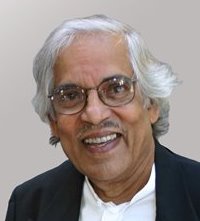

Mario E. Carvalho is Professor Emeritus, Faculty of Architecture, University of Manitoba. He taught in the Faculty of Architecture from 1968 until his retirement in 1998, and served in many administrative and advisory capacities. He holds degrees in Architecture and City Planning, B.Arch., M.C.P (Penn) and Ph.D (Edin) and was a registered Architect, a Member of Royal Architectural Institute of Canada, a Fellow of Royal Asiatic Society of Great Britain, and a Fellow of Canadian Institute of Planners. He was also a member of American Planning Association and American Institute of Certified Planners. He has served as advisor on many Masters and Doctoral dissertations, and has worked with a number of other institutions of higher learning, including Goa College of Architecture, Goa, India; School of Planning and Architecture, New Delhi, India; University of Nairobi, Kenya; University of Edinburgh, UK; Massachusetts Institute of Technology, Cambridge, USA; University of Botswana, Africa; and University Federal de Paraiba, Joao Pessoas, Brazil. He has consulted with a number of national and international organizations, including the German Foundation for Developing Countries, Berlin; the United Nations Centre for Human Settlements, Nairobi; and Canadian International Development Agency; International Development Research Centre, Government of Canada, on city and regional planning projects in Canada, India, Africa and Brazil.
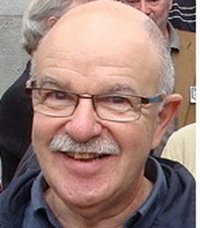

Mark has ventured in professional planning for close to 50 years in the private and public sectors. He specializes in the field of land use planning and environmental policies. He has undertaken planning and environmental studies for public and private sector clients.
He is President of Mark L. Dorfman, Planner Inc., in Waterloo. Mark served as CIP President from 1974 to 1976. He was on the Board of Ontario Nature from 1995 to 2004 and served as President from 2000 to 2002. He was on the Board of Nature Canada from 2003 to 2014, and served as Chair from 2005 to 2008 and Past Chair to 2013.
He is the author of several published papers and has delivered papers at various conferences and workshops. In the past, he served as an Adjunct Professor in the School of Planning at the University of Waterloo. Marks lives in and practices from Waterloo.


Born in 1930 in Bermuda, Nigel Richardson studied planning at McGill University (BA, 1951; MA, 1954) and the University of Liverpool (Diploma in Civic Design, 1955).
After working as a planner in England and British Columbia (Deputy Director, Lower Mainland Regional Planning Board, 1956-63), he moved to senior posts—first with the City of Toronto and later with a major consulting firm. After directing a three-year regional planning and local government study for the Ontario Government, he was appointed Chief Planner for the Toronto Region, and subsequently, Executive Director of the Ontario Royal Commission on the Northern Environment.
Much of Nigel Richardson’s consulting practice, established in 1981, was in northern Canada as an adviser on the design and implementation of regional land use planning systems to the Governments of Canada, Northwest Territories, Yukon, Nunavut Planning Commission, other northern planning boards and commissions, and various federal departments.
Mr. Richardson carried out or played a leading role in a wide range of other assignments such as a study of the role of land use planning in relation to sustainable development in Canada; an examination of the relationship between land use planning and environmental assessment in Ontario; major contributions to the 1991 and 1996 Canadian “state of the environment” reports; a study of community partnerships in forest management; an evaluation of new residential planning concepts; a review of environmental standards in planning and other regulatory procedures in the City of Toronto; and a review of national and regional land and environmental planning and management models for Thailand.
Nigel Richardson taught in planning programs at the universities of Toronto and Manitoba, lectured in many other universities, served on several academic advisory bodies, and authored over 60 articles and papers on planning, sustainable development, and related subjects.
Nigel was also a Member of the UK Royal Town Planning Institute, Conservation Council of Ontario, Ontario Healthy Communities Coalition, Sustainable Communities Working Group of the Ontario Round Table on Environment and Economy, President of the Ontario Society for Environmental Management, Chair of the Central Ontario Chapter of the Canadian Institute of Planners, Member of Lambda Alpha Land Economics Society, and Editor of Plan Canada. He was on several advisory bodies on natural resource planning, nature conservation, housing, and healthy and sustainable communities, and served as a Volunteer Advisor with CESO Aboriginal Services.
He was elected a Fellow of the Canadian Institute of Planners in 1998.


Reg Lang was originally from Saskatchewan, but lived and worked in several provinces. He had a BSc in Civil Engineering from the University of Saskatchewan (1957), an MSc in Community Planning from the University of Manitoba (1963), and a PhD in Education from the Ontario Institute for Studies in Education at the University of Toronto (1995). He made several career shifts over the years: from professional engineer with the City of Regina (1957-1962) to professional planner in Halifax (1963-1971) to professor in the Faculty of Environmental Studies (FES) at York University in Toronto (1971-1999) and, after retirement, to life/work coach. He also worked as a consultant for numerous federal, provincial and municipal government ministries and agencies, as well as for non-profit organizations and community groups. In 1977, Reg received the “Queen’s Jubilee Medal for worthy and devoted service” to the planning profession in Canada. In FES, Reg served in several administrative roles, including Associate Dean. He taught courses on strategic planning and management, planning processes, and environmental planning and assessment. He supervised 52 graduate students’ research projects and papers in FES, and published more than 100 books, book chapters, reports and articles during his lifetime. Transition, personal development and lifelong learning were enduring themes throughout his life.
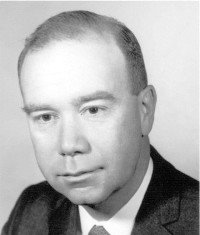

Brahm attended McGill University, Montreal, Quebec graduating with degrees in B. Arch (1948) and M.Arch-Planning (1950).
His professional career began in 1950 until 1967 holding planning positions at the City of Edmonton, Capital Region Planning Board of British Columbia and the City of Vancouver.
Brahm was working with the City of Vancouver Planning Department when his former classmate, Dr. Peter Oberlander, Director of SCARP invited him to deliver some guest lectures. This foray into the academic world persuaded Brahm to join the faculty. His academic appointments included Professor, Acting Director and Director for UBC’s School of Community and Regional Planning Department (SCARP) during the period; 1967-1992 and Initial Director, UBC’s Centre for Human Settlements in China, Indonesia and Thailand from 1991-1992.
Under Brahms’s directorship, SCARP and UBC’s Centre for Human Settlements initiated their first major overseas development projects. As a result, CHS was designated a Centre of Excellence by the Canadian International Development Agency in 1990.
Brahm and Peter began collaborative work in Vietnam, but it was China that became Brahm’s principal area of interest. He spent many years travelling to China on a regular basis, consulting on planning projects.
He was elected to the College of Fellows in 1997.
After Brahms’s passing in 2003, Madge, his wife established a scholarship in his memory which was a fitting tribute to the man whose insightful teaching had inspired so many other planners. The Brahm Wiesman Memorial Scholarship in Community and Regional Planning at UBC was established in 2006 and supports graduate students carrying out research abroad.
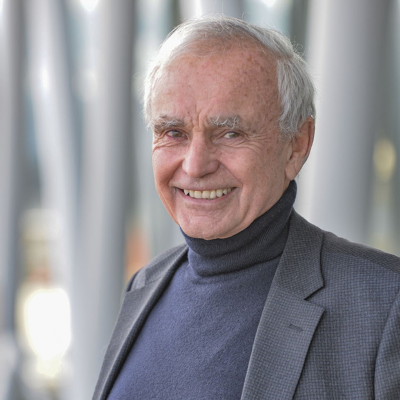

Dave has combined academia and practice much of his career. He has volunteered extensively where he has lived (Bowen Island, Nanaimo, Winnipeg) believing that ‘giving back’ is a key attribute for professionals who have been blessed with the opportunity to help shape communities and, through that, community quality of life.
Since the early ‘70s, Dave has practiced across Western Canada from the Lakehead to the west coast of Vancouver Island and into the high Arctic. He has completed assignments as a Senior Planner with the Province of Manitoba; Chief Planner, Parks Canada: Prairie Region (including the Yukon and Northwest Territories); Principal Hilderman Witty Crosby Hanna and Associates (HWCH), an award-winning Winnipeg and Saskatoon firm of landscape architects and planners; and Principal and Director Urban Systems Ltd., a multi-disciplinary firm in Alberta and British Columbia. In Winnipeg, while with HWCH, Dave taught professional practice and regional studios in the landscape architecture program at the University of Manitoba. He has advised large and small cities, rural communities and First Nations in areas of urban design, community planning and resource impact assessment. Beginning in his teen years on Manitoulin Island, his life-long work with Indigenous Peoples informed his world view and influenced his approach to community planning and resource impact assessment. That work included several major hydro-development negotiations and settlements with and on behalf of the Pimicikamak People and Wabaseeemoong Independent Nations, including sitting across the table from Maurice Strong, Chair of Ontario Hydro. Since the early ‘80s, he has been a proponent for the use of charrettes to help communities shape their future and, over the course of his career, has led over 100 charrettes in remote First Nations to large urban centres. Between 2008-11, he assisted the Abu Dhabi Urban Planning Council by conducting urbanism courses and urban design workshops for Emirati professionals.
During the early nineties, when he took a sabbatical to complete his doctorate, Dave was Acting Director, Continuing Professional Programs and Co-ordinator of the Certificate in Site Planning at the School of Community and Regional Planning, UBC. In the late ‘90s, he helped to develop and taught in the award-winning Certificate in Urban Design at Simon Fraser University.
He was Dean of the Faculty of Architecture, University of Manitoba (2001-2009). At the time, the Faculty was the largest design and planning Faculty (architecture, city planning, environmental design, interior design and landscape architecture) in Canada. While Dean, he taught in the Environmental Design Program and interdisciplinary graduate design studios held in northern Manitoba First Nations. Dave served as Senior Vice-President (Provost and Vice-President [Academic]) at Vancouver Island University located in Nanaimo (2010-2018) and helped develop and taught design studios in the Master of Community Planning.
Dave has been appointed as a Member of three Canadian Environmental Assessment Review Panels. He chaired the Winnipeg Heritage Advisory Committee and helped to develop the Area’s Design Guidelines, one of the first of their kind in Canada. He has served as a member of the International Advisory Board, Centre for African Settlement Studies and Development, and a number of regional bodies, including Smart Growth BC where he was a Founding Director. For 12 years, he served on the Advisory Committee for Planning, Design and Realty, National Capital Commission, Ottawa. He was founding chair of the City of Winnipeg’s Urban Design Advisory Committee. Dave is a founding member of the Council for Canadian Urbanism and was appointed an Honorary Member in 2010. He has juried several national and international urban design awards. He is a former Chair of the Manitoba Professional Planners Institute (formerly MACIP), former President of the Canadian Institute of Planners (1988/89) and was founding Chair of the Canadian Healthy Communities Project (1988-91). He served the Planning Institute of British Columbia (PIBC) as Chair, Membership Committee. He was elected a Fellow of CIP in 1997. He subsequently served as the Founding Chair, College of Fellows. As part of the FutureFORWARD Task Force, he received the President’s Award, “in recognition of an outstanding lifetime contribution to professional planning in Canada.” In 2019, Dave was awarded Life Member of PIBC. Dave is a Life Member of the Royal Architectural Institute of Canada and has been active in the Mid-Vancouver Island Chapter of RAIC.
Throughout his career, Dave has been committed to the notion that theory informs practice and practice informs theory. To that end, he has written numerous planning articles and delivered papers at national and international conferences. In 2001, he authored CIP’s Professional Practice Manual. He is the recipient of several awards, including the Canadian Society of Landscape Architects National Honour and a Regional Merit Award (as part of HWCH). On behalf of CIP, Dave was the 2010 Elite Visiting Scholar, Hong Kong Baptist University. He is the recipient of the Manitoba Southeast Tribal Council Recognition of Service to First Nations (2009).
In 2019, he was appointed Senior Fellow Urban Design, Master of Community Planning, Vancouver Island University where he provides guest lectures, leads his yearly best practice tour, and supervises and mentors graduate planning students.


Dr. Carrothers received his Ph.D. from Massachusetts Institute of Technology in Economics and Regional Planning. Dr. Carrothers was the founding Dean of Faculty of Environmental Studies at York University. He is currently Professor Emeritus in Environmental Studies at York University and is a fellow of the Canadian Institute of Planners. He has broad academic and research interests with a special interest in environmental learning.
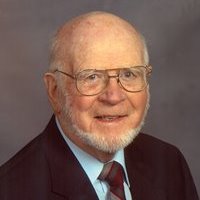

Hugh Taylor Lemon was born on September 27, 1927 in Hamilton, Ontario, to Hugh Lemon originally of Bognor, Ontario (near Owen Sound) and Helen Taylor originally of North Berwick, Scotland. He was an Air Cadet training for the Royal Canadian Air Force, flying Harvard trainer airplanes out of Mount Hope when WWII ended. Hugh went to Albert College in Belleville, Ontario. He was trained in land surveying and city planning and went to work for the Hamilton Wentworth Planning Board. He married Doris Ann Hood of Waterdown in 1950.
Hugh went to work for the Metropolitan Toronto Board of Trade in 1955 and remained there until 1970, when he went to the University of Waterloo as a Professional Liaison Officer in the School of Urban and Regional Planning. While at the Board of Trade, he represented significant business interests in the big land use and development decisions of the time, including the skyscraper bank office towers downtown and their underground shopping concourses, Lake Ontario waterfront plans, the international competition for the “new” city hall in Toronto, and he served on the international airport committee that helped map out taking the Malton airport from what it was then to the world class Pearson International Airport and economic engine for Toronto. One of the projects he considered the most fun of his career was building the Board of Trade Golf and Country Club in Woodbridge.
At the same time, for more than 15 years, Hugh was the Secretary Treasurer of the Town Planning Institute of Canada, which became the Canadian Institute of Planners. He was awarded the National Centennial Medal in 1967 for his outstanding contribution to City Planning in Canada and was inducted as a Fellow of the Canadian Institute of Planners (FCIP) in 1977.
Hugh knew everyone in Canadian city planning circles from coast to coast. At the University of Waterloo, he became the primary link between the planning school and the profession of city planning and planning employers, helping hundreds of planning students land their first jobs with summer internship placements and then full-time jobs. He was an advocate for good farming practices such as contour plowing and fencing creeks to reduce soil erosion and improve water quality in tributary watersheds.
Hugh was a supporter of the Federation of Ontario Naturalists, the Long Point Bird Observatory and more recently the Nature Conservancy of Canada in their conservation and land acquisition efforts on the Bruce Peninsula to purchase and protect rare and special habitats and properties.
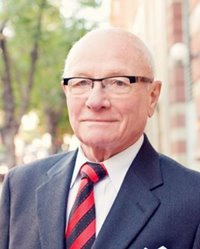

John Bousfield graduated from Lawrence Park Collegiate in 1947 where he was president of the student council. He went on to study Geography at the University of Toronto, obtaining an honours Bachelor of Arts degree in 1951. He then travelled to the United States and finished his post-secondary education at the University of Wisconsin at Madison, graduating with a Master of Science degree in City and Regional Planning in 1953. He went on to become one of Canada’s most prominent urban planners. For over 60 years, he practiced as a consultant on a full range of planning and development projects including the preparation and processing to approval of official plans and amendments, zoning by-laws and amendments, site plan approval, urban renewal studies and schemes, municipal boundary changes and development plans for new communities, brownfield sites, new business parks and wind farms for both private and public sector clients, mainly in Southern Ontario. He also had extensive experience appearing before the Ontario Municipal Board as a highly respected expert witness. Among his noteworthy accomplishments was a prescient proposal in 1958 for a green belt around Toronto. In the 1950’s, he was Planning Director for Scarborough where he was responsible for the (then) Township’s first Official Plan in 1959. In the 1960’s he was part of an illustrious team of planners and architects who planned the new community of Erin Mills. In 1967, he authored the seminal Toronto Waterfront Plan and in 1974, he established John Bousfield Associates, now Bousfields, which had grown to a staff complement of about 40 by 2016. Mr. Bousfield was elected to the Canadian Institute of Planners’ College of Fellows in 1997. The John Bousfield Distinguished Visitorship in Planning was established in his honour in 2007 in the Department of Geography & Planning through a major donation and a matching grant from the University of Toronto. His presence will be sorely missed, by his partners, colleagues and all who knew him, as will his professional acumen, sense of humour, and his humility.


Ken Cameron has 26 years of experience in senior planning and management positions in local government in the Greater Vancouver area, most recently as Manager of Policy and Planning with the Greater Vancouver Regional District. He played a key role in the adoption of the Livable Region Strategic Plan in 1996 with the formal support of the region’s 21 municipalities, an accomplishment that was recognized in 2002 by the UN Habitat program’s Dubai awards for outstanding contributions to the human environment.
Ken is an Adjunct Professor and past Chair of the Advisory Council of Simon Fraser University’s Urban Studies Program, Chair Emeritus of the International Centre for Sustainable Cities, a former Trustee of the Seattle-based Sightline Institute and a member of the UBC Board of Governors’ Land Use Committee. He is a Fellow of the Canadian Institute of Planners. With former Premier Mike Harcourt and local writer Sean Rossiter, Ken is the author of a book titled “City-Making in Paradise: Nine Decisions that Saved Vancouver,” which was published by Douglas and McIntyre in September 2007.
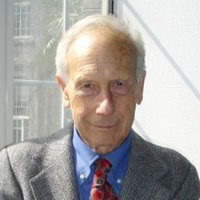

Macklin Leslie Hancock was born in 1925 in the hospital that his grandfather had founded and built in Nanjing, China 33 years earlier. The Macklin and Hancock families were forced to leave China in 1927 during the Nationalist Revolution, and returned to Canada.
He was the chief planner of the team that designed Don Mills. The development company was owned by E. P. Taylor and the president was Karl Fraser, Macklin’s father in-law. When the project was announced, the city wondered about the feasibility of this ambitious development on 2000 acres centred on Don Mills Rd. and Lawrence Ave. E., which promised to provide mixed-income housing for 30,000 people and work for 25,000. Macklin’s plan focused on traffic-free neighbourhoods connected by walkways and parks.
Don Mills was the first comprehensively planned community in Toronto. Divided into quadrants, it had a clearly defined town centre which has withstood the test of time. It was comprised of an office and major retail component, middle and secondary schools, plus a surrounding mix of townhouses and low-to-medium-rise apartments. Extensive business parks, which included a mix of service commercial, offices, and industries, were located on the southern and northern peripheries. The parks and open space system, linked by trails, was revolutionary for Canadian community design. The immediate success of Don Mills made it clear that full build-out would be achieved much sooner than expected. With foresight and vision that was rare in those years, Mack encouraged management to embark on what was to become the largest private land assembly ever put together within a major market area in Canada. As early as 1954, Don Mills Developments commenced acquiring the western half of the Credit River watershed. In 1956, a few of the Don Mills planning team established Project Planning Associates, a multi-disciplinary planning, engineering and landscape architecture consulting practice with Mack as president. Under his leadership, it became the preeminent planning firm in Canada.
Macklin was also a Fellow of the Canadian Society of Landscape Architects. He was awarded a Lifetime Achievement Award by the CSLA in 2009 and served as the President of both CIP and CSLA. He was awarded the Centennial Medal for Distinguished Service to Canada in 1967, a Doctor of Science (honoris causa) from the University of Guelph in 2002, and the Order of Ontario in 2003.
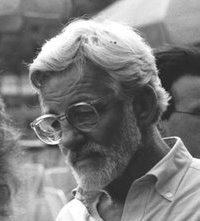

Michael John (Max) Bacon was born in the village of Dachet, near Windsor, England in 1928. He graduated from the University of Liverpool with a Bachelor of Architecture in 1953 and earned a Master of Civic Design from the same university in 1954. In response to Canadian needs for planning expertise to guide rapid development, Max came to Canada. He started with Central Mortgage and Housing, which funded additional studies in urban design at MIT, then moved to work with the City of Toronto. In 1956, he was named the Director of Planning for the Township of Toronto (now, Mississauga). He joined the firm Proctor and Redfern in 1961, with which he had several positions including Director of Planning. He retired from the firm in 1993.
Max’s contributions to planning in Canada are extensive. As a consulting practitioner, Max introduced professional planning to an astonishingly number of municipalities, both large and small. In rural Ontario, New Brunswick, Nova Scotia, Alberta and Newfoundland, his work spanned the full extent of planning activities from the preparation of regional studies, official plans, district plans, development schemes, and zoning bylaws to urban revitalization plans, solid waste disposal, municipal boundary adjustments and amalgamations. The range of his expertise was only exceeded by the geographic span of his practice. If nothing else, Max has demonstrated by his career that there is a place for a generalist with an inclination for diversity. His reputation was as a very reputable planning consultant, often confirmed when he provided expert testimony before various tribunals—he stood his ground, proffering his best advice, working as hard for small as large clients.
He was enthusiastic, passionate and pursued good urban design principles. He was described as having an inquiring mind, high energy levels, open to new concepts, keen to debate, dispute and shake out new ideas, and to question traditional wisdom. His work was interdisciplinary, environmentally aware, appropriate to locality and site, and sensitive to client requirements.
Max was an Adjunct Professor of Planning at the University of Waterloo and was a guest lecturer at the University of Western Ontario, University of Toronto, Queens University, York University, Humber College, Scarborough College, Ontario Institute of Studies in Education, and Ryerson Polytechnical Institute. He helped and encouraged young planners, ensuring planning students were taken on and given meaningful summer work.
He became a member of the Royal Institute of British Architects in 1954, the Royal Town Planning Institute (1955), the Town Planning Institute of Canada (1955) and the American Institute of Certified Planners (1978). He was a TPIC national councilor in the early 1960s and also held leadership positions with the planners in Ontario from 1965-1970, when he staunchly promoted the profession and supported implementation of Ontario’s Planning Act.
Max Bacon was elected to CIP’s College of Fellows in 1997. He was noted for his boundless enthusiasm, unceasingly positive outlook and commitment to professional planning. He also did volunteer work in the areas of conservation, housing, and alternate dispute resolution.
Among planners, one of Max’s most talked about legacies is the annual Max Bacon run that is held annually at each National CIP conference. The run captures Max’s essential characteristics—a willingness to accept a challenge, determination, enthusiasm, and a commitment to see a task through to the end. Max said he founded the run to literally and symbolically ‘get those planners off their duffs.’
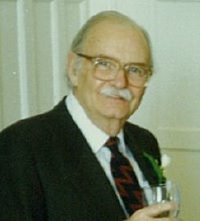

George Rich was born and educated in the UK. He graduated from the University of Brighton School of Architecture, followed by a degree in Town Planning from the University College London (UCL)—both awarded in the 1940s. George’s first job was as a surveyor, after which he contributed to the planning and design of one of Britain’s post-war New Towns (Crawley). George and his wife Jo then immigrated to Canada in the early 1950s. George worked as an architect and planner in Toronto, after which he moved west to Winnipeg in 1953 where he assumed important and influential roles. George joined the Town Planning Institute of Canada in 1954. He was Chief Planner (Winnipeg Metropolitan Planning Commission, 1953-1960) and then Director (City of Winnipeg Planning Division, 1960-67) where he was noted for his imaginative leadership and sound planning programs.
In 1967, George joined the University of Waterloo as a lecturer, and then associate professor with the new School of Urban and Regional Planning. Together with such illustrious colleagues as Len Gertler and Bob Dorney, George designed and helped launch Waterloo’s Planning program. He taught undergraduate courses in professional practice that influenced hundreds of students—grounding the students in the fundamentals and challenging them to dream of a better world. George was the author of a well-regarded text, The Professional Practice of Urban and Rural Planning in Canada (1993). He also developed and managed the Waterloo-Oxford Brooks annual exchange program in the 1980s. George retired from the School in 1989, and then worked in private practice for several more years, contributing both to the community and Institute affairs.
George Rich was inducted into the College of Fellows in 1997 in recognition of his embodiment of both theory and practice. The 1998 CIP Award of Excellence was awarded in his honour. He will be remembered both as one of the leading figures in post-war Canadian urban and regional planning and as an excellent teacher and mentor. He had a wide range of interests and a high degree of zest and humour.
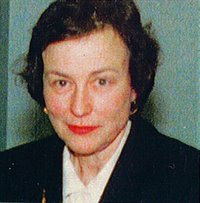

Born in Cairo, SallyThorsen, FCIP (1938-1997) lived in Britain before coming to Canada in the early 1960s. Her educational background included three Masters degrees earned from the University of Edinburgh in Scotland, the University of Toronto, and Queen’s University. She also lectured at the Universities of Alberta and Guelph.
Her illustrious career—which included becoming the first female head of a planning department in Ontario—began with her appointment as a senior planner on the Waterloo-South Wellington Study. The results of this Study contributed to the creation of Regional government in Waterloo in 1973. Sally’s next stop was the City of Galt as Director of Planning. Later, when the former municipalities of Hespeler, Preston, and Galt were amalgamated, Sally became the first Commissioner of Planning for the new City of Cambridge in 1973. After steering the new City through its first Official Plan and Comprehensive zoning by-law, Sally moved on to the Region of Waterloo in 1984 where she spent the next twelve years as Commissioner of Planning and Culture.
At the Region of Waterloo, Sally shepherded a series of innovative policy concepts, many of which found their way into a new and improved Regional Official Plan in 1995. The Region’s State of the Environment Report and the Archaeological Resource Master Plan were both firsts for a municipal jurisdiction in Canada.
Her involvement in the Region of Waterloo extended far beyond her role as a municipal planner through her work with the Kitchener-Waterloo United Way, the Social Planning Council of Kitchener-Waterloo, and her role as president, and member of the board of Anselma House in Kitchener—an emergency shelter for women. Whether it was championing to save Via Rail service, imploring area municipalities to provide affordable housing in their official plans, nurturing native trees in the regional arboretum, or pushing for plans to ensure the preservation of the rich archaeological heritage of Waterloo Region, Sally worked tirelessly for many important local concerns.
Sally’s expertise in planning was not limited to Waterloo Region. She made her mark on the provincial scene as well. A long standing member and Chair of the Regional Planning Commissioners of Ontario, she provided extensive input to the province on a wide variety of planning policy and legislative issues. She also served as Administrative Vice President and a member of the Executive of the Association of Municipalities of Ontario.
In 1997, one year following her retirement, Sally Thorsen became a Fellow of the Canadian Institute of Planners. The Waterloo Regional Heritage Foundation established the Sally Thorsen Award of Excellence to honour an outstanding level of commitment to heritage concerns in the Waterloo Region.
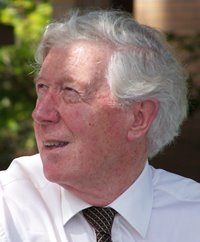

Antony (Tony) Parr RPP, FCIP, ARIBA retired from the City of Burnaby in 1995 where he worked as the Planning Director for 27 years and Municipal Manager for his last 3 years.
Born in England, Tony received a majority of his education there before immigrating to Vancouver, Canada in 1957. Tony initially graduated as an architect from the Leicester College of Architecture in 1953 and Association of the Institute of British Architects (ARIBA) in 1954. Deciding to pursue an education in city planning he went back to school in Urban Planning before spending 2 year in the British Army. Upon leaving the Army, Tony moved to Vancouver, BC in 1957 and took a job as an architect with Eaton’s Canada.
Realizing his greatest interest and passion was in urban planning, one year after landing in Vancouver, Tony moved to Victoria and became the Director of Planning for Saanich, BC. During that time he worked closely with Mr. Brahm Wiseman, the then Director of Planning in Victoria.
After 6 years in Saanich, Tony moved his family to North Vancouver in 1964 and began his long and illustrious career with the City of Burnaby. As Planning Director in Burnaby, Tony believed in inclusiveness and accessibility through the creation of planning processes and decisions that are open to public discussion and consultation; a common standard today but a progressive concept in the 1970’s and 1980’s. Tony was responsible for both long range and current planning, advocating for clear planning policies and orderly expansion of Burnaby at a time of significant population growth and changing demographics within the community. Tony built a Planning Department at Burnaby that was recognized by many in the planning field and civic government in general as “pragmatic without sacrificing values or principles” and was considered a “model” department with forward-thinking planning principles.
Tony says that during his tenure as Planning Director in Burnaby one of the more notable changes he was instrumental in driving was the creation and conservation of a major open space system, balanced by increased residential densities and the establishment of several town centres to bring a “sense of place” to Burnaby. Tony carried his philosophy of openness and thoughtful, coordinated planning to his role as Municipal Manager in Burnaby for the last 3 years of his career before retirement, where he was responsible for balancing the needs and priorities of five municipal departments (Administration, Parks, Engineering, Planning and Health).
Tony became a member of the Canadian Institute of Planners in 1974 and a Fellow in 1997. In 2015, Tony and his wife of 62 years continue to reside in North Vancouver and is a proud father to 5 children, 17 grandchildren and 5 great grandchildren.
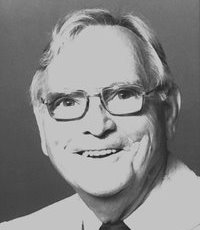

Dr. J. Howard Richards was born in Wales and attended the University of Wales, Aberystwyth. In 1941 he moved to Canada as a meteorologist with the RAF and later joined the Canadian Army, serving in Canada, Great Britain and other parts of Europe. Howard earned M.A. and Ph.D. degrees in geography from the University of Toronto and taught land use and regional geography at Syracuse University, University of Manitoba, University of Toronto, and Royal Military College.
In 1960 he moved to Saskatoon and founded the Department of Geography at the University of Saskatchewan. In 1968 he established the Regional and Urban Development program (now called the Regional and Urban Planning program), Saskatchewan’s sole professional planning program, and one of the oldest undergraduate planning programs in the country. Howard stepped down as Head of Department in 1979, after having made the Department of Geography and the Regional and Urban Development program an incredibly strong and vital part of the University and of Saskatchewan.
He served on a variety of boards, including the Saskatoon District Planning Commission and the Grasslands National Park Board of Enquiry. Howard served as Director of the Saskatchewan Land Capability Inventory and also as President of the Canadian Association of Geographers.
By all accounts, Dr. J. Howard Richards was a tremendous force for innovation and change within Saskatchewan’s planning community, giving life to its planning education program and playing a vital role in the life of the growing profession across Canada.


Dr. Gary Davidson is a Fellow of the Canadian Institute of Planners with over 30 years of experience ranging across municipal government, provincial government, private consulting and university teaching. His experience stretches across numerous aspects of community life including community planning, tourism, waste management, community involvement, strategic planning, governance, local economic development and climate change adaptation planning. Gary’s experience spans local, national and international assignments.
Gary was instrumental in developing an approach to rural planning, in the early 1970s while he was Director of Planning in Huron County, which focused on the needs of rural areas and is largely in use today. In 2002, he established the Davidson Group consulting company. He is now involved primarily involved in climate change adaptation planning both in the Canadian Arctic and internationally.
Gary is a past president of CIP (1987/88) and OPPI (2005/07) and has been a member of CIP since 1970 and an ardent support of the Institute throughout his professional practice.
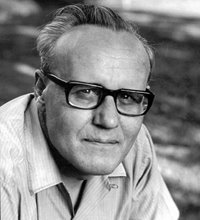

Born in Prince Rupert, BC in 1925, Alistair served in the Canadian Navy during World War II before graduating with a B.A. and M.A. from the Department of Geography at the University of British Columbia. He then embarked on a career of unusual diversity that took him across Canada.
From 1950 to 1962, Alistair personally produced most of the research studies central to the work of the Lower Mainland Regional Planning Board in British Columbia. He then led the long-range planning division of the City of Toronto Planning Board. Alistair’s next move took him into broader fields as a member of the Atlantic Development Board (later the Department of Regional Economic Expansion), where he worked on resource policies from 1965 to 1973.
In 1973, the first NDP government in Victoria claimed Alistair to head its Environmental and Land Use Secretariat, its central provincial planning program. Following government change in BC, he was seconded briefly to the Department of Fisheries in Ottawa.
In 1977, Alistair moved to his next major post as CEO of the Environmental Council of Alberta in Edmonton, where he stayed until 1988. From 1988 to 1990, he was Adviser to the National Conservation Strategy in Pakistan, having been appointed to this post by the International Union for the Conservation of Natural Resources. On returning to power in 1991, the NDP again called on Alistair, this time to head its new Crown Corporations Secretariat, which he did from 1991 to 1994.
Alistair was elected a Fellow of the Canadian Institute of Planners in 1993.
Less known was Alistair’s rapport with the First Nations people, built up in his childhood days in Prince Rupert. It provided him with the compassion and commitment to build the Burns Lake Native Development Corporation.
Those who knew Alistair and his work speak of him with great admiration. Jim Wilson, head of the Lower Mainland Regional Planning Board, recalls him as a man of massive and critical intelligence, a true scholar, and a skeptic blessed with a sardonic sense of humour. “Without his superb research, the Board would not have achieved the success it did.”
Bob Williams, Alistair’s political superior in British Columbia, says, “His work in the 1970s directing the Environment and Land Use Secretariat was, to my mind, the finest work of the day in integrated resource management. Indeed, the core process 20 years later was rooted in that early work. Also, the implementation of the Agricultural Land Reserve was all Alistair’s achievement.”
Any one of these achievements would crown any career. When Alistair Crerar died in Victoria in 1998, Canada lost a very distinguished planner and public servant.


Denis was a distinguished Planner and Municipal Administrator, being one of the founding members of what is now APPI in 1962, serving as President of the Institute of Public Administration of Canada in 1979-80 and receiving that organizations Vanier Medal for “outstanding contribution to public administration“ in 1987.
Growing up in England and serving with the Palestine Police during the Second World War, Denis Cole’s career in Canada was focused in Alberta where he served in many important roles for over 40 years. Starting in 1953, as Director of the fledgling Red Deer Regional Planning Commission, he saw it grow from four to 30 members, before becoming the City of Red Deer’s Commissioner for eight years. Denis was instrumental in establishing Red Deer’s municipal land bank, which has contributed significantly to the land use fabric of Red Deer and continues to this day. In 1971 Denis moved to Calgary as the Commissioner for Community Development. He became that City’s Chief Commissioner in 1973 – a role he served in through the tumultuous oil boom of the late 1970s and early 1980s. Upon retiring from the City in 1981 he continued to serve planning as a member of the prestigious Alberta Planning Board and as a private consultant and guest lecturer at Universities.
Denis Cole was a very principled man who believed public service was a privilege and not just a job. A man of immense integrity, he was respected not only by his staff whom he encouraged and protected professionally but by many of the politicians’ he worked with because of his all-encompassing approach to providing the decision makers with the tools and information to make the right decisions. Denis had the ability to provide a framework for positive political decisions on any issue, by impartially identifying realistic options along with a reasoned series of arguments as to the possible implications of choosing one strategy over another.
Denis engendered trust in all he dealt with, both through his personality, respect for all viewpoints and the careful consideration he gave to an issue before responding. When dealing with a contentious issue he always took the longer term view as to the impact of a decision in seven years as well as seven days. This consideration of longer term issues once led to a Developer declaring “I would gladly give him an airline ticket anywhere in the world – as long as it was a one way ticket”.
Throughout his life Denis was always interested in what was happening both in the City he lived in and the rest of the world. An avid reader, the book by his bedside when he passed away was “The Next One Hundred Years” by George Friedman. With Denis’s love of life he surely would have enjoyed being around to see if Mr. Friedman’s predictions came true.
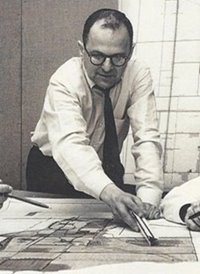

After graduating from Harvard University in 1949, where he studied city planning, Eli held various positions with the City of Chicago. He was with the Metro Toronto Planning Department from 1955 to 1966 and the Planning Commissioner between 1962 and 1966. He established a professional practice when he left Metro in 1966, and focused primarily on projects associated with housing, transportation, local government reorganization, and planning legislation. At the local level, Eli conducted studies that led to the establishment of planning departments in the regions of Ottawa-Carleton and Niagara. He participated in the Ottawa Central Area Study, and carried out projects for a number of municipalities in the Greater Toronto Area.
Eli’s work with the private sector included an appointment as planning coordinator for the development of the Erin Mills community in Mississauga where he worked closely with John Bousefield. Housing was a particularly important area of practice, and Eli was involved with several committees and task forces devoted to this issue. He served as Chairman of the Ontario Advisory Task Force on Housing Policy, 1972–1973. It was the report of this task force that led to the formation of the Ministry of Housing.
He was responsible for the formation of the Ontario Housing Action Program, and served as its first Director, 1973–1974. From 1981 to 1988, he was a Director of the City of Toronto’s Non-Profit Housing Corporation, and served as Chairman of the Cityhome Development Committee. From 1981 to 1987, Eli was Canada’s representative on the Bureau of the International Federation of Housing and Planning.
He was a consultant for numerous planning studies at higher levels of government, including the provinces of Alberta, New-Brunswick, Nova-Scotia and Ontario. His services were made the most of during the Royal Commission on Metropolitan Toronto in 1976, and the Ontario Economic Council’s study of Municipal Planning in Ontario in 1973. He also served as Chairman of the Ontario Planning Act Review Committee, 1975–1977, which led to the Planning Act of 1981. Eli taught at York University from 1969 to 1992, and subsequently held an appointment as Professor Emeritus in Environ mental Studies and Senior Scholar. He became a Fellow of the Canadian Institute of Planners in 1993, and served as Editor of the Institute’s journal, Plan Canada Eli was the ultimate pragmatist, acerbic, direct and incisive, who believed that the ability to filter experience was what made a good planner. He leaves a great legacy of planners who learned from him, and who are passing on some of the same knowledge and wisdom.
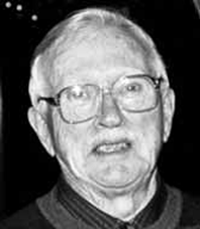

Born in 1921 in North Vancouver, Norm attended the University of Alberta after his war service, graduating in 1950 with a Bachelor’s degree in Agriculture and completing his Master’s degree in 1952. Norm began a distinguished 31-year career with the Edmonton District Planning Commission (which later became the Edmonton Regional Planning Commission) in 1953 as a planner working with rural municipalities, a rarity in those days since political acceptance of land use planning was tenuous. Recognizing that the principles of good land use planning could only be realized if the public and municipal councils saw that their long-term interests would be protected or reinforced, Norm built support for the conservation of agricultural land, regional transportation planning, the protection of the North Saskatchewan River valley system, and orderly growth of urban communities. He became the Executive Director in 1966.
Norm was active in the formative years of AACIP (first known as Alberta Association Town Planning Institute of Canada) between1956 and 1963. By the mid-1970s, rapid growth was having an impact on many Alberta municipalities. Norm worked with the Commission and the province to expand the staff and its services. Many new staff, often recent graduates, joined the commission over the next decade increasing the size of the operation four-fold. Norm was a key influence in the professional development of these young planners. He supported the Canadian Institute of Planners, worked with AACIP and encouraged his staff to be active. The experiences he provided by sending young planners out to work directly with councils and communities would be considered unique today. It is a testament to his ability as a mentor that many of the staff later became leaders in planning across Alberta and Canada.
Norm Giffen believed that planning was all about people: the land owners; the councils; the general public; and the professionals who work with all of them. The lessons of listening, understanding and being open to new ideas that he demonstrated have served well all who had the chance to work with him.
Over the decades, Norm’s ability to find areas of agreement and build on the strengths of all participants in the planning process led the planning commission through many controversial issues. Norm’s ability to build consensus and trust contributed greatly to the completion and adoption of the Edmonton Regional Plan, 1984. Those who worked in regional and municipal planning in Alberta during the formative 1950s and 1960s, and the expansive 1970s and 1980s consider Norm Giffen a friend and a true gentleman.
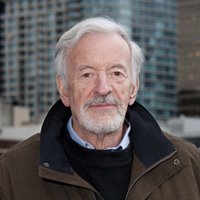

Ray Spaxman LL.D, ARIBA, MRTPI, FCIP, RPP, Hon AIBC, has over 50 years of professional practice as an architect and planner: Half that time as a municipal planner, and the other half in private practice.
Ray worked in England, in Coventry, Norwich and Liverpool until 1966 after which he was Deputy Director of Planning in Toronto until 1973, then Director of Planning, Subdivision Approving Officer, Chair and Member of the Urban Design Panel and Chair of the Development Permit Board for the City of Vancouver until 1989.
Since 1989, Ray Spaxman Consulting Ltd has been advising public and private clients on a wide variety of planning and urban design projects in Canada and abroad.
Ray is well past normal retirement age but is still working. He says he feels so fortunate that he is able to spend most of his time enjoying his chosen and most rewarding hobbies, architecture, urban design and planning.
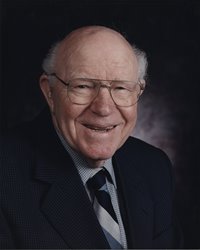

Jim was born in Kilsythe, Scotland. Despite the early loss of most of his hearing, he went on to graduate from the University of Glasgow in civil engineering and won a scholarship to study at M.I.T. Jim came to British Columbia to work for the BC Power Commission in the late 1940s. He then did advanced studies in urban planning at North Carolina, including an internship at the Tennessee Valley Authority.
He returned to BC in 1952 as the first Executive Director for the newly formed Lower Mainland Regional Planning Board, where his vision of ‘cities in a sea of green’ shaped the region’s urban planning for decades. In the 1960’s, Jim worked as a planner for BC Hydro, where his specific duties involved assessing the impact of major projects upon local communities and, more generally, to introduce specific themes of social welfare interest into Hydro planning and policies.
He then went east to teach planning at Brock University and the University of Waterloo. He wrote the frank and eloquent book People in the Way about helping resettle the people of the Arrow Lakes who were flooded out by the Columbia River project. Jim’s abiding affection for the region and its inhabitants is clear in his writing. Reviewing the book in 1972, Vancouver Sun columnist Allan Fotherhingham concluded, ‘A good book. A good man.’ He returned to BC in 1972 as Executive Director of BC Hydro under the new NDP government. In 1975, Jim re-entered higher education, spending his final working years as Professor of urban and rural planning in Geography at Simon Fraser University.
Jim lost his wife at about the time of his retirement, but continued active in various ways, teaching night school at Capilano College, authoring a book for Self Counsel Press, and consulting. He went on to enjoy life into his 90s and, during his last years, could sometimes be seen on his scooter in the main streets of West Vancouver, en route to a coffee shop, and flying his skull and crossbones flag to alert the traffic of his presence. The title of his book, and that flag as a statement about urban traffic, says it all.
Jim was universally described as a ‘true gentleman.’ On April 28, 2009, he died peacefully in his easy chair at a big window overlooking Burrard Inlet.


Peter J. Martin was born in Alton, Hampshire, England and educated at Churcher’s College. He was commissioned in the British Army in 1949. After army service, he qualified as a Chartered Surveyor and came to Canada in 1954 to work with Central Mortgage and Housing in the Maritimes as an appraiser. Following a post graduate course in Town and Regional Planning at the University of Toronto, he began his career with the Metropolitan Toronto Planning Board in 1956. During that period, he worked on the draft Metropolitan Official Plan and assisted many municipalities within the metropolitan area in the preparation of local plans.
Between 1960 and 1970, he worked with Candeub and Fleissig and Associates, a leading planning firm in the United States, becoming a Vice President of the firm in 1965. During this period, he headed up the mid-western office of the firm, based in Chicago, and subsequently worked in the head office in the New York area.
Returning to Ontario, he became a member of the firm Knox Martin Kretch Limited as Vice President and Director of Planning. He worked on the planning of Bramalea City Centre and surrounding development in 1971-72. He joined M.M. Dillon Limited in 1972, serving as Vice President and Director of Urban and Regional Planning and, later, as Senior Consultant in the Planning Division. In these capacities, he contributed to the planning of many municipalities and provided planning advice to many organizations and senior levels of government. During 1973-76, at the request of the Ontario Minister of Housing, Mr. Martin served as Executive Coordinator for the Ontario Housing Action Program which gave new impetus to the provision of housing in the Toronto Region, Ottawa, and elsewhere in Ontario.
His many friends in planning and related professions will remember Peter for the time, energy and dedication he gave to the well-being of the profession through his involvement in many professional organizations. Among his many professional affiliations, Peter was a President of the Canadian Institute of Planners, the Ontario Association of Land Economists, and the Association of Consulting Planners. In addition, he was the Vice President and representative of the Americas and the Caribbean of the Commonwealth Association of Planners. Peter had the vision and foresight to enhance the role of Canadian planners in the international field through this latter organization.
Peter served at various times as a lecturer in Urban and Regional Planning at Guelph and Waterloo Universities and at Atkinson College and Environmental Studies at York University.
Peter is remembered as one of the most energetic and dedicated planners and his work will continue in the future advancement of the professional associations he was involved with. He passed away in 1989.
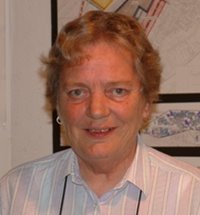

Jeanne Wolfe was known and loved for her tireless promotion of urban planning in Quebec, in Canada and the world over, for her commitment to human well-being in public policy and education, and for her generosity and her wit. Wolfe received a Bachelor’s degree in Geography from Bedford College, University of London, UK (1953-1956), a Master’s degree in Geography from the University of Western Ontario in London, Ontario (1956-1959) and a Master’s degree in Geography (Urban Planning) from McGill University in Montreal (1959-1961). Following her graduation from McGill, Wolfe practiced for over a decade as a professional planner, holding positions with both the City of Montreal and the Quebec Government’s Ministry of Municipal Affairs. In 1973, Wolfe joined the faculty of the McGill School of Urban Planning. While at McGill, she developed courses in the history, theory and practice of urban planning, taught numerous planning studio courses in collaboration with public and community partners, supervised graduate and undergraduate research, and served as mentor to numerous students and young colleagues. Wolfe was director of the McGill School of Urban Planning between 1988 and 1999. She was made Professor Emeritus in 2000.
Wolfe was an accomplished researcher and a prolific writer. Among her achievements are classic reviews of Canadian planning history, planning practice and housing policy, and articles documenting the evolution of Montreal’s governance structure. She did extensive research on urban and social issues in developing countries and more recently worked on a history of utopian communities across Canada.
In addition to teaching and conducting research, Wolfe remained active in municipal affairs. She participated in many organizations and commissions, both locally and nationally. For example, in addition to being a commissioner for both the 1986 Parizeau Commission on the Future of Municipalities and the 1987 commission for the Musée des beaux-arts de Montréal, she participated in the cooperative housing and environmental preservation movements and intervened in public debates.
For the last 25 years, Wolfe was deeply involved in planning research and practice in developing countries, particularly in the Caribbean basin and in Central America. She initiated and directed major international projects in Belize and in Trinidad & Tobago. She was a founding member of the Groupe interuniversitaire de Montréal, a Centre of Excellence of the Canadian International Development Agency. The group helped to establish post-secondary urban planning programs in local universities and to develop their research capacity. In recent years, she worked in China and in India, doing research and providing advice on local planning and governance structures, for instance with respect to solid waste management (in India) and metropolitan governance (in China).
Wolfe’s outstanding work earned her the Prix Jean-Claude La Haye of the Ordre des urbanistes du Québec (2004) and the President’s Award of the Canadian Institute of Planners (2007). She was inducted as a Member of the Order of Canada in May 2009 for “her contributions as a leading scholar and mentor in the field of urban planning in Canada and abroad.
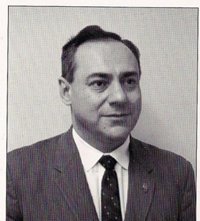

Murray Zides was born in Poland in 1920 and immigrated to New Brunswick with his parents at an early age. His early education was in Saint John, leading to a B.Sc. in Civil Engineering in 1944 from the University of New Brunswick in Fredericton. He attended both Yale and MIT, receiving certificates in Traffic Engineering and City and Regional Planning, respectively. While at University, he was also a member of the RCAF militia.
Murray was the Director of Planning for the Province of Saskatchewan prior to returning home to Saint John in 1956. He was appointed Director of the Town Planning Commission of Metropolitan Saint John. After the 1967 amalgamation of the municipalities that made up the Commission, he was appointed Director of Planning and, ultimately, Commissioner of Planning and Development, from which he retired in 1985.
During his 29-year career in Saint John, he was highly regarded as a conscientious team player in the modernization of Saint John. Major urban renewal projects, city centre improvements, a new Harbour Bridge, and improved highway access were all undertaken under Murray’s guiding hand. These developments are still seen as a credit to the City. He also supervised the development of the Comprehensive Community Plan, which was a major undertaking for the time. This plan was effectively the foundation for much of the development in future decades.
Murray was one of the planning pioneers in Atlantic Canada. Early meetings of planners in the Atlantic affiliate comprised typically less than a dozen people—Murray was always a key participant. He was always ready to contribute to planning endeavors in other jurisdictions. He was part of the early network of planners. His 1956 application to Saint John had professional references from Humphrey Carver and Wilber Smith.
Murray was an avid supporter of the Institute. He was President of the Town Planning Institute in 1960-61 and editor of the TPIC News for five years. He was elected a Fellow of CIP in 1989 when the CIP National Conference was held in Saint John. More recently, the CIP 1997 Award for Planning Excellence was given in his name at the conference in St. John’s, Newfoundland.
He passed away at the age of 77. He was remembered also for his leadership and scholarship in the Saint John Jewish community. He was true gentleman and a credit to the profession.


When Dusan (Danny) Makale first arrived in Alberta he worked for the Edmonton District Planning Commission from 1950 to 1956. After, Danny formed perhaps the first exclusively planning consulting firm in the Prairie Provinces. He maintained his private practice as an independent professional planning consultant to his death in 1985. Through his private practice, he made a major contribution to planning throughout Western Canada and the Arctic, not the least of which were the services he provided to many small municipalities before provincial or territorial governments had the manpower to serve them.
Danny’s long standing belief in the need for professionalism in planning is exemplified by his service to the Institute. He served on the National Council of the Town Planning Institute of Canada in the late 1960s, becoming President of the Town Planning Institute of Canada for 1971-72. He represented TPIC at the International Federation for Housing and Planning in Belgrade (1971) and the Commonwealth Association of Planners in New Delhi, 1973. Danny was also a dedicated participant in the Alberta Affiliate of CIP and the Community Planning Association of Canada.
He received recognition of his service to Canada through his professional work by the award of the Queen’s Silver Jubilee Medal in 1978.
Over his planning career of work of 35 years, people knew his intensity on behalf of his client, in pursuit of frivolity, and in the promotion of the profession. But Danny also had a quieter aspect to his intense nature—he studied art, history and philosophy throughout his life. He was a keenly intelligent, caring, sensitive, and well educated gentleman. He brought his personal traits and broadly studied understanding of the human condition together with his professional skills to always strive for the best result. He never accepted less than the best from anyone who worked for him, but he never expected more than they were capable of producing.
Danny was sometimes a controversial figure, and there were very few people who worked near him that did not disagree with his stance on one issue of another. In fact, Danny would want to be known where he stood and he spoke his view on issues, and respected those who, through their convictions, stood and opposed him. Heated discussions, thought provoking arguments, and expert planning testimony were forums that Danny frequently enjoyed and they demonstrated his intense commitment to planning and development in western Canada. His deep commitment to planning and the planning profession was something he fostered in people who worked for him, and, at the same time, was a central component that other planning professionals respected in him.
Danny’s background, training and experience before coming to Alberta were as rigorous as they were eclectic. He felt in Western Canada we had the freedom and privilege to voice our views and shape our future. Danny had fought for and lost his freedom in his homeland. So a mark of his life was his persistent use of his intellect, innovation, professional skills and training to help people (public and private) shape their future communities.
George Rich, Associate Professor University of Waterloo, said “Danny, though treating his professional work seriously, was never overburdened with the solemnness of the occasion and usually managed to enjoy what he was doing. He is an excellent example of the necessity for having a strong sense of humor to act as a safety valve when the immediate pressure of events tends to distort one’s judgement. He could keep things in perspective.”
Danny made an impact on many communities, the profession of planning, planning practice, and numerous individual planners.
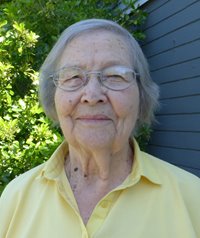

A native of British Columbia, Mary earned a B.A. (Honours) in Economics and Slavonic Studies at the University of British Columbia in 1949. She went on to complete her Masters in City and Regional Planning at the University of North Carolina, Chapel Hill in 1960.
Mary was one of the first women to join the Planning Institute of British Columbia. She was also the first woman to establish a planning practice in BC, where she worked principally with municipalities in the southern part of the province until about 1970. Also during this period, Mary introduced the idea of land use studies and planning to many BC First Nations. The Kamloops Band, for instance, was the first Band in Canada to authorize a land use study and subdivision plan, the Industrial Study K.l.R. No 1 1961. Kamloops was one of nine such Band governments for whom Mary’s firm consulted during the decade, ranging from small rural/recreational problems in Lytton to intensely urban concerns for the Musqueam in the Lower Mainland.
After 1970, Mary turned from the municipal focus to work on regional policy issues. This included research for the Prince Edward Island Royal Commission on Land Use and Land Ownership in 1972 and preparation of its report on Minimum Maintenance. She was a full-time Commissioner with the original BC Land Commission from 1973 to 1976, charged principally with establishing the boundaries of an Agricultural Land Reserve, administering their Act as well as the Greenbelt Act and advising governments on related issues affecting land use. She was also Land Policy Advisor to Bill Paterson, UNDP National Plan Project in Jamaica in 1972 and 1985.
Mary’s pioneering streak, independence and originality is hinted at in the variety of tasks undertaken at various points in her career, the locales in which she worked, and in her occasional published writing. The latter included “The Effects of the Property Tax on Urban Development,” published by the Urban Land Institute as Research Monograph No. 4, 1961; “Subdivision Casebook,” supported by PIBC and CMHC, 1963; “Ill fares the Land: Essay on the Work of the First BC Land Commission,” published by the Ministry of Urban Affairs, Canada, 1976; “Are You Ready, Oysters Dear?”, Report of the Peoples Food Commission, British Columbia Region (with Jack Warnock), 1979; and “L.D. Taylor: The Man Who Made Vancouver,” American Journal of Economics and Sociology, (forthcoming: expected 2016).
Mary was Vice-President of the Town Planning Institute of Canada in 1971-72, received the Queen’s Silver Jubilee Medal in 1978, and was elected a Fellow of the Canadian Institute of Planners in1983.
Beside an abiding interest in the historical land question, Mary continues to support parallel activisms in food security, civil liberties, and peace. She lives in Vancouver.
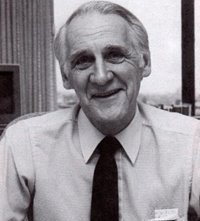

William Thomson was born in Hamilton, ON in August 1926. Before finishing high school, Bill joined the Army. After his discharge in 1945, Bill set about finishing high school, then on to McMaster University for a B.A. in Geography, then an M.A. in Geography and Urban Economics from the University of Indiana in 1953. He undertook post graduate studies in urban and regional geography and planning at the University of Chicago.
After graduation, Bill spent two years as Senior Planner with the Community Planning Branch of the Province of Ontario. This was followed by becoming Deputy Planning Director and, later, the Planning Director of the Burlington and Suburban Planning Board. In 1961, Bill became the first Planning Director, City of Kitchener and Secretary-Treasurer of the Kitchener Planning Board until becoming the first Commissioner of Planning and Development, Regional Municipality of Waterloo—a post he held until 1985 when he shifted to become the first Commissioner of Economic Development for the City of Kitchener.
In 1992, Bill entered the consulting sector as Partner, Thomson McGough Consultants Inc. and then as President, Bill Thomson Consultant Inc. During this period, Bill became a mediator for The Ontario Municipal Board. Other assignments included acting as facilitator/consultant for numerous restructuring and amalgamation projects.
Bill was Adjunct Professor for over ten years at the School of Urban and Regional Planning, University of Waterloo and a taught an economic development course for economic development officers there for over 20 years.
He was a member of the Economic Development Council of Ontario, the Association of Ontario Land Economists, Lambda Alpha Land Economics Society, and the American Society of Planning Officials. He was on many other industry and community groups such as the Midwestern Ontario Development Association, Region of Waterloo Airport Commission, Kitchener Industrial Coalition, Waterloo Ecological and Environmental Advisory Committee, Canada’s Technology Triangle, Walter Bean Grand River Community Trail Foundation, St Kossuth Bog Restoration Advisory Committee, Paul’s United College and many labour adjustment committees. He received numerous awards and certificates of appreciation throughout his career.
Bill has served the Canadian Institute of Planners, and its affiliates, well over the years. In 1961-62, he was Secretary/Treasurer of the Town Planning Institute of Canada, becoming its President for 1962-63. He was a founding member and Vice-President of the South Western Chapter of the Town Planning Institute of Canada, and later its President. He was Chairman of the Energy Conservation Planning Task Force for the Canadian Institute of Planners. Bill became a CIP Fellow in 1983.
Since retiring in 2008, Bill is enjoying traveling, the cottage, reading, writing, and grandchildren. Bill offers the following advice to young planners: don’t say no—you can make a difference if you have the courage to do things and learn from mistakes to make things better.


Wojciech Wronski was a native of Warsaw, Poland. He fought with the ‘Red Lion’s Brigade’ in the Second World War and in 1944 was awarded the Polish Military Cross.
After the war, he moved to London, UK, where he obtained his B. Sc. (Econ) and Masters of Town Planning from University College, London. He joined the London County Council where he worked on the first development plan for the city.
He came to Canada in 1955 to take up the position of Director of Long Range Planning with the City of Toronto. Later, he moved to become the Director of Planning for the Township (later City) of Etobicoke, a suburb of Toronto. He was appointed Commissioner of Planning for the Metropolitan Toronto and Secretary Treasurer of the Metro Toronto Planning Board. This body had considerable influence over planning in the municipalities surrounding the City of Toronto. In a 1968 report, he provided his vision for the area and championed urban growth beyond the borders of the central city, the development of employment centres throughout the urban region, increased density, infrastructure including rapid transit to support the growth, and the protection of the waterfront and ravines. In short, he identified most of the issues that dominated Toronto planning for more than half a century.
He was responsible for the Review of the Metro Toronto official Plan in 1972.
In 1974, he was appointed Assistant Deputy Minister, Community Planning where he was responsible for (among many other things) the review of the Planning Act. The first Planning Act in Ontario was passed in 1946 and it had never been comprehensively reviewed till then. Many municipalities were chafing under its administrative rules. A white paper was produced in 1979 and the legislation was enacted in 1983 after his retirement in 1981.
In 1982, he moved into private practice.
He became a Fellow of the Institute in 1983.
After his retirement, he became a Citizenship Judge.
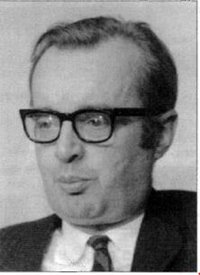

Harry Lash was educated at McGill University, and had worked in Alberta on provincial planning legislation, in the City of Montréal, and as the director of long range planning for the City of Toronto before becoming the first Director of Planning for the Greater Vancouver Regional District (now Metro Vancouver), serving from 1969 to 1975. Lash led the transformation of both the focus and the practice of regional planning in Greater Vancouver.
He recognized that the focus of planning for the region should be more on the creation of livable urban places within a metropolitan context, as compared to the focus the Lower Mainland Regional Planning Board, the predecessor planning agency. The LMRPB had covered a much larger, mostly rural, area in which the primary issues were conservation of resources such as agricultural land, land for industry and leisure and the limitation of settlement in areas at risk of flooding.
Lash’s practice of planning began with an open-ended dialogue with the people of the region about what was important to them; this produced the ambiguous but evocative concept of “livability.” As a professional leader, Lash fostered open and free-ranging discussion of ideas among his staff, leading to the development of important strategic concepts. One such concept was the concentration of suburban growth in regional town centres as higher density places to live, work and play which were to be connected to each other and to downtown by rapid transit. Forty years after Lash produced “The Livable Region 1976/1986,” these and other concepts are realities on the ground. More generally, it is clear that Greater Vancouver is a vastly different and better region as a result of his leadership and influence. At the time of Lash’s death in 1995, the Greater Vancouver Regional District renamed its library after him, honouring his belief that widely accessible knowledge is essential for the effective participation of elected representatives, professionals and the public in the planning process.
At the end of his career, Harry Lash summarized his views on planning in a book entitled “Planning in a Human Way” (Ministry of State for Urban Affairs, Ottawa, 1976). Lash’s legacy was summarized by Ralph Perkins in an article in Plan Canada (Vol. 45 No. 3 Autumn 2005) and in a tribute video prepared by the Greater Vancouver Regional District to be found at https://www.cip-icu.ca//bcove.me/f1db9aww.
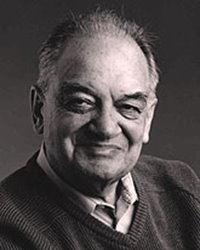

Len Gertler was a planner, administrator, author, and university professor, whose areas of study include planning, and public policy. Gertler was born in Montreal, Quebec, and was educated at Queen’s University, McGill University, and the University of Toronto.
Throughout his career he held a wide variety of positions. Len Gertler served as Director of the Edmonton District Planning Commission, and also held the position of Deputy Commissioner of Planning for the City of Toronto. In 1966 he became a professor at the University of Waterloo, establishing a new program in Urban and Regional Planning. He was also involved in establishing the University of Waterloo’s Faculty of Environmental Studies, and became the first Director of the School of Planning.
Gertler was the coordinator and author of the Niagara Escarpment Study in 1968 which led to the 1985 passage of the Niagara Escarpment Plan, which greatly influenced unesco ’s decision to name the escarpment a World Biosphere Reserve in 1990. His international work included assignments in Indonesia, Jamaica, India, Japan, and Uzbekistan. Gertler was a member and Vice-Chair of the Ontario Environmental Assessment Board, from 1990-2001.
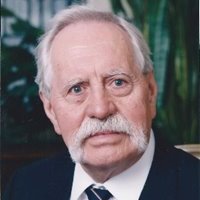

Col. Jack T.Allston, FCIP, former President of the Town Planning Institute of Canada (1968), a founding member of the Atlantic Planners Institute (1968), and a Fellow of the Canadian Institute of Planners (1979), passed away peacefully in St. John’s, Newfoundland, on April 1, 2007, at age 83.With Jack’s passing, a very special era in the history of planning in Newfoundland and Labrador also passed. Jack grew up in Colchester, England. He was a veteran of WWII with the Royal Engineers, which provided the groundwork for his future career as a professional planner in Canada.
In 1954, at the invitation of Town Planner Stan Pickett, Jack Allston, his wife, Patricia, and two young sons crossed the Atlantic by ship and arrived through the narrows of St. John’s. On his voyage to Newfoundland, he was joined by Ray Balston and both planners were met at dockside by Sir Brian Dunfield and Bishop Abraham. Jack would later remark fondly that “the law and the church came to greet them upon their arrival to Newfoundland.” Their arrival marked the introduction of town and land use planning in Newfoundland and Labrador. Col. Allston and Ray Balston were first employed as planners with the City of St. John’s in the old City Hall building on Duckworth Street. Shortly thereafter, Jack was transferred to the Government of Newfoundland and Labrador where he worked as Director of Planning and set up shop in the “Provincial Planning Office”.
In his long tenure as Director, a sense of military order was evident in Jack’s strategic approach to planning throughout the Province. Jack introduced the “Urban and Rural Planning Act” which laid out the legislative framework for planning for community and countryside planning. The legislation was strongly influenced by the British planning system. New planning concepts were introduced, such as: regional, municipal, and local area plans; protected road regulations for the Province’s highway system; a public hearing process; and a system of development appeals. Centralized control of the system came through the Provincial Planning Office (PPO) where community plans and “model development regulations” were developed and adopted for many of the over 300 communities throughout the Province. This brought a uniformity and consistency of approach to planning and development which previously did not exist. The PPO was a provincial model for the provision of planning services to small communities. Jack Allston’s strategic and methodical approach so impressed Premier Joseph R. Smallwood that he would involve the PPO in most major initiatives and would seek Jack’s advice on province-wide matters. Under Jack’s guidance, many a planner learned the art and practice of planning and spread this experience across Canada. It was often said that Jack came to Newfoundland and Labrador at the time when the Province needed a “visionary”. Jack was involved with the Royal Newfoundland Regiment of which he was a Commanding Officer from 1965-1968. In 1967, he initiated the Signal Hill National Historic Site Tattoo. He was Aide-de-camp to Governor General, the Right Honourable Roland Michener in the late 1960s and early 1970s. Jack retired from the PPO in 1986, but his interest in history and youth sustained his involvement in the Tattoo, the Newfoundland Regiment Museum, and the Newfoundland and Labrador Historic Sites Association. Jack was active in the church community. He served as a Eucharistic Minister and was an advisor for the Papal Visit in 1984.
Jack’s planning legacy lives on in the improvements to the quality of community life that Newfoundlanders and Labradorians enjoy today.
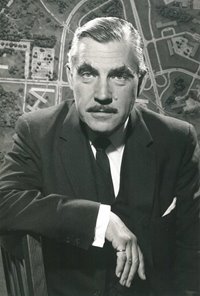

Eric W. Thrift FRAIC FCIP was an architect-planner who played a pivotal role in the development of community planning in Manitoba and across Canada in the post-war era. In 1953, he became the first Fellow of the Town Planning Institute of Canada (TPIC, now the Canadian Institute of Planners), for his role in re-establishing the Institute, after it had been in abeyance from 1931 to 1952 due to the effects of Depression and World War II. Only 40 when he was honoured by the Fellowship, Thrift went on to many other national and international achievements.
Eric was born in Winnipeg in 1912 and attended the University of Manitoba, where he studied architecture, receiving a B.Arch and the Gold Medal in 1935. In 1936 and 1937, he studied architecture and planning at the Massachusetts Institute of Technology, earning an M.Arch in 1938.
Upon his return to Winnipeg, Eric taught at the University of Manitoba and served as planning advisor to the provincial government, where he prepared the 1944 report on community planning for Manitoba’s Post-War Reconstruction Committee. He worked as a planning consultant for Yorkton SK and several Manitoba municipalities, leading the 1958 team that planned the new resource town, Thompson MB. In that same year, he prepared the campus master plan for the University of Manitoba.
From 1945-1960, Thrift was Director of the Metropolitan Planning Commission for the Winnipeg area. The Commission had no regulatory powers and depended on its staff’s powers of persuasion and professional expertise to encourage the urban, suburban and rural municipalities to adopt, co-ordinate and implement plans. Eric was a persistent advocate of the benefits of planning, writing numerous articles and giving hundreds of presentations to community stakeholders to build the consensus needed for metropolitan planning. One newspaper described him as: “…a ’soft-sell’ artist– a man who builds a careful and methodical case before recommending any major planning move to the municipal councils.” This “soft-sell” proved sufficiently effective that Manitoba established a metropolitan government for Winnipeg, with proper planning jurisdiction in 1960.
Eric left his native Manitoba for a larger challenge in 1960, when newly-elected Prime Minister John Diefenbaker appointed him as General Manager of the National Capital Commission. He implemented many of the components of Jacques Gréber’s landmark 1950 Plan for the National Capital, including several of the parks, parkways and the suburban greenbelt that grace the region today. He had less success in central Ottawa, where politically-connected developers defeated the efforts of the municipal and NCC planners to protect the view of Parliament Hill from the south.
In 1970, Thrift was appointed as Queen’s University’s campus planner and as a founding Professor in its new School of Urban and Regional Planning. He oversaw a dramatic physical expansion of the university over the next decade, adding a west campus, re-landscaping the main campus and creating a much-loved waterfront park. He taught metropolitan planning and community design to the first generation of Queen’s planners and was Acting Director of SURP in 1971 and 1972. Appointed Professor Emeritus in 1981, he continued to teach in the following years.
Eric Thrift was an energetic leader of provincial and national planning advocacy organizations throughout his career and a frequent contributor to Canadian and international conferences. He helped found the Community Planning Association of Canada (CPAC) in 1946 and its Manitoba branch in 1947. Eric was elected President of the Institute in both 1953-54 and 1961-62, the only person to lead the Institute on two occasions. Active in the American Society of Planning Officials (ASPO, now the American Planning Association), he was elected as ASPO’s president for 1964-65, the only Canadian to hold that post. He led the combined ASPO – CPAC Toronto conference in 1965, which was the largest gathering of planning officials held to that date.
For his contributions to planning and its allied professions, Eric Thrift was also elected as a Life Member of ASPO and a Fellow of the Royal Architectural Institute of Canada (1961). He passed away in Kingston in 1995 and is still fondly remembered by his colleagues and former students at Queen’s.
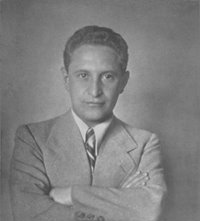

Dr. Eugene Faludi was an accomplished Hungarian born architect and planner trained in Italy. He spear-headed post-war planning in Canada, undertaking many of the first masterplans for communities across Ontario, including the 1943 Master Plan for Toronto and Environs.
As a child, Faludi was likely persuaded in his dream of becoming an architect and planner by the building explosion which occurred in his native Budapest to mark the 1000th anniversary of Hungarian settlement. As a boy, he witnessed the transformation of Budapest into a modern European Capital, including the opening of the second subway system in Europe.
The end of the First World War saw revolutionary turmoil in Hungary, forcing Faludi to flee his homeland, ultimately arriving in Rome where he completed his architectural studies. As a rising star in Italian architecture, Faludi was forced to explore new architectural expressions against the backdrop of the central fascist government. In 1935, he was awarded the “Chevalier de l’ordre de la couronne“ by King Leopold III of Belgium for the design of the Italian Pavilion at the Brussels World`s Fair.
At the brink of the Second World War, Faludi escaped to England under a ruse of designing an Italian school in London and ultimately arrived in Canada. His pedigree included masterplans of Padua, Brescia, San Pellegrino, Verona and Aprilia. As a former citizen of two countries with which Canada was currently at war, it is hard to imagine a more unlikely candidate to plan the future of what would evolve into Canada largest metropolitan area. Yet he was hired by the Toronto Planning Commission to undertake the first Master Plan for Toronto and Environs. This was only the second master plan in North America that went beyond municipal boundaries to take a regional approach to planning. The plan enabled Toronto to rebuild its aging transportation and housing infrastructure to accommodate the unprecedented wave of post-war immigration that was to follow. It included Canada`s first subway system, much of the regional highway system we see today, and a grand civic square at Bay and Queen Streets, which would eventually become Nathan Phillips Square.
Faludi went on to become one of the leading post war planners in Canada, undertaking official plans, urban renewal schemes, town expansions, new town plans for municipalities prmarily across Ontario. In the 1950`s, it was claimed that his firm Town Planning Consultants was the largest private planning office in North America.
Even after his retirement, he continued to remain active. In 1972, as part of a Federal Government initiative, he undertook the masterplan for a University Campus outside of Sao Paolo, Brazil. Dr. Faludi died in 1981, leaving behind legacy that guided land use planning in Ontario from its very beginnings to the respected profession that continues to shape the communities we live in today.
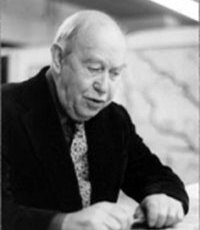

Harold is remembered in the history of Canada as the founder of the first university planning program in the country, at McGill University, but his legacy extends far beyond the campus, and even beyond the legion of luminaries he trained. He left his mark on the landscape of every province through his work in the preparation of municipal plans, on planning legislation, in urban design work, and in the creation of urban artistic installations.
Harold Spence-Sales was born to luxury in Lahore, India, educated in architecture at Victoria College, Wellington, New Zealand, and sent to be “finished” at the Architectural Association in London where he studied town planning. With fellow student John Bland, later to become Director of the School of Architecture at McGill, he established a very successful planning and architectural practice in London, meanwhile winning several competitions. During WWII he worked as a “designated person” seeking out and designing sites for factories for war materials, and later on, reconstruction schemes.
Lured to McGill in 1946, he joined John at the School of Architecture and immediately began setting up a post-graduate program in planning, one in which students registered in the department of their undergraduate degree, and did their studies under his tutelage. Studio work was at the heart of the course of studies, and usually focused on the current interests of Harold.
At this time it was assumed that faculty in professional fields would supplement their income by practice: indeed their meager salaries demanded it. Harold’s students were thus exposed to a whole range of very real projects: revision of the Planning Acts of Alberta and Newfoundland, setting up planning structures for cities such as Vancouver and Edmonton, municipal plans or central area redevelopment schemes for Prince Albert, Sudbury, Cornerbrook, Sept-Iles, the Town of Mount Royal, Charlottetown, Edmonton, Vancouver, Westmount, Beaconsfield and Montreal. Some of these were undertaken in collaboration with John. New towns were planned and built, including Preville (now in Saint-Lambert, Quebec) and Oromocto in New Brunswick.
Harold was passionate about aesthetics, both in the built environment and in landscape. His design methods started with learning the shape and feel of the land to be developed. He would become totally absorbed by the form, texture, colour, drainage patterns and vegetation, and long before ideas about “plan with nature” were articulated, he was teaching environmental sensitivity. His writings include How to Subdivide (1949), A Guide to Urban Dispersal (1956) and Beautifying Towns (1967).
For the McGill campus, he insisted on the planting of the linden trees along the front drive, having foreseen the death of the founder’s elms through dutch elm disease. He also organized the then random parking into tucked-away boxes, and secretly engineered the death of the ginko tree that masked the founders tomb and the magnificent façade of the Arts building. He was well known as a witty, provocative and sometimes outrageous habitué of the Faculty Cub, along with his friends Frank Scott, Jim Mallory, Kenneth Hare and others, and where a sketch of him by Arthur Lismer hangs in the second floor hallway.
In 1970 the circumstances of Harold’s life changed; he left McGill for British Columbia, with renowned artist, Mary Filer. Here his planning consultancy work continued to prosper, and his artistic work flourished. He started to focus more on new residential environments. He had always reminded his students that “suburbs are the cradle of civilization” and to be emphatic in their sound design. In association with the developer Genstar, he pioneered the design of ornamental storm-water retention ponds rather than heavy-duty engineering, both to save on costs and to embellish the landscape, while ensuring aquifer recharge.
His collaborative work with Mary resulted in many installations, often fusions of her brilliant glass work and his representations of urban and architectural form. One of these is in the lobby of Simon Fraser University’s downtown Vancouver campus. Recognition of his extraordinary talents led to him becoming a Fellow of the Canadian Institute of Planners (1978), an Emeritus Professor at McGill (1987), and an Honorary member of the British Columbia Association of Landscape Architects (1998). With Mary, he was awarded an Honorary degree from Simon Fraser (1991) for his contribution to the arts. McGill offers a scholarship in his name.
Generations of Canadian planners have been influenced by his original thought and imaginative style of planning. He died in Montreal in 2004.
(Adapted mostly from material from Jean Wolfe and William Perks)
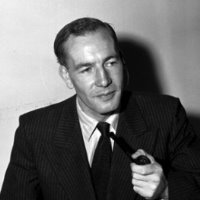

Noel Buckland Dant was Edmonton’s first full-time urban planner. Born in England in 1914, Dant came to Edmonton in 1949 and championed new ideas about how the city should grow. He graduated from Yale and Harvard and then went to work designing subway stations for the new Toronto Transit System and, in 1949, was hired as a Senior Town Planner for the Chicago Planning Commission. Dant established the practice of “neighbourhood unit” planning. And, borrowing a popular urban design feature from his native land, he implemented the city’s first dozen traffic circles, then known as roundabouts.
He introduced a “town planned” design approach with curvilinear street patterns leading to school and community league sites and green spaces at the heart of the neighbourhood. Crescents and cul-de-sacs replaced row-upon-row streets. Housing was a mixture of mostly single detached dwellings, with some rowhouses and low-rise apartments.
Dant left Canada to work as a regional planning officer in Accra, Ghana, between 1955 and 1960. He returned to Canada then and became the Provincial Planning Director with the Department of Municipal Affairs until his retirement in 1979. Among his accomplishments was the outer ring road, which he convinced Edmonton City Council to adopt in principle in 1965.
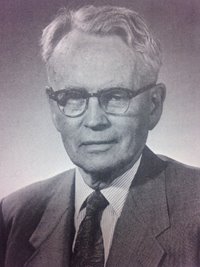

Arthur Edward Kennedy Bunnell was born in 1886 in Brant, ON. He graduated in civil engineering from the University of Toronto in 1907. His first planning job was to manage the Ottawa office of the Federal Plan Commission from 1913-15. He worked with Edward Bennett, Daniel Burnham’s partner on the 1909 Plan of Chicago. Bunnell was responsible for all the local surveys and the population projections. The FPC ‘s 1915 report was probably the first comprehensive plan for a Canadian metropolitan area.
Bunnell was one of the earliest professional planning consultants in Canada, partnering with the civil engineer Norman Wilson in 1923. They engaged in a wide variety of projects including the analysis of public utility operations, transit planning, traffic engineering, community planning, and municipal administration and finance. The firm later expanded to include the landscape architects Carl Borgstrom and Humphrey Carver FCIP, designing the road entrances to Hamilton and the landscape of the Queen Elizabeth Way. The firm thrived on land development through the 1920s, but closed as the depression advanced. Bunnell and Wilson continued to work together on infrastructure projects such as the 1937 plans for Toronto’s future subway.
In 1942-43, Bunnell was a member of the Advisory Technical Committee to the Toronto Planning Board preparing a master plan. Over time, Bunnell took over as project director and played a major role, in Toronto’s 1943 master plan, working with Eugene Faludi FCIP.
Bunnell joined the Ontario Department of Planning and Development in 1944 as a consultant and for many years was the Director of the Community Planning Branch, became Director of the Housing Branch, and a consultant to the Department of Municipal Affairs. Arthur was clearly at the heart of the creation of Metropolitan Toronto and was instrumental in drafting Ontario’s 1946 Planning Act and 1948 Housing Development Act. He also participated in an inter-ministerial task force that called for the formation of a provincial body with jurisdiction over all water resources. He retired from the Ontario government in 1962 after 18 years of distinguished service.
Arthur Bunnell served on the executive of the American Society of Planning Officials in the 1940s, was an active member of the Town Planning Institute of Canada and the Institute of Public Administration of Canada.
He was a founder and honorary member of the Community Planning Association of Canada, and was made an honorary member of the Canadian Society of Landscape Architects in 1961. He was made a Fellow of the Canadian Institute of Planners in 1973. A park is named after him in Atikokan, ON in honour of his planning impact on that community.
Arthur Bunnell died in 1973.


Abram Leland Stanley Nash, FCIP, P. Eng., OLS, MM, OBE (1894-1992)
Born in Haldimand County, Ontario in 1894, Stanley Nash worked as a surveyor in Brantford and received his Ontario Land Surveyor commission in 1915. Almost immediately, he joined the army and went overseas with the 40th Battery, Canadian Field Artillery. He served as a signaler in several battles on the WWI front, including Vimy Ridge, and was awarded the Military Medal for bravery.
After the war, he attended the University of Toronto, graduating in Civil Engineering in 1922. He continued work as a surveyor, doing preliminary work for the St. Lawrence Seaway and laying out subdivisions in Detroit. During the depression, he worked as County Engineer in Haldimand County, Ontario. During those years, he helped to reorganize the 54th Field Battery in Brantford so that by 1939 it was ready to be part of the Canadian Army’s First Division. As Major, he was second in command of the 1st Field Regiment, serving overseas in England and France. In Canada, as Colonel, he directed the army training centres in Winnipeg, Petawawa, and Camp Shilo—receiving the Order of the British Empire for his wartime work.
In 1945, he brought his surveying and engineering experience to the new Community Planning Branch of the Department of Planning and Development in Toronto where, during the 1950s and 60s, he was largely responsible for drafting and implementing Ontario’s Planning Act. He recommended legislative changes and modified procedures to accommodate the ever increasing urban development across Ontario. He understood the problems facing municipalities and sought greater appreciation and knowledge for those with professional planning responsibilities.
He was President of the Town Planning Institute of Canada and on the Board of Directors of the American Society of Planning Officials. He was an Honorary Vice-President of the Ontario Land Surveyors. Colonel Nash was elected as a Fellow of the Town Planning Institute of Canada in 1969.
A man of warmth and understanding, he brought a great sense of dedication to the planning profession. He was always ready to listen and regarded his role in planning as a great mission. Throughout his busy professional life, Mr. Nash was a faithful member of a series of churches, acting as steward, trustee, and board chair.
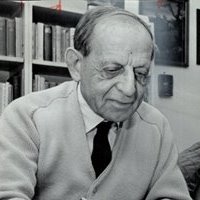

Hans Blumenfeld was born in Osnabruck, Germany in 1892 and grew up in Hamburg. Although he was expected to follow the family banking tradition, Hans wanted to be an architect and worked as a carpenter’s apprentice. In 1914, he enlisted in the German army in World War I and this experiences confirmed his lifetime activist leanings. After, Hans continued his studies, finishing his master’s thesis, which had kindled his interest in the relationship between the form and function of cities. He describes the period from 1921 to 1930 as becoming a journeyman architect. He entered the US through Ellis Island in 1924 and worked as a draftsman in New York and Baltimore and, finally as a designer in Los Angeles, then worked back in Hamburg and Vienna.
Has joined the Russian State Planning Institute in1930. Here he embarked on his first real city planning—general plans of Vladimir and Kirov. Blumenfeld left the USSR in 1937, returning to the US and getting a job as a research assistant for the Philadelphia Housing Association and eventually joining Philadelphia’s City Planning Commission in 1945. His work in Philadelphia was interrupted by a short term return to Germany in 1949, during which he advised the United States Military government about future German city planning. The US State Department refused to renew his passport during the McCarthy era and he came to Canada in 1955 as assistant director of the Metropolitan Toronto Planning Board where he was instrumental in shaping Toronto and its hinterland through the 1959 Official Plan for land use, housing, and transportation.
He resigned at the mandatory retirement age of 70 and became a private consultant working for clients like the cities of Montréal, Toronto, and Vancouver, and for 14 years with the National Capital Commission in Ottawa. Hans became a professor at the University of Toronto, where he taught well into his eighties, and at the University of Montreal. He was the author of numerous acclaimed articles and books, including The Modern Metropolis (1967) and Metropolis and Beyond (1979). His most significant contribution was his vision of the ‘metropolis’ as a new urban organism whose unique scale and structure require diagnosis and treatment.
Acknowledged as having an extraordinary intellectual range, Professor Blumenfeld was a leading figure in 20th century urban and regional planning. He was a recipient of the American Institute of Planners’ Distinguished Service Award and received honorary doctorates from the University of Montreal, University of Waterloo, and Technical University of Nova Scotia. In 1978, he received the Order of Canada. His autobiography, Life Begins at 65: The Entirely Candid Autobiography of a Drifter, was published in 1986. In it he talks of planning: “I do not know of a better recipe for a happy life. I consider myself highly privileged to be one of the fortunate few able to follow it.”
At the age of 90, he was the chairman of the Toronto Coalition for Peace. Hans passed away at Toronto in 1988.
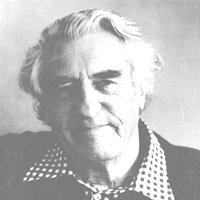

Humphrey Stephen Mumford Carver—planner, architect, urban philosopher, author—was born in Birmingham, England in 1902. After graduating from the Architectural Association’s School of Architecture in Bedford Square, London, Humphrey ‘couldn’t imagine myself pursuing a prospective rich client. I had gone into architecture for a social purpose and now I could see no way out of the barriers that seemed to be enclosing me.’ His answer was to go to Canada in 1930.
His first job (‘I had never heard of the term ‘landscape architect’ but it expressed exactly what I had been looking for.’) was with the firm Wilson, Bunnell, and Borgstrom. The firm had been very successful laying out subdivisions in growing cities, but ‘through the decades of the 1930s I worked in partnership with Carl Borgstrom, sharing what little income we could scratch from the austere years of the depression.’ Humphrey notes, then, that ‘he could understand planning ideas and translate them.’ He became inspired by Thomas Adam’s work for the New York Regional Planning Association.
Acknowledging he had a vein of optimism, Carver was a strong advocate of a public-housing policy, active in the League for Social Reconstruction, and writing articles in the Canadian Forum, Saturday Night, and in architectural and welfare journals. This led into teaching for several years at the University of Toronto’s School of Architecture and then at the School of Social Work;
He organized the influential 1939 Housing Conference and was involved in much of the institutional development in community planning and housing in Canada after 1940. He was associated with Regent Park North in Toronto—Canada’s idealistic and first public housing project, an outcome of a citizens’ movement. He chaired the Research Committee of the Canada Mortgage and Housing Corporation from 1948 to 1955) and its Advisory Group from1955 to 1967. In his 1962 book Cities in the Suburbs, Carver advocated that the planning of suburbs be integrated with the wider social community. Under Carver’s leadership of the CMHC Advisory Group, Canada’s research and programs in housing policy, housing design and community planning attained an international reputation for innovation and progressive development standards. He went to Australia to help set up their Institute of Urban Studies. He was President of CIP 1963-64.
Humphrey’s autobiography, Compassionate Landscape: Places and People in a Man’s Life, was published in 1978. A review in British Town Planning Review describes it as “a sympathetic, understanding and elegant study of a lifetime’s experience—first in England but for the most part in Canada-of an architect and landscape architect who, through compassion and experience, became the designer of housing and urban policies. At the one end, one is left with the picture of the author as one essentially civilized, hardened in his resolve by adversity and by suffering, of others and his own; a man of stature and of understanding, and achievement too.”
The book contains a great poem called ‘A House is a Place for Flying Apart.’ In the last paragraph of his autobiography, Humphrey says ‘To be free is to express yourself through taking some part in shaping the social and physical environment within which you live.’
There is a Humphrey Carver Archive at the Canadian Centre for Architecture in Montreal. He died at Ottawa in 1995.
Becoming a Fellow
To become a Fellow, an individual must be nominated by a professional (MCIP®/FCIP) or retired member of CIP in good standing and adhere to the nomination criteria. The nomination is then brought before the Honours and Awards Jury, which makes a recommendation to the CIP Board of Directors.
For nominations guidelines, visit CIP’s Honours page.